
CONFIRMED
MINUTES
OF THE
Ordinary Meeting of Council
12 December 2019
OUR VISION
"A thriving and friendly community that recognises our history and embraces cultural diversity and economic opportunity, whilst nurturing our natural and built environment."
OUR MISSION
“To deliver affordable and quality Local Government services.”
CORE VALUES OF THE SHIRE
The core values that underpin the achievement of the
mission will be based on a strong customer service
focus and a positive attitude:
Communication
Integrity
Respect
Innovation
Transparency
Courtesy
DISCLAIMER
The purpose of Council Meetings is to discuss, and where possible, make resolutions about items appearing on the agenda. Whilst Council has the power to resolve such items and may in fact, appear to have done so at the meeting, no person should rely on or act on the basis of such decision or on any advice or information provided by a Member or Officer, or on the content of any discussion occurring, during the course of the meeting.
Persons should be aware that the provisions in section 5.25 of the Local Government Act 1995 establish procedures for revocation or rescission of a Council decision. No person should rely on the decisions made by Council until formal advice of the Council decision is received by that person. The Shire of Broome expressly disclaims liability for any loss or damage suffered by any person as a result of relying on or acting on the basis of any resolution of Council, or any advice or information provided by a Member or Officer, or the content of any discussion occurring, during the course of the Council meeting.
Should you require this document in an alternative format please contact us.
Minutes – Ordinary Meeting of Council 12 December 2019 Page 1 of 3
|
Councillor Attendance Register |
||||||||||
|
Councillor |
Cr H Tracey |
Cr D Male |
Cr E Foy |
Cr P Matsumoto |
Cr C Mitchell |
Cr B Rudeforth |
Cr M Fairborn |
Cr W Fryer |
Cr C Marriott |
|
|
2018 |
22 November |
|
LOA |
A |
|
LOA |
|
LOA |
|
|
|
2018 |
13 December |
|
LOA |
A |
|
|
|
LOA |
|
|
|
2019 |
28 February |
|
|
LOA |
|
|
|
LOA |
R |
|
|
2019 |
28 March |
|
|
|
LOA |
|
|
|
R |
|
|
2019 |
18 April |
|
|
|
|
|
A |
|
R |
A |
|
2019 |
30 May (held 4 June) |
|
|
LOA |
|
|
|
|
R |
LOA |
|
2019 |
27 June |
|
|
LOA |
|
|
|
|
R |
|
|
2019 |
25 July |
|
|
A |
|
|
|
|
R |
|
|
2019 |
29 August |
|
|
|
LOA |
|
|
|
R |
|
|
2019 |
26 September |
|
|
|
|
|
|
A |
R |
|
|
2019 |
17 October |
|
|
A |
|
|
|
LOA |
R |
R |
|
Post 2019 Local Government Elections |
||||||||||
|
Councillor |
Cr H Tracey |
Cr D Male |
Cr E Foy |
Cr P Matsumoto |
Cr C Mitchell |
Cr B Rudeforth |
Cr P Taylor |
Cr N Wevers |
Cr F West |
|
|
2019 |
21 November |
|
|
|
LOA |
|
|
LOA |
|
|
|
2019 |
12 December |
|
|
LOA |
|
|
|
|
|
|
|
· LOA (Leave of Absence) |
· NA (Non Attendance) |
|
· A (Apologies) |
· R (Resignation) |
2.25. Disqualification for failure to attend meetings
(1) A council may, by resolution, grant leave of absence, to a member.
(2) Leave is not to be granted to a member in respect of more than 6 consecutive ordinary meetings of the council without the approval of the Minister, unless all of the meetings are within a period of 3 months.
(3A) Leave is not to be granted in respect of —
(a) a meeting that has concluded; or
(b) the part of a meeting before the granting of leave.
(3) The granting of the leave, or refusal to grant the leave and reasons for that refusal, is to be recorded in the minutes of the meeting.
(4) A member who is absent, without obtaining leave of the council, throughout 3 consecutive ordinary meetings of the council is disqualified from continuing his or her membership of the council, unless all of the meetings are within a 2 month period.
(5A) If a council holds 3 or more ordinary meetings within a 2 month period, and a member is absent without leave throughout each of those meetings, the member is disqualified if he or she is absent without leave throughout the ordinary meeting of the council immediately following the end of that period.
(5) The non‑attendance of a member at the time and place appointed for an ordinary meeting of the council does not constitute absence from an ordinary meeting of the council —
(a) if no meeting of the council at which a quorum is present is actually held on that day; or
(b) if the non‑attendance occurs —
(i) while the member has ceased to act as a member after written notice has been given to the member under section 2.27(3) and before written notice has been given to the member under section 2.27(5); or
(ii) while proceedings in connection with the disqualification of the member have been commenced and are pending; or
(iiia) while the member is suspended under section 5.117(1)(a)(iv); or
(iii) while the election of the member is disputed and proceedings relating to the disputed election have been commenced and are pending.
(6) A member who before the commencement of the Local Government Amendment Act 2009 section 5 1 was granted leave during an ordinary meeting of the council from which the member was absent is to be taken to have first obtained leave for the remainder of that meeting.
[Section 2.25 amended by No. 49 of 2004 s. 19(1); No. 17 of 2009 s. 5.]
Minutes – Ordinary Meeting of Council 12 December 2019 Page 1 of 3
SHIRE OF BROOME
Ordinary Meeting of Council
Thursday 12 December 2019
INDEX – Minutes
1. Official Opening and Attendance
2. Declarations Of Financial Interest / Impartiality
4. Applications for Leave of Absence
6. Announcements By President Without Discussion
8. Matters For Which The Meeting May Be Closed
9.1.1 RFT 19/13 - Supply, Installation and Operation of a Takeaway Alcohol Management System
9.2.1 Cable Beach Polo 2020 Funding Request
9.2.2 RFT19/15 TOWN BEACH WATER PARK
9.2.3 BROOME BOWLING CLUB CARETAKERS
9.2.4 RFQ19-95 - CHINATOWN REVITALISATION PROJECT STAGE TWO
9.4.1 RFQ19/68 - SUPPLY AND DELIVERY OF ONE WHEEL LOADER CCF CLASS 4 AND ONE GRADER CCF CLASS 15
9.4.2 STAGE 2 - CHINATOWN REVITALISATION PROJECT
9.4.3 INTEGRATED PLANNING AND REPORTING FRAMEWORK - CORPORATE BUSINESS PLAN REVIEW
9.4.4 AMENDMENT TO 2019/20 FEES AND CHARGES - SPORTS FIELD LIGHTING FEES
9.4.7 RENEWED AND UNDER REVIEW COUNCIL POLICIES
9.4.8 SISTER CITY RELATIONSHIPS POLICY & TAIJI DELEGATION 2020
9.4.9 ELECTED MEMBER COMMUNICATIONS AND SOCIAL MEDIA POLICY.
9.4.10 MONTHLY PAYMENT LISTING - NOVEMBER 2019
12. Business of an Urgent Nature
13. Questions By Members Of Which Due Notice Has Been Given
14. Matters Behind Closed Doors
Minutes – Ordinary Meeting of Council 12 December 2019 Page 1 of 3
NOTICE OF MEETING
Dear Council Member,
The next Ordinary Meeting of the Shire of Broome will be held on Thursday, 12 December 2019 in the Council Chambers, corner Weld and Haas Streets, Broome, commencing at 5:00pm.
Regards,
![]()
S MASTROLEMBO
Chief Executive Officer
06/12/2019
MINUTES OF THE Ordinary Meeting of Council OF THE SHIRE OF BROOME,
HELD IN THE Council Chambers, corner Weld and Haas Streets, Broome, ON Thursday 12 December 2019, COMMENCING AT 5:00pm.
The Chairman welcomed Councillors, Officers and members of the public and declared the meeting open at 5:23pm.
|
ATTENDANCE |
|
|
|
|
|
|
|
Councillor: |
Cr H Tracey |
Shire President |
|
|
Cr D Male |
Deputy Shire President |
|
|
Cr P Matsumoto |
|
|
|
Cr C Mitchell |
|
|
|
Cr B Rudeforth |
|
|
|
Cr P Taylor |
|
|
|
Cr F West |
|
|
|
Cr N Wevers |
|
|
|
||
|
Apologies: |
Nil |
|
|
|
||
|
Leave of Absence: |
Cr E Foy |
(Approved at Item 4) |
|
|
||
|
Officers: |
Mr S Mastrolembo |
Chief Executive Officer |
|
|
Mr J Watt |
Director Corporate Services |
|
|
Mr A Graffen |
Director Infrastructure |
|
|
Mr D Kennedy |
Manager Governance, Strategy and Risk |
|
|
Ms K Wood |
Manager Planning and Building |
|
|
Mr C Zepnick |
Manager Sport and Recreation |
|
|
Mr M Davis |
Manager Community and Economic Development |
|
|
Ms L Levi |
Senior Administration and Governance Office |
|
|
||
|
Public Gallery: |
|
|
|
|
Brendan Renkin |
|
|
|
Wade Freeman |
|
|
|
M Teoh |
|
|
|
L Teoh |
|
|
|
Jan Lewis |
|
|
|
|
|
|
FINANCIAL INTEREST |
|||
|
Councillor |
Item No |
Item |
Nature of Interest |
|
Cr H Tracey |
9.2.2 |
Town Beach Waterpark |
A company of which I am a Director is tendering for this project |
|
Cr H Tracey |
9.2.4 |
RFQ19-95 – Chinatown Revitalisation Project Stage Two. |
Proponent is a tenant of a property owned by a company of which I am a Director |
|
IMPARTIALITY |
|||
|
Councillor |
Item No |
Item |
Nature of Interest |
|
Nil |
|||
Minutes – Ordinary Meeting of Council 12 December 2019 Page 1 of 3
The following questions were asked by Jan Lewis.
Questions One
Who from the Shire attends the Yawuru Park Council (YPC) joint management meetings?
Response provided by the CEO:
The Shire President, the CEO and the Director of Development and Community Services. are the three appointed delegates to that working group through the Terms of Reference. Any decision made by the YPC is tabled to Council as the Shire representatives do not have delegated authority.
Question Two:
Where do these representatives get their mandate from if there has been no community consultation about the issued to be discussed?
Question was taken on notice. Response will be tabled at a future meeting.
Question Three:
Why are the minutes of the YPC meetings not published on the Shire’s or any other website?
Response provided by the CEO
The minutes of the YPC are submitted to the Council via an Agenda item unless they are confidential. Meeting schedule is known in advance and minutes presented to the Council in the months following
Question Four:
How does a member of the public gets access to these meetings? I wrote a letter to the Joint Management Committee 2 or 3 years ago to be tabled by DPAW and never received a reply. I don’t event know if it was tabled.
Response provided by the Shire President:
The meetings are not open to the public. The Shire is happy to assist with the tabling of items at a YPC meeting if details can be provided.
The following questions were received by Brendan Renkin prior to the meeting:
Question One
I refer to item 9.4.3 on the agenda. The Corporate Business Plan review includes a recommendation that a new action be added 4.4.1.3 Develop Renewable Energy Strategy. Whilst I commend the Shire on this action, can you explain on what basis this item has been selected –if there has been any public consultation, and why in the draft CBP the work to create a plan will begin in 4 years’ time, and whether this proposed action precludes the Shire from taking action sooner?
Response provided by Director of Infrastructure:
In 2016 Council adopted the State of Environment (SOE) Report and Environmental Management Plan (EMP) as Informing Strategies under the Integrated Planning and Reporting Framework. The strategic direction provided in these documents highlights ‘Gaps’ which include limited use of energy efficient appliances, fixtures or fittings in Council buildings, limited use of alternative energy sources for Shire’s built assets and little monitoring of energy use in Shire buildings. Community consultation for the SOE Report commenced in 2010 as part of the Environmental Management Strategy. Acacia Springs Environmental (ASE) designed a four-stage process which included staff and community consultation, multi-criteria analysis of the issues raised in the consultation and identification of actions to help address the relevant issues. The community consultation included an online survey which received 87 responses from members of the public. Much of this previous work has been incorporated into the EMP.
The Strategic direction highlighted in the SOE and EMP documents was that energy use is optimised through design, conservation, efficiency and using renewable energy sources. It also highlighted a need to improve the energy-use efficiency and sustainable design for assets and programs during planning and procurement of new assets and as part of replacement/maintenance schedules. To deliver on this direction the Shire of Broome requires a clear understanding of the technical and financial limitations of implementing renewable energy technologies to provide power to its range of assets and the Community. Developing a Renewable Energy Strategy will provide background information to assist in forming policy and investment decisions based on the technical and financial viability of renewable energy solutions. This Strategy intends to provide a clear pathway to reduce carbon emissions and lower energy consumption for the Shire of Broome and public consultation would be a critical part of this process.
The Corporate Business Plan (CBP) is an internal business planning tool that translates council priorities into operations within the resources available. Available resources were identified in the 4th year of the plan to fund and resource action 4.4.1.3 as part of the review just completed. Council have a full review of the CBP in 2020 as part of the legislated review of Council’s Strategic Community Plan (SCP). The 2020 review of the SCP and CBP will include a comprehensive community engagement process. Council’s intent was that a community survey be undertaken as part of the engagement process with the results used to guide prioritisation of actions based on community expectations and aspirations. It should be noted, that Council has an existing action to Implement the Local Environmental Management Plan within resource capabilities and the Shire will continue to do so in the immediate future.
I refer to the answer provided to my question at the November 2019 OMC in which the Shire President pointed to the recommendations in the Broome Growth Plan as the basis for the Shire President publicly stating the Shire of Broome supports the proposed Marine Supply Base. On searching through the Broome Growth Plan I was unable to locate any recommendations. The only mention of a marine supply base is in Appendix 2, which clearly states “this information is living and a sample of concepts raised; inclusion or omission does not imply anything in relation to the status of the concept”. Can the Shire indicate where the recommendations, including any relating to a marine supply base, are?
Response provided by the Shire President:
The Growth Plan presents a vision for the economic and social development of Broome as a regional centre. It identifies the scale and importance of the key challenges and opportunities that a future Broome will face and outlines a way of ‘doing business’ that not only enables investment and growth, but does so in a way which is reflective of and celebrates all that makes Broome special: its heritage, its environment and its people.
The Growth Plan builds on a significant body of evidence and strategy development and fits within the overarching framework for State and regional planning. Logistics issues are prefaced in a number of key reference documents including the “Unlocking the Door” report on the feasibility of Broome as a Commercial and Logistics Hub for the Kimberley Region.
The plan also recognises that as a regional centre, Broome’s development must be reflective of broader aspirations and strategies for the economic future of the Kimberley and Western Australia.
The overall aim of the Growth Plan is to develop Broome into a sustainable and inclusive economy where all can participate, with sufficient opportunity to attract investment and skilled employees to the region. Activating the traded economy is one of a number of growth initiatives which have been highlighted to be targeted in the short to medium term.
The plan articulates the following infrastructure opportunities in order to activate the traded economy (mineral and energy) including:
Short Term
- Transport logistics blueprint
- Bulk commodity export Port study
Medium Term
- Investment in building air and sea trade links to growing markets
- Extend port facilities
Long Term Outcomes
- Competent logistics to enable exploration, project development and project operations
- Extended port facilities and improvements are also referenced in order the activate the traded economy in terms of agriculture opportunities.
Question Three:
Can the Shire explain the nature of the relationship between the Shire of Broome and Broome Futures Alliance Ltd? Is the Shire President appointed as a director to the board of that company in his capacity as a Shire President?
Response provided by the CEO:
The Broome Growth Plan is a plan for the development of Broome which was developed according to a similar process overseen by the Broome Growth Plan Partners and executed under the Western Australian Government’s Regional Centre’s Development Plan. The Broome Growth Planning Partnership (GPP) was comprised of the Shire of Broome, Nyamba Buru Yawuru, Kimberley Development Commission, LandCorp, and the then Department of Planning and Department of Regional Development (now DPIRD).
In September 2017, the GPP became aware that Broome Future Limited (now Broome Future Alliance) had expressed an interest in altering its corporate structure so that it could become the implementation body for the Growth Plan. Therefore, concurrently with the finalisation of the Growth Plan, the Growth Plan Project Control Group (PCG) and GPP had been working with Broome Future in relation to it becoming the implementation body for the Growth Plan.
On the 25 June 2018 Council resolved to support Broome Future Limited becoming the implementation body for the Broome Growth Plan in accordance with the endorsed Governance Charter. This charter reflected the previous intent of the Broome Growth Plan Partnership having a board comprised of 4 prescribed members being the President of the Shire of Broome, the Chief Executive Officer of Nyamba Buru Yawuru, the Director Regional Planning and project Delivery of the Kimberley Development Commission and the President of the Broome Chamber of Commerce and Industry.
|
Moved: Cr C Mitchell Seconded: Cr D Male That Cr E Foy be granted a leave of absence from Councillor duties from 12 December 2019 through to and inclusive of 16 December 2019. |
|
Moved: Cr C Mitchell Seconded: Cr B Rudeforth That the Minutes of the Ordinary Meeting of Council held on 21 November 2019, as published and circulated, be confirmed as a true and accurate record of that meeting. |
Nil.
7. Petitions / DEPUTATIONS
Nil.
The Chief Executive Officer advises that there are matters for discussion on the agenda for which the meeting may be closed, in accordance with section 5.23(2) of the Local Government Act 1995.
|
Moved: Cr C Mitchell Seconded: Cr P Taylor That the following Agenda items be considered under 14. Matters Behind Closed Doors, in accordance with section 5.23(2) of the Local Government Act 1995, as specified: 9.1.1 RFT 19/13 - Supply, Installation and Operation of a Takeaway Alcohol Management System Item 9.1.1 and any attachments are confidential in accordance with section 5.23(2) of the Local Government Act 1995 section 5.23(2)((e)(ii)) as it contains “a matter that if disclosed, would reveal information that has a commercial value to a person, where the information is held by, or is about, a person other than the local government”. 9.2.1 Cable Beach Polo 2020 Funding Request Item 9.2.1 and any attachments are confidential in accordance with section 5.23(2) of the Local Government Act 1995 section 5.23(2)((e)(ii)) as it contains “a matter that if disclosed, would reveal information that has a commercial value to a person, where the information is held by, or is about, a person other than the local government”, and section 5.23(2)((e)(iii)) as it contains “a matter that if disclosed, would reveal information about the business, professional, commercial or financial affairs of a person, where the information is held by, or is about, a person other than the local government”. 9.4.1 RFQ19/68 - SUPPLY AND DELIVERY OF ONE WHEEL LOADER CCF CLASS 4 AND ONE GRADER CCF CLASS 15 Item 9.4.1 and any attachments are confidential in accordance with section 5.23(2) of the Local Government Act 1995 section 5.23(2)(c) as it contains “a contract entered into, or which may be entered into, by the local government and which relates to a matter to be discussed at the meeting”. 9.2.2 RFT19/15 TOWN BEACH WATER PARK Item 9.2.2 and any attachments are confidential in accordance with section 5.23(2) of the Local Government Act 1995 section 5.23(2)(c) as it contains “a contract entered into, or which may be entered into, by the local government and which relates to a matter to be discussed at the meeting”. 9.2.4 RFQ19-95 - CHINATOWN REVITALISATION PROJECT STAGE TWO Item 9.2.4 and any attachments are confidential in accordance with section 5.23(2) of the Local Government Act 1995 section 5.23(2)((e)(iii)) as it contains “a matter that if disclosed, would reveal information about the business, professional, commercial or financial affairs of a person, where the information is held by, or is about, a person other than the local government”.
|
9.1

PRIORITY STATEMENT
Embracing our cultural diversity and the relationship between our unique heritage and people, we aim to work in partnership with the community to provide relevant, quality services and infrastructure that meet the needs and aspirations of our community and those visiting and doing business in our region.
Supporting and contributing to the well-being and safety of our community is paramount, as is our focus on community engagement and participation.
Council aims to build safe, strong and resilient communities with access to services, infrastructure and opportunities that will result in an increase in active civic participation, a reduction in anti-social behaviour and improved social cohesion.
Minutes – Ordinary Meeting of Council 12 December 2019 Page 1 of 3
There are no reports in this section.
9.2

PRIORITY STATEMENT
The Shire of Broome has an abundance of unique natural features, coastal attractions, significant streetscapes, historic precincts and a mix of old and new urban developments.
Our aim is for all communities and settled areas, including the Broome Township, to be a place where the natural environment, on which life depends, is maintained, whilst at the same time the built environment contributes to the economy and a quality lifestyle for all.
Preserving the Shire’s natural environment is a critical community outcome. Council will put into place strategies that nurture and improve the Shire’s unique environment and biodiversity.
The Shire will work in partnership with the community and other agencies to ensure responsible and accountable management of both the natural and build environments is achieved in the short term and for future generations.
Minutes – Ordinary Meeting of Council 12 December 2019 Page 1 of 3
|
SUMMARY: Under the Caravan Parks and Camping Grounds Regulations 1997 (Regulations) a Local Government can approve a person to camp at a location for a period of up to 3 months. On 25 September 2019 officers were provided a letter from the Broome Bowling Club addressed to the Minister for Local Government, Heritage, Culture & the Arts requesting a further extension to 1 December 2020 in relation to the caretaker at 78 Herbert Street. On 28 October 2019 Officers received a request from the Department of Local Government, Sport and Cultural Industries seeking Council’s support for the Broome Bowling Club application. This report recommends that Council support the request for an extension to 1 December 2020 to allow the club to properly secure the property and build a residence noting the Broome Bowling Clubs commitment not to seek any further extensions.
|
BACKGROUND
Previous Considerations
OMC 18 July 2013 Item 9.2.5
OMC 30 April 2015 Item 9.2.1
OMC 17 December 2015 Item 9.1.1
OMC 27 April 2017 Item 9.2.3
At the Ordinary Meeting of Council (OMC) held on 7 September 2017, Cr Male presented a petition from Kevin May, President of the Broome Bowling Club (Club), requesting that the Club be able to “retain an onsite caretaker in temporary accommodation prior to the completion of permanent structure”. A copy of the petition is included as Attachment 1 to this report.
After receiving the petition at the September 2017 OMC, officers verified that out of the 172 signatures, 31 are electors in the Shire of Broome and 13 were possible matches. These were checked against the Certified Rolls from the 2015 Election.
Under the Caravan Parks and Camping Grounds Regulations 1997 (Regulations) a local government can approve a person to camp at a location for a period of up to 3 months. Beyond 3 months, the Minister for Local Government, Sport and Cultural Industries (Minister) may approve camping for a period of up to 12 months.
Shire records indicate that during a routine health inspection on 25 March 2013, it was found that caretakers were residing at the Bowling Club site in a caravan. The Club was advised that they would require approval under the Regulations to remain onsite and that the Shire could issue an approval for the caravan to remain onsite for up to 3 months, but any application for a longer period would need to be made to the Minister. An application was subsequently received and approved by the Shire, with Council also resolving to support the application to the Minister. The Minister subsequently approved the application, allowing the caretakers to remain in the caravan onsite for a further 12 months. This approval was effective from 1 November 2013 to 31 October 2014. A condition imposed by the Minister required a plan to be developed, to ensure alternative permanent accommodation was available for the caretakers before the expiration of the approval.
In March 2015, the Shire again received a request from the Broome Bowling Club for Council’s support for another 12 month approval for fulltime caretakers to live in a caravan onsite. The request was presented to Council for consideration at the OMC on 17 December 2015. Council resolved to support the application by again writing to the Minister to support a further 12 month approval. This resolution also stated that alternative arrangements would need to be in place by the end of the approval period for the caravan to be removed from the site. As part of the Shire’s support, it was also resolved that the Chief Executive Officer (CEO) was authorised to sign a planning application for a caretakers residence on site and the lease be amended to include a dwelling on site. The Club was informed that a further 12 month extension of the approval would not be supported.
During a routine health inspection carried out on 13 December 2016 it was noted that no action had been taken to establish a permanent caretakers residence onsite. This was discussed with the representatives of the Club in attendance during the inspection. No contact had been made with the Shire’s planning section regarding an application for a caretakers residence. The Club was again reminded of the requirement for the caravan to be removed from the site by 28 February 2017.
Representatives from the Club met with the CEO and Director Development Services on 2 March 2017 to discuss the matter. At this meeting, the Club representatives indicated that it had been the intention of the Club to construct permanent accommodation for a caretaker onsite during 2016. The Club applied for two grants to assist with the construction of a caretakers residence, however these were unsuccessful. The Club was now focusing on its efforts to securing funding for urgent upgrades to the Club facilities.
To facilitate the continued presence of the caretaker onsite, on 16 March 2017 correspondence was received from the Club requesting the Shire support a further 12 month extension for caretakers to camp in a caravan onsite. This application included confidential financial statements, a strategic plan and a business plan outlining the Club’s direction for the future. This showed that the Club has been working towards a financially sustainable position, and outlined how the Club plans to build its financial capacity so that its future needs and infrastructure requirements can be catered for. Future financial security may allow for permanent caretakers accommodation to be provided.
The request was presented to Council at the OMC on 27 April 2017. Council resolved to continue to support the Club, and again write to the Minister supporting another 12 month approval for fulltime caretakers to live in a caravan on site. Council also noted the Club’s financial priorities have changed and the Club was now focused on facility improvements instead of a caretakers residence. Council resolved that the CEO be authorised to work with the Club to improve security onsite.
On 5 May 2017 the CEO wrote the Minister’s office in support of the application in accordance with Council’s resolution. The Shire received correspondence on 10 July 2017 from the Minister advising that approval for the caretakers caravan to remain onsite was not approved, based on the history of applications and extended periods of time the caretaker has been living onsite. The Minister stated that two approvals were given as an interim measure and not as an enduring accommodation option. Previous approvals have been clear in the direction that the site was to be vacated at the end of the 12 month period and alternative options need to be arranged.
On 18 July 2017 representatives of the Club met with the Shire’s Director Development and Community, Coordinator of Environmental Health and Property and Leasing Officer to discuss options going forward for the Club. The options included improving fencing at the site and undertaking a security audit to consider additional security options. At the meeting, the Club representatives were advised that the Minister’s decision had to be complied with, but agreed to allow the Club until 1 September 2017 to remove the caravan.
The Club states in the petition that the caretaker must remain onsite, to prevent damage to the Club facilities and grounds and to open the facilities for users outside competitions. The presence of a caretaker onsite has been shown to reduce the prevalence of vandalism and burglary to the clubhouse and bowling green.
On 1 September 2017 the Shire received further correspondence from the Minister’s Office advising that the decision made in July 2017 had been reversed after receiving a request from the local member for the Kimberley, Ms Josie Farrer MLA. This new approval has only been granted until 31 December 2017 and is subject to the following conditions:
· the caretaker has access to drinking water and ablution facilities within the building;
· the caretaker disposes of waste water through the building if the caravan is not connected to the waste water treatment system approved by the Department of Health;
· alternative permanent accommodation is available prior to the expiry of this approval; and
· the caravan is removed from the Club’s grounds once the caretaker has taken up residence in the alternative accommodation.
Shire officers acknowledge the financial position of the Club and the Club’s desire for the caretaker to remain in a caravan onsite. The Club advised that grant funding applications for building works and Club improvements have again been unsuccessful. As previously stated, the Shire has no authority to issue the approval requested for periods longer than 3 months. The decision stands with the Minister, and as such the Shire has no capacity to allow a caravan onsite without his approval which has been provided until 31 December 2017. Council has previously and only recently (April 2017) reiterated its support for the caravan to remain onsite. The Shire’s ability to do anything further to allow the caretaker to remain onsite in the caravan is limited.
COMMENT
On 25 September 2019 Officers were provided a letter from the Broome Bowling Club addressed to the Minister for Local Government, Heritage, Culture & the Arts requesting a further extension to 1 December 2020 in relation to the caretaker at 78 Herbert Street.
The Broome Bowling Club is currently progressing approvals for the redevelopment of the front bar area to enhance security to the building. The proposed works will also improve amenity for members by redeveloping the roofing and lighting in the outdoor area.
The Broome Bowling Club have highlighted a willingness to work with officers to develop a master plan for the site to ensure long-term planning to guide future growth and development of the club. This work would ensure maximisation of the site for the benefit of the Broome Community.
On 28 October 2019 Officers received a request from the DLGSC seeking councils support for the Broome Bowling Club application.
It is recommended that Council support the Broome Bowling Club application for an extension to 1 December 2020 to allow the club to properly secure the property and build a residence. It is noted the Broome Bowling Clubs commitment not to seek any further extensions.
CONSULTATION
Broome Bowling Club
Department
of Local Government, Sport and Cultural Industries
Asset and Building Coordinator
Acting Manager Health, Emergency and Rangers
STATUTORY ENVIRONMENT
Caravan Parks and Camping Grounds Act 1995
Caravan Parks and Camping Grounds Regulations 1997
11. Camping other than at caravan park or camping ground
(1) A person may camp —
(a) for up to 3 nights in any period of 28 consecutive days on land which he or she owns or has a legal right to occupy, and may camp for longer than 3 nights on such land if he or she has written approval under subregulation (2) and is complying with that approval; or
(b) for up to 24 consecutive hours in a caravan or other vehicle on a road side rest area; or
(c) for up to 24 consecutive hours in a caravan or other vehicle on a road reserve in an emergency, unless to do so would cause a hazard to other road users or contravene any other written law with respect to the use of the road reserve; or
(d) on any land which is —
(i) held by a State instrumentality in freehold or leasehold; or
(ii) dedicated, reserved, or set apart under the Land Administration Act 1997 or any other written law, and placed under the care, control or management of a State instrumentality,
in accordance with the permission of that instrumentality; or
(e) on any unallocated Crown land or unmanaged reserve, in accordance with the permission of the Minister within the meaning of the Land Administration Act 1997, or a person authorised by the Minister to give permission under this paragraph.
(2) Written approval may be given for a person to camp on land referred to in subregulation (1)(a) for a period specified in the approval which is longer than 3 nights —
(a) by the local government of the district where the land is situated, if such approval will not result in the land being camped on for longer than 3 months in any period of 12 months; or
(b) by the Minister, if such approval will result in the land being camped on for longer than 3 months in any period of 12 months; or
(c) despite paragraph (b), by the local government of the district where the land is situated —
(i) if such approval will not result in the land being camped on for longer than 12 consecutive months; and
(ii) if the person owns or has a legal right to occupy the land and is to camp in a caravan on the land while a permit has effect in relation to the land.
POLICY IMPLICATIONS
Shire of Broome Policy 4.2.10 – Approval to Camp for up to 3 Months in Areas Other than Caravan Parks & Camping Grounds.
1. Application for approval must be made to the Shire of Broome by completing in full the Application to Camp for up to 3 Months in Areas Other Than Caravan Parks & Camping Grounds.
3. The premises is to have toilet, ablution and laundry facilities, available for use by the person/people camping, that comply with the Building Code of Australia, Council’s Local Laws and Health (Treatment of Sewage and Disposal of Effluent and Liquid Waste) Regulations 1974. Details of these services are required to be provided as part of the application.
4. The camp is to be located wholly on the property and be at least one (1) metre from the property boundary, at least one (1) metre from any vehicle access areas and at least six (6) metres from any road boundary.
5. All caravans to satisfy cyclone safety standards equivalent to those required for caravans in licensed facilities by clause 48 of schedule 7 of the Caravan Parks and Camping Grounds Regulations 1997. It should be noted for a caravan to safely survive a cyclone it should be housed in a cyclone rated shed.
6. Approval, in writing, is to be obtained from owners of the property. Occupiers of adjacent properties are to be notified in writing and any responses are to be included in the application for consideration by the Shire.
7. Council reserves the right to withdraw the approval at any stage.
8. An application for approval to camp outside a caravan park for a period in excess of 3 months in any 12 month period will need to be made to the Minister for Local Government and Regional Development.
9. The Shire of Broome will not support applications made to the Minister for long term stays (longer than 3 months) in Residential, Rural, Light and Service Industry, Industrial areas.
10. The Shire of Broome will only recommend to the Minister that approval be given to private persons employed in Broome who are seeking approval to camp in a caravan on a Park or Recreational area as a caretaker. Applications to the Minister from community organisations and sporting clubs may be supported by the Shire of Broome following submission of a completed application form in accordance with the provisions of this policy.
11. Approval will not be granted within the Broome Townsite. Shire of Broome Policy Manual Policy Number 4.2.10 Page 4 12. Approval will only be granted where a building licence has been issued and the concrete slab or equivalent has been laid.
FINANCIAL IMPLICATIONS
Nil
RISK
Security issues have been highlighted by the Broome Bowling Club for the site, should approval for the caretakers’ caravan not be granted resulting in the caretakers’ vacating the site, there is risk of damage to the clubhouse and green through vandalism and theft. Works have been undertaken to improve security at the site including improved lighting and the security risk could alternatively be mitigated through additional security measures being implemented.
As the Shire has previously supported the Club’s application to the Minister, the Shire’s ability to further influence the Minister’s decision is limited. However, to mitigate the risk of damage to the clubhouse and green through vandalism and theft, the CEO can continue to work with the Club to develop permanent measures to improve security at the site.
STRATEGIC IMPLICATIONS
Our People Goal – Foster a community environment that is accessible, affordable, inclusive, healthy and safe:
A healthy and safe environment
Our Organisation Goal – Continually enhance the Shire’s organisational capacity to service the needs of a growing community:
Improved systems, processes and compliance
VOTING REQUIREMENTS
Simple Majority
|
(Report Recommendation) Moved: Cr C Mitchell Seconded: Cr F West That Council: 1. Notes the letter received by the Broome Bowling Club as contained in Attachment 1; 2. Requests the Chief Executive Officer informs the Department of Local Government, Sport and Cultural Industries of Council’s support for the Broome Bowling Club’s application for extension to 1 December 2020; and 3. Requests the Chief Executive Officer work with the Broome Bowling Club to develop a master plan for the 78 Herbert Street site. |
|
DLGSC Carmen Chia 28.10.19 I191028-162608 |
|
|
Copy of Correspondence sent from Bme Bowling Club to Hon Templeman MLA 23.09.19 |
|
|
Minister Letter of Support Subject to Council Decision (Tabled at OMC 12 December 2019) |
Placeholder for Attachment 3
BROOME BOWLING CLUB CARETAKERS
Minister Letter of Support Subject to Council Decision (Tabled at OMC 12 December 2019)
0 Pages
9.3

PRIORITY STATEMENT
Our region has grown significantly over the past years in terms of population, economy and industry – this will continue! Balancing ecological sustainability with economic growth and retaining the ‘look and feel’ of Broome and its environs are an ongoing challenge for the region. Encouraging appropriate investment and business development opportunities to ensure a strong, diverse economic base is essential for community prosperity and the success of our future generations.
Focusing on developing clear pathways linking education with employment for our youth and the community at large is essential as we aim to retain our local people and continue to build a skilled and highly motivated workforce.
Business and Industry partnerships must be fostered to ensure sustainable economic growth is achieved, along with the provision of affordable and equitable services and infrastructure. Ensuring development meets community needs and legislative requirements whilst creating close community relationships and enhancing our understanding of local heritage and cultural issues will continue to be a major focus. The built environment must contribute to the economy, long term viability of the region and provide a quality lifestyle for all.
Minutes – Ordinary Meeting of Council 12 December 2019 Page 1 of 3
9.4

PRIORITY STATEMENT
Council will strive to create an environment where local governance is delivered in an open and accountable manner; where we provide leadership to the region in such areas as planning and financial management; where the community has the opportunity to contribute to the Council’s decision making thereby fostering ownership of strategies and initiatives.
In delivering open, accountable and inclusive governance, we will be ever mindful that we operate within a highly regulated environment that requires a high level of compliance.
Council will strive to be the conduit between the other spheres of government and the community, translating State and Federal law, policy and practice into customer focussed, on ground service delivery that support’s Broome’s unique lifestyle.
The Region is experiencing significant change with Council dedicated to sound governance, effective leadership and innovation, and high quality services. Building organisational capacity is a priority with a commitment to delivering services to the community in a sustainable, effective and accountable way.
Minutes – Ordinary Meeting of Council 12 December 2019 Page 1 of 3
The Chair advised that the Draft Financial Assistance Agreement (DFAA) was circulated to Councillors prior to the meeting. The DFAA was tabled at the meeting and included as an attachment in the minutes of the meeting.*
* Council noted the additional attachment at Ordinary Meeting of Council 27 February 2020.
|
9.4.2 STAGE 2 - CHINATOWN REVITALISATION PROJECT LOCATION/ADDRESS: Nil APPLICANT: Nil FILE: PLA94 AUTHOR: Chief Executive Officer CONTRIBUTOR/S: Manager Community and Economic Development, Special Projects Coordinator RESPONSIBLE OFFICER: Chief Executive Officer DISCLOSURE OF INTEREST: Nil DATE OF REPORT: 26 November 2019 |
|
SUMMARY: On 13 September 2019, the Honourable Mark McGowan, Premier of Western Australia announced an $11.95M State Government allocation of funds towards Stage 2 of the Chinatown Revitalisation Project. This report subsequently presents the following documents for Council consideration of endorsement to progress this project: a) Draft Financial Assistance Agreement between Shire of Broome and Department of Primary Industries and Regional Development addressing the terms and conditions of the grant funding; b) Updated Memorandum of Understanding between the Shire of Broome, DevelopmentWA (formerly LandCorp) and the Kimberley Development Commission noting the working relationship of the parties for Stage 2 of the Chinatown Revitalisation Project; and c) Revised Chinatown Revitalisation Governance Terms of Reference outlining the governance and project management structure for the project. |
BACKGROUND
At the Special Meeting of Council held 17 June 2016, Council resolved the following in regard to the Chinatown Revitalisation Project:
|
COUNCIL RESOLUTION: (REPORT RECOMMENDATION) Moved: Cr B Rudeforth Seconded: Cr H Tracey That Council: 1. Thanks the State of Western Australia for the $10 million grant funding for the Chinatown Revitalisation Project. 2. Thanks Tourism Western Australia for confirmation for the Tourism Demand Driver Infrastructure Grant of $300,000 to be applied towards the Frederick Street/Dampier Terrace Lookout Facility, which forms part of the Chinatown Revitalisation Project. 3. Endorses the Draft Financial Assistance Agreement with the Department of Regional Development and authorises the Shire President and Chief Executive Officer to engross the final documentation as required. 4. Endorses the updated Memorandum of Understanding between the Shire of Broome, Landcorp and Kimberley Development Commission and authorises the Shire President and Chief Executive Officer to engross the documentation as required. 5. Endorses the Chinatown Revitalisation Steering Group Terms of Reference and Governance structure and appoints the Chief Executive Officer to be the Shire’s representative on this group. 6. Requests the Chief Executive Officer to: (a) Allocate $1.7 million dollars over the 2016/17 and 2017/18 financial years to the Chinatown Revitalisation Project. (b) Commence procurement of the relevant consultancies together with the project collaborative group in line with the project documentation. (c) Ensure incentives are included within project tender specifications to encourage submissions from and/or involvement of local businesses where appropriate. (d) Provide six monthly updates on the project for Council’s information.
CARRIED UNANIMOUSLY 7/0 |
The Chinatown Revitalisation Project (Stage 1) was subsequently delivered and completed in May 2019 in partnership with the Kimberley Development Commission (KDC) and LandCorp (now known as “Development WA”). Stage 1 works comprised a number of sub-projects including:
· Gray Street Extension Feasibility & Technical Studies
· Roebuck Bay Reconnection and Coastal Protection Feasibility
· Cultural Centre (Kimberley Centre for Art, Story and Culture) Feasibility
· Dampier Terrace Upgrades
· Carnarvon Street Upgrades
· Frederick Street Lookout
· Tourist Rest Facilities
· Connection of Dampier Terrace and Napier Terrace
· Enhanced laneways strategy and funding program
· Chinatown Commercial Liaison Officer (over 2 years) and funding program
In response to a grant opportunity presenting in March 2018, the Shire prepared a Business Case for the proposed Chinatown Revitalisation Stage 2 works (Attachment 1). This Business Case was primarily developed in recognition that the Stage 1 works would not fully address or complete the streetscape enhancements within the main town centre in totality and was used in an attempt to leverage Stage 1 State and Shire funds to source additional external Federal funding. The Business Case was essentially developed from the prioritised opportunities identified within the Chinatown Masterplan which was adopted by Council in December 2017. The funding application was unsuccessful; however, the Business Case was in due course endorsed by the Chinatown Steering Committee in July 2019 and had been used in several lobbying efforts with the State Government. It must also be noted that Council introduced the proposed Stage 2 works formally within the Shire’s Corporate Business Plan through a review process undertaken in December 2018.
The Premier’s announcement on 13 September 2019 of $11.95M for this project matches the funding sought through this Business Case and with a proposed Shire contribution of $3.6M, results in a total project budget of $15.5M for Stage 2. Since this announcement, Shire staff have been in discussions with both the Department of Primary Industries and Regional Development (DPIRD), KDC and DevelopmentWA to confirm the details of the project scope and delivery methodology. In the first instance, given the Business Case was developed using pre-tender estimates for Stage 1, a review of budgets against actual costs has been undertaken. Some minor amendments to scope have been proposed in light of this review and consultation with DPIRD, the Steering Committee and also with Council through a workshop held on 19 November 2019 (Councillors Tracey, Foy, Mitchell, Rudeforth and West were in attendance).
Council is now requested to confirm the project details for the Stage 2 Works through endorsement of a draft Financial Assistance Agreement (FAA). Further, Council endorsement is also sought to enter into a revised Memorandum of Understanding (MOU) with KDC and DevelopmentWA and finalise the revised Chinatown Revitalisation Terms of Reference and Governance structure.
COMMENT
Financial Assistance Agreement
The Draft FAA (to be circulated under separate cover prior to the Ordinary Meeting of Council) sets out the proposed obligations of the Shire of Broome in respect of the use of funding provided under the agreement.
The draft FAA between DPIRD and the Shire of Broome provides for an investment of $11.95M by the State and $3.6M from the Shire of Broome for the delivery of various key projects. An additional $100k has also been recognised for funding secured through KDC’s RED Grants towards the proposed Transit Hub sub-project. These projects are summarised as follows (extract taken from draft FAA):
|
Item of Expenditure |
Budget ($) |
Source of Funds |
|
Stage Two Streetscape Enhancement Detail Design |
800,000 |
The Recipient |
|
Short Street Streetscape Enhancements |
4,482,500 |
$500,000 The Recipient $3,982,500 The Department |
|
Napier Terrace Streetscape Enhancements |
3,470,000 |
$500,000 The Recipient $2,970,000 The Department |
|
Carnarvon Street North Streetscape Enhancements |
3,020,000 |
$1,000,000 The Recipient $2,020,000 The Department |
|
Smart Cities Enabling Items |
300,000 |
The Department |
|
Chinatown Public Art |
500,000 |
The Recipient |
|
Streeter’s Jetty Refurbishment |
300,000 |
The Department |
|
Chinatown Transit Hub and Pocket Park |
1,270,000 |
$1,170,000 The Department $100,000 KDC |
|
Visitor Centre Amenities |
150,000 |
The Department |
|
Place Activation Manager (18 months) |
600,000 |
$300,000 The Recipient $300,000 The Department |
|
Project Management, Administration, Audit and Reporting |
757,500 |
The Department |
|
Total Budget |
15,650,000 |
|
A brief description of each sub-project follows:
Stage Two Streetscape Enhancement Detail Design
The Chinatown Revitalisation Project Stage Two Detailed Design Phase will deliver the second stage of works as outlined in the Chinatown Master Plan. This body of work will review the priority projects, refine the concept master plan and define priority two projects into a fully resolved ‘shovel ready’ package ready for tender and then construction.
Short St Streetscape Enhancements
Short Street is the main entry point into Chinatown off Old Broome Road. This project will include varying levels of streetscape upgrades and road/drainage upgrades that will aim to improve Short Street as an arrival point into Chinatown. This will be done through improved shade and amenity, enhance legibility and universal access, pedestrian break out spaces, activation of underutilised public space and encouraging private investment. The project will also include consolidation of car parking; review and resolve any clashes with property entrances/aprons; review of road layout; investigate shared pedestrian and vehicular space and introduction of a bus pull-in area.
Napier Terrace Enhancements
Napier Terrace bookends Carnarvon Street and Dampier Terrace with Short Street and is the main entry point to these streets off Hamersley Street as well as being an important connection to Male Oval. This project will include varying levels of streetscape upgrades and road/drainage upgrades that will aim to improve Napier Terrace as an arrival point into Chinatown. This will be done through improved shade and amenity, enhance legibility and universal access, pedestrian break out spaces, activation of underutilised public space and encouraging private investment. The project will also include consolidation of car parking; review and resolution of any clashes with property entrances/aprons; review of road layout, and potential introduction of a bus pull-in area.
Carnarvon St Streetscape Enhancements
This project includes the extension of upgrades undertaken in stage one to areas north of Short Street and will include road/drainage upgrades. This project is expected to include upgrades to shade and shelter, lighting, street furniture and street trees in line with the materials and finishes employed in stage one. Focus on a higher specification of finishes shall be used in sectors immediately adjacent to existing buildings, while a lower level of service is to be considered for areas adjacent to undeveloped parcels of land.
Smart Cities Enabling Items
Technology adoption is a key part of this plan and the upgrading of Chinatown’s Wi-Fi capability is an important early stage in this process. Using smart technologies in key pilot projects that will assist in improving efficiencies, minimising overheads and enhancing municipal services (examples include irrigation, parking, waste and lighting).
Chinatown Public Art
Public art and interpretation play an important role in all community developments. A public art and interpretation strategy was created as part of the Chinatown Revitalisation Project, which will lead to the creation of a range of sculptures and artworks incorporating Broome’s multicultural history within the precinct.
Streeter’s Jetty Refurbishment
This project will include the refurbishment of Broome’s historic pearling era jetty into a safe and interpretive tourist destination. The upgrade will include works that will provide refurbishment to support heritage preservation.
Chinatown Transit Hub & Pocket Park
This project will include the establishment of a welcome point for regional buses and tours. Importantly, this location will act as a welcoming terminal for cruise ship passengers, ferried here for their first steps in Broome. Further, tourist buses do not currently have a dedicated transit area. Adjoining the transit hub will be a pocket park to facilitate cruise ship welcoming events as well as creating a town gathering space for community
Visitor Centre Amenities
Visitor amenities are a key part of precinct activation and increased duration of stay. The limited ablution facilities and visitor amenities in Chinatown is found to be a constraint to attracting visitation and activation of the precinct. This project will see a new ablution facility located with the Chinatown Precinct.
Chinatown Place Activation Coordinator (18 months)
This important role is needed to drive commercial tenant attraction and engagement as well as supporting business through the management of an ongoing program of events, place activation and branding for Chinatown. The role also has responsibility for sourcing funding options for Chinatown on an ongoing basis.
The FAA also stipulates milestone requirements which will essentially trigger transfer of State funds to the Shire of Broome. At the time of writing this report, the milestones were still under negotiation between Shire officers and DPIRD.
Updated Memorandum of Understanding
The Kimberley Development Commission (KDC), DevelopmentWA and Shire of Broome have worked together in association under Memoranda of Understanding (MOU) through both the Broome Growth Planning process and stage 1 of the Chinatown Revitalisation Project.
It was agreed between the parties that an updated version of the documentation directly addressing the Stage 2 Chinatown Revitalisation project be prepared. The new MOU notes a collaborative approach for KDC and DevelopmentWA to support the Shire of Broome in fulfilling its obligations pursuant to the FAA with DPIRD.
The MOU has been approved by the Steering Committee and is included as Attachment 2 to this report. Legal advice has previously been sought on the original MOU noting that the MOU is not legally binding on the parties, therefore there are no material risks to the Shire arising under the document.
Accordingly, it is recommended that Council endorse the updated MOU for authorisation by the Shire President and Chief Executive Officer.
Chinatown Revitalisation Stage 2 - Governance Terms of Reference
The revised Chinatown Revitalisation Stage 2 – Governance Terms of Reference effectively articulate the proposed governance structure and method of delivery for the project. A review was undertaken of the Terms of Reference used for the Stage 1 works and some minor amendments have been proposed.
Essentially the Chinatown Revitalisation Steering Committee structure is proposed to comprise the Chief Executive Officers of the Shire of Broome, the KDC and the General Manager Northern and Goldfields Region of DevelopmentWA as per the last arrangement however, with the additional inclusion of the Shire President. The Shire President has previously been attending these meetings however this change will formalise the arrangement. The role and responsibility of this group has also been slightly refined due to the differing scope in deliverables to Stage 1, with a higher-level focus on project budget and monitoring. The group will have final authority and responsibility for all budget decisions on the projects within the FAA and have oversight of the reporting and acquittal regime to DPIRD subject to Council endorsement of projects.
The Steering Committee will meet monthly (or more frequently as required). An important aspect of this Group will be to manage the release of funds in accordance with the agreed process and project timelines. Should any project fail to proceed (which will be identified by a fatal flaw analysis and gateway review process) then the Steering Committee will make recommendations to DPIRD to redistribute funds between projects and/or to elevate the next most appropriate project into the funded process. Other aspects of the Steering Committee role include fostering the attraction of leveraged funds and informing key stakeholders.
The Governance Terms of Reference can be seen in detail in Attachment 3. This document also outlines the role of the Chinatown Technical Advisory Group and the Chinatown Community and Stakeholder Reference Group depicting how they relate to the Chinatown Revitalisation Steering Committee and Council within the governance structure.
This is detailed below diagrammatically:

Overall the experiences, lessons learnt and established relationships through Stage 1 place the Shire and key partners in good stead to successfully deliver Stage 2. Council is therefore requested to endorse the aforementioned revised documents.
CONSULTATION
Kimberley Development Commission
DevelopmentWA
DPIRD
STATUTORY ENVIRONMENT
It is proposed the Chinatown Revitalisation Steering Committee is not a formal committee of Council therefore no details on the establishment of Committee’s section of the Local Government Act is included.
POLICY IMPLICATIONS
Nil
FINANCIAL IMPLICATIONS
As per the revised FAA, the total budget for the entire project amounted to $15,650,000 with $11.95M funded by the State, $100,000 funded by KDC and the remaining $3.6M funded by the Shire of Broome. The $3.6M Shire of Broome contribution is proposed to be comprised of the following funding sources:
· $800k Detailed Design - muni funded within the existing 2019/20 annual budget;
· $60k salary allocation (Place Activator Role) - muni funded within the existing 2019/20 annual budget;
· $60k Place Activation allocation - muni funded within the existing 2019/20 annual budget;
· $120k salary allocation (Place Activator Role) - muni funded within the existing 2020/21 annual budget;
· $60k Place Activation allocation - muni funded within the 2020/21 annual budget;
· $1.785M – borrowings within the 2020/21 Financial Year; and
· $715k – muni funded within the 2020/21 Financial Year
The aforementioned allocations are consistent with allocations proposed within the Shire’s Draft Corporate Business Plan 2020-24.
RISK
There are a number of risks associated with a project of this size, particularly given the breath of obligations imposed on the Shire in respect of the grant funding. However, Officers propose that strong community and stakeholder engagement and a robust governance structure can be seen as effective mitigation of those risks.
The Project Steering Committee (Shire of Broome, DevelopmentWA and KDC) will play a crucial role in ensuring relevant and appropriate project oversight, governance, reporting and community engagement in relation to the funding agreement. Failure to have clarity on the governance structure could result in the risk of misalignment between project expectations and project outcomes. However, the work undertaken to date in consultation with the Steering Committee in respect of the governance of this project is seen as effective mitigation to the risks within this project. The experience of the Stage 1 works also places the team in good stead for this next body of work.
The structure of the funding agreement ensures that the Shire of Broome will have a close working relationship with the DPIRD who will be able to direct Shire Officers and the Project Steering Committee with any concerns or perceived issues within the management of the project.
A Team Based Risk Assessment and Planning exercise is scheduled for January 2020.
STRATEGIC IMPLICATIONS
Our People Goal – Foster a community environment that is accessible, affordable, inclusive, healthy and safe:
Effective communication
Affordable services and initiatives to satisfy community need
Accessible and safe community spaces
Our Place Goal – Help to protect the nature and built environment and cultural heritage of Broome whilst recognising the unique sense of the place:
A preserved, unique and significant historical and cultural heritage of Broome
Retention and expansion of Broome’s iconic tourism assets and reputation
Our Prosperity Goal – Create the means to enable local jobs creation and lifestyle affordability for the current and future population:
Affordable and equitable services and infrastructure
Our Organisation Goal – Continually enhance the Shire’s organisational capacity to service the needs of a growing community:
Sustainable and integrated strategic and operational plans
Responsible resource allocation
Effective community engagement
Improved systems, processes and compliance
VOTING REQUIREMENTS
Simple Majority
|
(Report Recommendation) Moved: Cr P Taylor Seconded: Cr C Mitchell That Council: 1. Requests the Chief Executive Officer formally thanks the State of Western Australia for the $11.95 million grant funding for Stage 2 of the Chinatown Revitalisation Project; 2. Endorses the Draft Financial Assistance Agreement (as circulated under separate cover) with the Department of Primary Industry and Regional Development and authorises the Shire President and Chief Executive Officer to engross the final documentation as required and subject to minor amendment; 3. Endorses the updated Memorandum of Understanding between the Shire of Broome, DevelopmentWA and Kimberley Development Commission as presented and authorises the Shire President and Chief Executive Officer to engross the documentation as required and subject to minor amendment; 4. Endorses the Chinatown Revitalisation Stage 2 Governance Terms of Reference as presented, subject to minor amendment, and appoints the Chief Executive Officer and Shire President to be the Shire’s representatives on the Chinatown Steering Committee; and 5. Requests the Chief Executive Officer to: (a) Include an allocation of $2,680,000 within the 2020/21Annual Budget towards Stage 2 of the Chinatown Revitalisation Project; and (b) Provide six monthly updates on the project for Council’s information. |
|
Chinatown Revitalisation Business Case |
|
|
Draft Memorandum of Understanding |
|
|
Governance Terms of Reference |
|
|
Draft Financial Assistance Agreement |
|
SUMMARY: Council is requested to consider the adoption of the Shire of Broome’s Corporate Business Plan 2020-2024. It is recommended that Council resolve to adopt the Corporate Business Plan 2020-2024 and give local public notice that the Plan has been adopted. |
BACKGROUND
Previous Considerations
OMC 30 June 2016 Item 9.4.7
OMC 15 December 2016 Item 9.4.6
OMC 14 December 2017 Item 9.4.6
OMC 13 December 2018 Item 9.4.5
All local governments in Western Australia are required to develop a Plan for the Future as prescribed under section 5.56(1) of the Local Government Act 1995 (Act). In 2011, amendments were made to the Local Government (Administration) Regulations 1996 (Regulations), specifically the inclusion of regulation 19BA which in summary states that a Plan for the Future is to incorporate a Strategic Community Plan (SCP) and a Corporate Business Plan (CBP).
The SCP provides the long term view (10 plus year timeframe) for the Shire and sets out the vision, aspirations and objectives of the community. Council adopted the initial Strategic Community Plan 2013-2023 at a Special Meeting of Council held 27 June 2013.
The CBP is responsible for translating the strategic direction of the Shire, articulated within the SCP, into specific priorities and actions at an operational level. The CBP also draws together actions contained within the Long Term Financial Plan (LTFP), Capital Works Programs and various informing strategies. It provides a medium term snapshot of operational actions and priorities to inform the annual planning and budgeting process.
Regulation 19C(4) of the Regulations requires the SCP to be reviewed at least every 4 years. It is noted that the Department of Local Government Sport and Cultural Industries (DLGSC) Integrated Planning and Reporting Framework and Guidelines include a minor review be undertaken every two years. A major review of the SCP and CBP was undertaken in late 2016 with Council adopting the reviewed documents at the Ordinary Meeting of Council (OMC) held 15 December 2016. A minor review was undertaken in late 2018 with Council adopting the reviewed documents at the 13 December 2018 OMC.
The CBP is required to be reviewed annually in line with the budget process to ensure priorities are achievable and effectively timed. As part of this review consideration has been given to the LTFP.
COMMENT
A workshop to review the CBP was held with Councillors and Executive Management on Wednesday 20 November 2019. Councillors Tracey, Foy, Mitchell, Rudeforth, West and Wevers were in attendance.
At the workshop Councillors were provided with presentations on the Asset Management Plan, Long Term Financial Plan and Reserve Analysis and also undertook a review of the:
· CBP Actions;
· Long Term Financial Plan (including Additional Operating Expenditure); and
· Current projects.
As this is a desktop review with no proposed changes to the SCP, the community engagement undertaken to inform the 2017-2027 SCP continues to inform the reviewed document. The community will be engaged and consulted during the major strategic review to inform the development of the SCP 2021-2031.
In preparation for the Councillor workshop, Executive and staff undertook a review of the CBP Actions. The Actions contained within the CBP guide the organisation towards achieving the strategic Objectives, Outcomes and Strategies listed within the SCP.
A summary of the proposed changes to the Actions contained within the CBP has been attached (refer Attachment 3).
Most changes to the CBP were considered minor and related to changes to Action wording or the acknowledgment of Actions which had been completed in the previous year of the plan. Additionally the timeline of a number of actions was extended into the last year of the CBP (2023-24).
The changes to the CBP incorporated the inclusion of the following proposed new actions:
|
New Action # |
Action |
|
4.1.1.3 |
Develop Depot / Dog Pound Business Case |
|
4.2.3.2 |
Develop Smart Communities Strategy |
|
4.2.3.3 |
Implement Smart Communities Strategy within resource constraints |
|
4.2.3.4 |
Develop Digital Strategy |
|
4.2.3.5 |
Implement Digital Strategy within resource constraints |
|
4.4.1.3 |
Develop Renewable Energy Strategy |
The following Actions were identified as being completed since the December 2018 review of the CBP:
|
Completed Actions 2018-19 |
|
|
1.4.3.2 |
Construct Jetty to Jetty Revetment Project |
|
Completed Actions 2019-20 |
|
|
1.4.1.7 |
Complete Broome Recreation and Aquatic Centre outdoor multipurpose court upgrade |
|
1.5.2.1 |
Work with agencies to update current Emergency Management Arrangements and Recovery Plan |
|
1.5.3.3 |
Construct a Broome Volunteer Bushfire Brigade Station |
|
3.1.1.6 |
Develop Broome Waste Strategy |
|
3.2.1.1 |
Renew KRO in accordance with Business Case |
In line with the principles of the Integrated Planning Framework, the Shire of Broome’s informing strategies are continually under review with full regard for Council’s LTFP.
The LTFP has been reviewed with consideration for the revised CBP. The LTFP has been balanced with the intent to reduce the reliance on Reserve Funding, to fund in the first instance, the Shire’s Capital Renewal program. Funding of renewal expenditure through Municipal Funds provides for long term financial viability. In order to balance the LTFP, and ensure financial sustainability into the future, an annual rates increase of 1.5% per annum has been incorporated.
The Corporate Business Plan 2019-2023 is proposed to be effective 1 July 2020 and is proposed to inform the annual budget process. It must be noted that budget allocations are only formally endorsed through the adoption of the annual budget.
CONSULTATION
As this is a desktop review with no proposed changes to the SCP, the community engagement undertaken to inform the 2017-2027 SCP continues to inform the reviewed documents. The community will be engaged and consulted during the major strategic review to inform the development of the SCP 2021-2031.
Local public notice of the reviewed documents will be placed in the Broome Advertiser, and on the Shire Administration and Library notice boards. The documents will be available on the Shire’s website, or in printed format on request.
STATUTORY ENVIRONMENT
Local Government Act 1995
5.56. Planning for the future
(1) A local government is to plan for the future of the district.
(2) A local government is to ensure that plans made under subsection (1) are in accordance with any regulations made about planning for the future of the district.
[Section 5.56 inserted by No. 49 of 2004 s. 42(6).]
Local Government (Administration) Regulations 1996
19BA. Terms used
In this Part —
corporate business plan means a plan made under regulation 19DA that, together with a strategic community plan, forms a plan for the future of a district made in accordance with section 5.56;
strategic community plan means a plan made under regulation 19C that, together with a corporate business plan, forms a plan for the future of a district made in accordance with section 5.56.
[Regulation 19BA inserted in Gazette 26 Aug 2011 p. 3482-3.]
19CA. Information about modifications to certain plans to be included (Act s. 5.53(2)(i))
(1) This regulation has effect for the purposes of section 5.53(2)(i).
(2) If a modification is made during a financial year to a local government’s strategic community plan, the annual report of the local government for the financial year is to contain information about that modification.
(3) If a significant modification is made during a financial year to a local government’s corporate business plan, the annual report of the local government for the financial year is to contain information about that significant modification.
[Regulation 19CA inserted in Gazette 26 Aug 2011 p. 3483.]
19C. Strategic community plans, requirements for (Act s. 5.56)
(1) A local government is to ensure that a strategic community plan is made for its district in accordance with this regulation in respect of each financial year after the financial year ending 30 June 2013.
(2) A strategic community plan for a district is to cover the period specified in the plan, which is to be at least 10 financial years.
(3) A strategic community plan for a district is to set out the vision, aspirations and objectives of the community in the district.
(4) A local government is to review the current strategic community plan for its district at least once every 4 years.
(5) In making or reviewing a strategic community plan, a local government is to have regard to —
(a) the capacity of its current resources and the anticipated capacity of its future resources; and
(b) strategic performance indicators and the ways of measuring its strategic performance by the application of those indicators; and
(c) demographic trends.
(6) Subject to subregulation (9), a local government may modify its strategic community plan, including extending the period the plan is made in respect of.
(7) A council is to consider a strategic community plan, or modifications of such a plan, submitted to it and is to determine* whether or not to adopt the plan or the modifications.
*Absolute majority required.
(8) If a strategic community plan is, or modifications of a strategic community plan are, adopted by the council, the plan or modified plan applies to the district for the period specified in the plan.
(9) A local government is to ensure that the electors and ratepayers of its district are consulted during the development of a strategic community plan and when preparing modifications of a strategic community plan.
(10) A strategic community plan for a district is to contain a description of the involvement of the electors and ratepayers of the district in the development of the plan or the preparation of modifications of the plan.
[Regulation 19C inserted in Gazette 26 Aug 2011 p. 3483-4.]
19DA. Corporate business plans, requirements for (Act s. 5.56)
(1) A local government is to ensure that a corporate business plan is made for its district in accordance with this regulation in respect of each financial year after the financial year ending 30 June 2013.
(2) A corporate business plan for a district is to cover the period specified in the plan, which is to be at least 4 financial years.
(3) A corporate business plan for a district is to —
(a) set out, consistently with any relevant priorities set out in the strategic community plan for the district, a local government’s priorities for dealing with the objectives and aspirations of the community in the district; and
(b) govern a local government’s internal business planning by expressing a local government’s priorities by reference to operations that are within the capacity of the local government’s resources; and
(c) develop and integrate matters relating to resources, including asset management, workforce planning and long‑term financial planning.
(4) A local government is to review the current corporate business plan for its district every year.
(5) A local government may modify a corporate business plan, including extending the period the plan is made in respect of and modifying the plan if required because of modification of the local government’s strategic community plan.
(6) A council is to consider a corporate business plan, or modifications of such a plan, submitted to it and is to determine* whether or not to adopt the plan or the modifications.
*Absolute majority required.
(7) If a corporate business plan is, or modifications of a corporate business plan are, adopted by the council, the plan or modified plan applies to the district for the period specified in the plan.
[Regulation 19DA inserted in Gazette 26 Aug 2011 p. 3484-5.]
19D. Adoption of plan, public notice of to be given
(1) After the adoption of a strategic community plan, or modifications of a strategic community plan, under regulation 19C, the local government is to give local public notice in accordance with subregulation (2).
(2) The local public notice is to contain —
(a) notification that —
(i) a strategic community plan for the district has been adopted by the council and is to apply to the district for the period specified in the plan; and
(ii) details of where and when the plan may be inspected;
or
(b) where a strategic community plan for the district has been modified —
(i) notification that the modifications to the plan have been adopted by the council and the plan as modified is to apply to the district for the period specified in the plan; and
(ii) details of where and when the modified plan may be inspected.
[Regulation 19D inserted in Gazette 31 Mar 2005 p. 1033‑4; amended in Gazette 26 Aug 2011 p. 3486.]
POLICY IMPLICATIONS
Nil.
FINANCIAL IMPLICATIONS
The CBP is designed to deliver on the Outcomes and Strategies identified in the SCP. The LTFP has been amended and takes into consideration the reviewed documents. The revised financial schedule forms Attachment 3 to this report. The key assumption that differs from Council’s adopted LTFP is an annual rates increase of 1.5% per annum above inflation, as opposed to the original 1%. The revised document includes reviewed allocations towards asset management and a reduced reliance on Reserve funding towards asset renewal expenditure. The assumptions proposed in the LTFP will ensure that financial sustainability for the Shire is maintained in the longer term.
Whilst the LTFP is one of the main drivers and guides the annual budget process, it does not preclude the need for Council to formally adopt the annual budget each year.
RISK
Regulation 19DA(4) of the Local Government (Administration) Regulations 1996 requires a local government to review its current Corporate Business Plan every year. The risk is extreme if this review is not undertaken as it results in non-compliance with the regulations.
STRATEGIC IMPLICATIONS
Our People Goal – Foster a community environment that is accessible, affordable, inclusive, healthy and safe:
Effective communication
Affordable services and initiatives to satisfy community need
Accessible and safe community spaces
Participation in recreational and leisure activities for Broome and the North West
A healthy and safe environment
Our Place Goal – Help to protect the nature and built environment and cultural heritage of Broome:
Realistic and sustainable land use strategies for the Shire within State and National frameworks and in consultation with the community
A built environment that reflects tropical climate design principles and the Broome vernacular
A natural environment for the benefit and enjoyment of current and future generations
A preserved, historical and cultural heritage of Broome
Retention and expansion of Broome’s iconic tourism assets and reputation
Core asset management to optimise Shire’s infrastructure whilst minimising life cycle costs
Our Prosperity Goal – Create the means to enable economic diversity, growth and lifestyle affordability for the current and future population:
Affordable and equitable services and infrastructure
Affordable land for residential, industrial, commercial and community use
Key economic development strategies for the Shire which are aligned to regional outcomes working through recognised planning and development groups/committees
Our Organisation Goal – Continually enhance the Shire’s organisational capacity to service the needs of a growing community:
An organisational culture that strives for service excellence
Sustainable and integrated strategic and operational plans
Responsible resource allocation
Improved systems, processes and compliance
VOTING REQUIREMENTS
Absolute Majority
|
(Report Recommendation) Moved: Cr B Rudeforth Seconded: Cr C Mitchell That Council: 1. Adopts the Shire of Broome Corporate Business Plan 2020-2024 as contained within Attachment 1 and supports the implementation of the adjusted document; 2. Provides Local Public Notice of the adoption of the reviewed plan; and 3. Notes the revised Long Term Financial Plan schedule as contained within Attachment 3, and supports the implementation of the adjusted document. |
|
Draft Corporate Business Plan 2020-24 |
|
|
Corporate Business Plan - Summary of Changes |
|
|
Forecast Statement of Funding 2020-24 |
Minutes – Ordinary Meeting of Council 12 December 2019 Page 1 of 3
|
SUMMARY: The Shire of Broome has recently installed lighting management systems at Father McMahon Sports Field (at the Broome Recreation Aquatic Centre) and Peter Haynes Reserve. This report seeks Council’s authorisation to amend the method of charging for lighting fees, so it is charged in a manner consistent with the operations of the lighting management system. |
Background
Previous Considerations
OMC 27 June 2019 Item 9.4.1
OMC 29 August 2019 Item 9.4.5
The Shire of Broome recently installed a lighting management system for the operation of field lights at the Father McMahon Sports Field located at the Broome Recreation Aquatic Centre (BRAC) and at Haynes Oval, located at Peter Haynes Reserve. These systems can be operated by field users through their mobile phones or devices, while also being able to operate with a swipe card and touch screen at the site itself if desired.
A key component of the system installation at Father McMahon was to enable the lights to be operated at reduced capacity to bring the lux levels closer to minimum requirements as per the Australian standards for large ball sport competition and training.
The lights were previously set to operate between 50% (capacity 250 lux) and 100% (500 lux), with the only option being to turn all eight poles on at once, even if only a portion of the field was being used. The new system allows the lighting capacity to be switched to 25% capacity (125 lux) and 75% (375 lux) and allows a single pole (or multiple poles) to be turned on and set to either low, medium, high or full.
Haynes Oval has one lighting level (50 lux), which is designed to meet training standards but still operates on the same management system which allows users to choose a single pole or multiple poles depending on their usage needs. It also enables Haynes Oval and Father McMahon to be accessed and operated by the same users under the one account.
The changes to the system and the ability to reduce the lighting to levels more consistent with what is required for club training and competition needs, reduces the power consumption for operation of the lights and in turn reduces the cost to the user.
COMMENT
The fees and charges for 2019/20 set for both Father McMahon and Haynes Oval were based on the previous usage system which was still in use at the start of the new financial year. As there is now a new and more accurate way to monitor and record the light usage, there is the need to amend the way that it is charged.
The current charges per hour for usage for Father McMahon is $70 for 50% capacity and $140 for 100% capacity. This charge covers the power consumption, plus an additional component for maintenance and renewal. With all lamps operating, the system is designed to draw 260 kilowatts per hour operating at 100% capacity (500 lux).
The current cost the Shire of Broome is charged for electricity from Horizon Power for the BRAC site is 35.4189 cents per kilowatt. It is proposed that this cost be used, plus an administration cost and maintenance/renewal allowance to calculate the per unit cost at 48 cents.
In comparison to the previous charging methods of $70 per hour for lighting use on the 50% setting, an example of the charges that would have been charged for a recent event would be as follows:
|
Charge type |
Actual duration |
Charged for |
Rate |
Total cost |
|
Existing |
174 minutes |
3 hours |
$70.00 |
$210.00 |
|
Proposed |
174 minutes |
174 minutes (422.57 units) |
48c |
$202.83 |
An example of the savings that can be provided for sporting clubs by being able to select individual light poles and lux levels rather than having to operate all poles at once and all at the same levels can be seen below. This user was utilising six out of eight poles and had chosen the lighting level that suited their needs:
|
Charge type |
Actual duration |
Charged for |
Rate |
Total cost |
|
Existing |
142 minutes |
2.5 hours |
$70.00 |
$175.00 |
|
Proposed |
142 minutes |
142 minutes (214.71 units) |
48c |
$103.06 |
The system monitors and records each unit used throughout each booking and calculates a total session cost (see attachment 2). This is then recorded to the account of the user that is logged in, and an invoice will be sent monthly to the sporting clubs for their payment (also attachment 2).
CONSULTATION
Consultation has been undertaken with the supplier and installer to ensure that the operation, monitoring and capabilities of the system are fully understood in regard to user accounts and electricity consumption.
STATUTORY ENVIRONMENT
Local Government Act 1995
6.16. Imposition of fees and charges
1. A local government may impose* and recover a fee or charge for any goods or service it provides or proposes to provide, other than a service for which a service charge is imposed.
* Absolute majority required.
2. A fee or charge may be imposed for the following —
a. providing the use of, or allowing admission to, any property or facility wholly or partly owned, controlled, managed or maintained by the local government;
b. supplying a service or carrying out work at the request of a person;
c. subject to section 5.94, providing information from local government records;
d. receiving an application for approval, granting an approval, making an inspection and issuing a licence, permit, authorisation or certificate;
e. supplying goods;
f. such other service as may be prescribed.
3. Fees and charges are to be imposed when adopting the annual budget but may be —
a. imposed* during a financial year; and
b. amended* from time to time during a financial year.
* Absolute majority required.
6.17. Setting level of fees and charges
1. In determining the amount of a fee or charge for a service or for goods a local government is required to take into consideration the following factors —
a. the cost to the local government of providing the service or goods; and
b. the importance of the service or goods to the community; and
c. the price at which the service or goods could be provided by an alternative provider.
2. A higher fee or charge or additional fee or charge may be imposed for an expedited service or supply of goods if it is requested that the service or goods be provided urgently.
3. The basis for determining a fee or charge is not to be limited to the cost of providing the service or goods other than a service —
a. under section 5.96; or
b. under section 6.16(2)(d); or
c. prescribed under section 6.16(2)(f), where the regulation prescribing the service also specifies that such a limit is to apply to the fee or charge for the service.
4. Regulations may —
a. prohibit the imposition of a fee or charge in prescribed circumstances; or
b. limit the amount of a fee or charge in prescribed circumstances.
6.18. Effect of other written laws
1. If the amount of a fee or charge for a service or for goods is determined under another written law a local government may not —
a. determine an amount that is inconsistent with the amount determined under the other written law; or
b. charge a fee or charge in addition to the amount determined by or under the other written law.
2. A local government is not to impose a fee or charge for a service or goods under this Act if the imposition of a fee or charge for the service or goods is prohibited under another written law.
6.19. Local government to give notice of fees and charges
If a local government wishes to impose any fees or charges under this Subdivision after the annual budget has been adopted it must, before introducing the fees or charges, give local public notice of —
a. its intention to do so; and
b. the date from which it is proposed the fees or charges will be imposed.
POLICY IMPLICATIONS
Nil
FINANCIAL IMPLICATIONS
The financial implications are minimal, and are dependent on the frequency, duration and intensity of use.
There may be a reduction in fees received due to the user’s ability to reduce the lux level that they are choosing to use, but this lost revenue will be counteracted by the reduced energy consumption and result in lower utility costs for the Shire.
Currently, invoicing and charging for lights is dependent on the capability of BRAC staff to monitor levels and frequency of use, and through the analysis of booking forms received for each hire. It is expected that due to the continuous and automatic monitoring of lighting by the system, there will be no opportunity for any usage of the lights to be missed or overlooked. This will ensure that all lighting use is accurately recorded and charged accordingly.
RISK
There is the risk that the costs for supply of electricity to the site is increased by Horizon Power. This would mean that the rate that the hirers are paying for use of lights will not be sufficient to cover costs. To mitigate this and to ensure that the effect is only short term, the rate for light use will be recalculated each year through the annual budget and fees and charges process.
STRATEGIC IMPLICATIONS
Our People Goal – Foster a community environment that is accessible, affordable, inclusive, healthy and safe:
Participation in recreational and leisure activity
Our Organisation Goal – Continually enhance the Shire’s organisational capacity to service the needs of a growing community:
Responsible resource allocation
Improved systems, processes and compliance
VOTING REQUIREMENTS
Absolute Majority
|
(Report Recommendation) Moved: Cr F West Seconded: Cr P Matsumoto That Council: 1. Adopts the amendments to the Sports Field Lighting Fees in the 2019/20 Schedule of Fees and Charges as set out in Attachment No 1. 2. Requests that the Chief Executive Officer provide local public notice in accordance with section 6.19 of the Local Government Act 1995 advising of the amendment to the Fees and Charges noted above. |
|
Fees and charges - Proposed changes to sports field lighting |
|
|
Sports Field Lighting Management System - Monitoring and recording of usage data |
Minutes – Ordinary Meeting of Council 12 December 2019 Page 1 of 3
|
LOCATION/ADDRESS: Nil APPLICANT: Nil FILE: ADM28 AUTHOR: Manager Governance, Strategy and Risk CONTRIBUTOR/S: Nil RESPONSIBLE OFFICER: Director Corporate Services DISCLOSURE OF INTEREST: Nil DATE OF REPORT: 25 November 2019 |
|
SUMMARY: Policy development is the cornerstone of good governance and a key role of the Council and the Chief Executive Officer (CEO). The framework will assist in the consistent development, management and review of policies and clearly differentiate those policies that are approved by Council and those that are administration policies approved by the CEO. |
BACKGROUND
Policy development historically has had a diverse range of approaches and rationale.
This diversity in approaches has led to policies in some cases being inconsistent in their construction making it difficult for staff, elected members and the community to understand the intent and requirements of the policy.
This was highlighted in the 2019 Employee Scorecard. Clearly defining and articulating the Shire’s policies, directives, processes and systems was identified as the highest priority focus area for management.
As a result, the Policy Framework (the Framework) has been developed. The Framework has guided the 2019 Policy review, will be used to transition the Shire’s future policy review process to a risk-based rolling review approach. Additionally, the Framework provides guidance to assist with the consistent development of policies into the future.
COMMENT
The Framework addresses the following key issues:
1. What is a policy as distinct from a Business Operating Procedure and Work Instruction;
2. What is a policy requiring Council approval and what is a matter for the CEO;
3. Elements to consider in the development of a new policy
4. Authorisation to administratively make minor changes to policies without referral to Council;
5. Risk based rolling review process; and
6. New contemporary policy template that all existing policies will be converted to.
The hierarchy of documents within the policy framework is depicted below.

Transition of existing policies to comply with the Policy Framework has commenced and this will be followed by Business Operating Procedures in early 2020, where some are expected to be converted to Administration Policies for improved clarity.
There are also some legacy Management & HR Directives that will either be retired or converted to a Business Operating Procedure.
Consideration will be given to removing informational content from Policies and Procedures into guidelines at a later stage.
CONSULTATION
The Draft Policy Framework was workshopped with Council on 20 November 2019. Councillors Tracey, Foy, Rudeforth, & West were in attendance.
Policy frameworks from the City of Bunbury, City of Gosnells and the Town of Victoria Park were reviewed as part of the development of this framework.
STATUTORY ENVIRONMENT
Council is to determine a local government’s policies as per section 2.7 (2)(b) of the Local Government Act 1995 (LGA).
Section 5.41(d) of the LGA sets out the responsibility of the CEO to manage the day to day operations of the local government
POLICY IMPLICATIONS
The Policy Framework is assessed as having a low risk rating. As a result, it will be reviewed and presented to Council triennially.
FINANCIAL IMPLICATIONS
Not applicable.
RISK
There is potential compliance, reputational and financial risk that exists with poorly defined policies or lack of policy direction in key areas.
Whilst this is unable to be quantified, the Policy Framework will assist to provide control assurance in this area.
STRATEGIC IMPLICATIONS
Our Organisation Goal – Continually enhance the Shire’s organisational capacity to service the needs of a growing community:
Improved systems, processes and compliance
VOTING REQUIREMENTS
Simple Majority
|
(Report Recommendation) Moved: Cr F West Seconded: Cr N Wevers That Council adopts the Policy Framework as attached. |
|
Policy Framework |
|
LOCATION/ADDRESS: Nil APPLICANT: Nil FILE: ADM28 AUTHOR: Manager Governance, Strategy and Risk CONTRIBUTOR/S: Nil RESPONSIBLE OFFICER: Director Corporate Services DISCLOSURE OF INTEREST: Nil DATE OF REPORT: 26 November 2019 |
|
SUMMARY: All Council policies have been reviewed as part of the development of a Policy Framework. The review has identified a number of policies that are recommended for retirement with the purpose of this report to provide the rationale behind each retirement recommendation. |
BACKGROUND
The Council policy manual has historically been reviewed in the months following an Ordinary Election. The most recent review occurring in December 2017.
As part of the transition to a risk based rolling policy review process, all policies have been reviewed with a list of policies recommended for retirement presented in this report.
COMMENT
Civic Receptions – Approvals Rejections of Requests (1.1.3)
As per section 5.41(d) of the Local Government Act 1995, it is a function of the Chief Executive Officer (CEO) to manage the day to day operations of the local government.
Liquor Accord (1.1.4)
The original intent of the policy was to appoint the Shire President as Chairman of the Liquor Accord. This is not within the powers of Council. Administratively this has resulted in a proxy not being appointed to the Liquor Accord committee in accordance with the Terms of Reference.
Use of Council Chambers and Administration Building (1.2.2)
As per section 5.41(d) of the Local Government Act 1995, it is a function of the CEO to manage the day to day operations of the local government.
Apprenticeships, Traineeships and Cadetships
As per section 5.41(g) of the Local Government Act 1995, it is a function of the CEO to be responsible for the employment of staff.
Defence Reservist Leave (1.3.6)
Covered by the Defence Reserve Service (Protection) Act 2001.
Recruitment of Executive Staff (1.3.7)
As per section 5.41(g) of the Local Government Act 1995, it is a function of the CEO to be responsible for the employment of staff.
This is a legacy policy relating to historical Shire of Broome staff housing that is no longer applicable.
Media (1.4.1)
Replaced by the Elected Members Communications and Social Media Policy.
Local Government Elections – Promotions (1.4.2)
Replaced by the Election Caretaker Policy adopted by Council on 25 July 2019.
Flags – Flying and Half Masting (2.1.5)
As per section 5.41(d) of the Local Government Act 1995, it is a function of the CEO to manage the day to day operations of the local government. Also covered by the Flags Act 1953.
Complaint Resolution (2.1.6)
As per section 5.41(d) of the Local Government Act 1995, it is a function of the CEO to manage the day to day operations of the local government. Staff have an internal Business Operating Procedure to guide resolution and this is supported by the Customer Service Charter.
Council will be required to develop a Complaint Handling Policy for Elected Members under the proposed mandatory code of conduct.
Internal Control (2.2.1)
Internal Controls are legislated via Local Government (Audit) Regulations 1996 – Regulation 17.
Internal control framework is more appropriately dealt with in the Risk Management Framework.
Materiality in Financial Reporting (2.2.2)
Materiality is set as part of the Annual Budget adoption resolution. Legacy policy from 2007 not required.
Significant Accounting Policies (2.2.7)
The significant accounting policies are contained in the Annual Audited Financial Statements in accordance with Australian Accounting Standards. Separate policy not required.
Yawuru Park Council Representation (3.1.3)
Legacy delegation conflict between what is permissible under the Local Government Act 1995 and that implied in Schedule 2 of the Joint Management Agreement dated 25 February 2010.
Cannot be resolved through policy.
Re-issuing of building licenses (3.2.1)
To be managed through fees and charges schedule.
Buildings on Caravan Parks (3.3.2)
This is covered by legislation – Caravan and Camping Grounds Regulations 1997.
Broome History Collection (3.4.1)
This is procedural in nature rather than being a Council policy decision.
Hire of Promotional Banner Sites (3.4.4)
As per section 5.41(d) of the Local Government Act 1995, it is a function of the CEO to manage the day to day operations of the local government.
Broome Civic Centre Programming (3.4.8)
This is informational in nature rather than being a Council policy decision.
BRAC Non Sporting Special Events (3.5.1)
As per section 5.41(d) of the Local Government Act 1995, it is a function of the CEO to manage the day to day operations of the local government.
Advertising Sponsors Signs Within Active Reserves (3.5.2)
As per section 5.41(d) of the Local Government Act 1995, it is a function of the CEO to manage the day to day operations of the local government.
Traffic Control Signs for Roadworks – MRWA Delegation (4.1.1)
Instrument of Authorisation held from MRWA under Road Traffic Code 2000 r.297(2).
Business Direction Signs -MRWA Delegation (4.1.2)
Instrument of Authorisation held from MRWA under Road Traffic Code 2000 r.297(2).
Advisory Signs MRWA Delegation (4.1.5)
Instrument of Authorisation held from MRWA under Road Traffic Code 2000 r.297(2).
Division of Responsibilities at Intersections of Highways and Local Roads (4.1.6)
This is covered by legislation – Main Roads Act 1930 and MRWA Policy Statement 29 October 2002.
Register of Public Roads (4.1.7)
As per section 5.41(d) of the Local Government Act 1995, it is a function of the CEO to manage the day to day operations of the local government.
This is informational in nature rather than being a Council policy decision.
Tourist Attraction Signage (4.1.8)
Instrument of Authorisation held from MRWA under Road Traffic Code 2000 r.297(2).
Private and Community Works (4.2.1)
As per section 5.41(d) of the Local Government Act 1995, it is a function of the CEO to manage the day to day operations of the local government.
This is procedural in nature rather than being a Council policy decision.
Closure of Unsealed Roads Due to Wet Weather (4.2.6)
Covered by existing delegation with policy being procedural.
Vandalism or Theft - Reward for Conviction (4.3.3)
1998 Policy that has not been used in recent memory. Suggest consideration be given to providing CEO with a small Donations, Waivers & Concessions budget line item in the 2020/21 budget with supporting delegation.
Fee Concessions at Waste Management Facility (4.4.1)
More appropriately dealt with via a delegation under the Local Government Act 1995 – Section 6.12 (1)(b).
CONSULTATION
Policies have been reviewed by the Responsible Officer and the accountable Director.
The policies recommended for retirement were workshopped with Council on 20 November 2019. Councillors Tracey, Foy, Rudeforth and West were in attendance.
STATUTORY ENVIRONMENT
Council is to determine a local government’s policies as per section 2.7 (2)(b) of the Local Government Act 1995.
2.7. Role of council
(1) The council -
(a) governs the local government’s affairs; and
(b) is responsible for the performance of the local government’s functions.
(2) Without limiting subsection (1), the council is to -
(a) oversee the allocation of the local government’s finances and resources; and
(b) determine the local government’s policies.
[Section 2.7 amended by No. 17 of 2009 s. 4.]
POLICY IMPLICATIONS
Review takes into account the draft Policy Framework that is subject to a separate report at the December 2019 ordinary meeting of Council.
FINANCIAL IMPLICATIONS
Not applicable.
RISK
Having clear, concise, current and consistent policies reduces the risk of interpretation errors that could have negative impacts on the Shire.
STRATEGIC IMPLICATIONS
Our Organisation Goal – Continually enhance the Shire’s organisational capacity to service the needs of a growing community:
Improved systems, processes and compliance
VOTING REQUIREMENTS
Simple Majority
|
(Report Recommendation) Moved: Cr C Mitchell Seconded: Cr B Rudeforth That Council retires the following policies: 1.1.3 Civic Receptions – Approval-Rejections of Requests 1.1.4 Liquor Accord 1.2.2 Use of Council Chambers and Administration Building 1.3.3 Apprenticeships, Traineeships and Cadetships 1.3.6 Defence Reservist Leave 1.3.7 Recruitment of Executive Staff 1.4.1 Media 1.4.2 Local Government Elections – Promotions 2.1.5 Flags – Flying and Half Masting 2.1.6 Complaint Resolution 2.2.1 Internal Control 2.2.2 Materiality in Financial Reporting 2.2.7 Significant Accounting Policies 3.1.3 Yawuru Park Council Representation 3.2.1 Reissuing of Building Licences 3.3.2 Buildings on Caravan Parks 3.4.1 Broome Historical Collection 3.4.4 Hire of Promotional Banner Sites 3.4.8 Broome Civic Centre Programming 3.5.1 BRAC – Non Sporting Special Events 3.5.2 Advertising/Sponsors Signs within Active Reserves 4.1.1 Traffic Control Signs for Roadworks – MRWA Delegation 4.1.2 Business Direction Signs – MRWA Delegation 4.1.5 Advisory Signs – MRWA Delegation 4.1.6 Division of Responsibilities at Intersections of Highways and Local Roads 4.1.7 Register of Public Roads 4.1.8 Tourist Attraction Signage 4.2.1 Private and Community Works 4.2.6 Closure of Unsealed Roads Due to Wet Weather 4.3.3 Vandalism or Theft – Reward for Conviction 4.4.1 Fee Concessions at Waste Management Facility. |
|
Retired Policies 2019 (Under separate cover) |
Minutes – Ordinary Meeting of Council 12 December 2019 Page 1 of 3
|
SUMMARY: All Council and Planning policies have been reviewed as part of the development of a Policy Framework. For ease the outcome of the review of each policy has been grouped as follows: · Polices with no recommended changes; · Policies with recommended improvements; and · Policies requiring further investigation that will be the subject of a future report to Council. Planning policies have been kept separate as they have different Statutory requirements. Note – Policies recommended for retirement have been covered in a separate Agenda item. |
BACKGROUND
The Council policy manual has historically been reviewed in the months following an Ordinary Election with the most recent review occurring in December 2017.
Each policy (excluding those still under review) has been given a risk rating. This will be used to determine the future minimum review frequency as Policy reviews transition to being completed on a rolling basis.
All retained policies will be converted to the new policy template detailed in the Policy Framework and will be displayed in a simple alphabetical order both in the Policy Manual and Shire of Broome website in the future.
These small changes to format and review frequency are designed to improve knowledge of the Shire’s policies amongst end users, particularly staff, and to better manage the resources and effort required to adequately review and maintain policies which are a key cornerstone of the Council’s Governance framework.
Policies that remain under review will all be presented to Council within 12 months.
COMMENT
Council Policies with No Recommended Changes
The following policies have been reviewed by relevant officer with no changes recommended.
These policies have been compiled and are attached (Attachment 1).
As per the Policy Framework each Policy has been assigned a Risk Rating which is used to define the review frequency.
· Formal Communications Policy – Elected Members and Staff (1.1.2)
Risk Rating: Moderate Review Frequency: Biennially
· Forums of Council (1.1.5)
Risk Rating: Moderate Review Frequency: Biennially
· Mining, Petroleum and Geothermal Energy Resource Extraction (1.2.5)
Risk Rating: Low Review Frequency: Triennially
· Consultation – Aboriginal Heritage (1.2.6)
Risk Rating: Low Review Frequency: Triennially
· Staff Professional Development, Conferences and Study Tours (1.3.1)
Risk Rating: Moderate Review Frequency: Biennially
Comment: To be treated as an Administrative Policy (CEO approval)
· Senior Employees (1.3.2)
Risk Rating: Low Review Frequency: Triennially
· Staff Housing (1.3.4)
Risk Rating: Moderate Review Frequency: Biennially
Comment: To be treated as an Administrative Policy (CEO approval)
· Education and Study Assistance (1.3.5)
Risk Rating: Moderate Review Frequency: Biennially
Comment: To be treated as an Administrative Policy (CEO approval)
· Employee Gratuity Payments (1.3.8)
Risk Rating: Low Review Frequency: Triennially
· Work Safety Health (1.3.9)
Risk Rating: Low Review Frequency: Triennially
· Rating (2.2.4)
Risk Rating: Low Review Frequency: Triennially
· Debt Recovery (2.2.5)
Risk Rating: Moderate Review Frequency: Biennially
· Rate Exemption – Charitable Use (2.2.6)
Risk Rating: Low Review Frequency: Triennially
· Self-Supporting Loans (2.2.8)
Risk Rating: Low Review Frequency: Triennially
· CCTV (2.3.2)
Risk Rating: Low Review Frequency: Triennially
· Compliance and Enforcement (3.1.1)
Risk Rating: Moderate Review Frequency: Biennially
· Alcohol Management (3.1.4)
Risk Rating: Low Review Frequency: Triennially
· Caravan Parks and Camping Grounds – Maximum Number of Sites of a Particular Type That May Be Used at a Facility (3.3.3)
Risk Rating: Low Review Frequency: Triennially
· Trading in Public Places (3.3.6)
Risk Rating: Moderate Review Frequency: Biennially
· Horses on Cable Beach (3.3.7)
Risk Rating: Low Review Frequency: Triennially
· Community Sponsorship Program (3.4.2)
Risk Rating: Moderate Review Frequency: Biennially
· Public Art (3.4.3)
Risk Rating: Low Review Frequency: Triennially
· Shinju Matsuri Acquisitive Art Prize (3.4.5)
Risk Rating: Low Review Frequency: Triennially
· Community Engagement (3.4.6)
Risk Rating: Low Review Frequency: Triennially
· Events (3.4.7)
Risk Rating: Low Review Frequency: Triennially
· Tourism Administration Policy (3.4.9)
Risk Rating: Low Review Frequency: Triennially
· Asset Management (4.3.1)
Risk Rating: Low Review Frequency: Triennially
· Disposal of Assets (4.3.2)
Risk Rating: Low Review Frequency: Triennially
Council Policies with Recommended Improvements
The following policies have been reviewed and officers have recommended that they be changed. The commentary below outlines the intent of these changes and the complete updated policies have been compiled and are attached (Attachment 2).
Elected Member Entitlements (1.1.1)
Risk Rating: Moderate Review Frequency: Biennially
Comment: Current policy references the Function Room being available to elected members for use in hosting guests or Shire related meetings. Recommend that given limited availability of the Function Room that this has been removed from the Policy. The removal does not prevent elected members from discussing availability of the Function Room on a case by case basis.
Legal Representation – Costs Indemnification (1.2.3)
Risk Rating: Moderate Review Frequency: Biennially
Comment: Current Policy references an authorisation and delegation to the Chief Executive Officer to approve urgent legal services. Only requires authorisation so reference to delegation has been removed for clarity.
Policy does not currently cover situation where the CEO is the applicant. Additional clause added that provides authorisation to the Director Corporate Services.
Investment of Surplus Funds (2.2.3)
Risk Rating: Moderate Review Frequency: Biennially
Comment: The recent Financial Management Review audit recommended that policy be amended to ensure minimum 3 quotations were obtained for all investments. Policy has been modernised and quoting requirement added.
Records Management (2.3.1)
Risk Rating: Moderate Review Frequency: Biennially
Comment: Minor amendment to clauses covering record keeping requirements for contractors as recommended by the State Record Office.
Council Policies Under Review
The following policies have been reviewed however require further detailed review. This review will be undertaken over the next 12 months with policies presented to Council for consideration. (Attachment 3)
Execution of Documents and Application of Common Seal (1.2.1)
Comment: Review has identified that the Policy could be improved by incorporating clarification on authorisation limitations for Managers, Directors and CEO.
Appointment of Acting Chief Executive Officer (1.2.4)
Comment: Recent Local Government Act 1995 amendments included the requirement at section 5.39C for Council to adopt a policy for the temporary employment or appointment of a CEO for less than 12 months.
Regulation changes are still pending. Once received policy will be amended to met compliance.
Legislative Compliance (2.1.1)
Comment: Will be enhanced as part of the development of a Compliance Plan earmarked for early 2020.
Purchasing (2.1.2)
Comment: External consultant is currently reviewing the Shire’s procurement practices. Recommendations from this report will inform an update to this policy in early 2020.
Regional Price Preference (2.1.3)
Comment: As per Purchasing policy above.
Risk Management (2.1.4)
Comment: Will be updated in early 2020 as part of a revision of the Shire’s Risk Management Framework and Strategy.
Waiving and Refunding of Fees (3.1.2)
Comment: Appropriate delegations may remove the requirement for this policy.
Approval to Camp for Up to 3 Months in Areas Other Than Caravan Parks & Camp Grounds (3.3.4)
Comment: Changes currently being drafted to ensure that camping must be in association with a dwelling (not vacant block), cannot be for commercial gain, site must be connected to sewer. No sullage of grey water to be discharged.
Operation of Temporary Caravan and Camping Facilities (3.3.5)
Comment: Provisions regarding keeping of pets is being reviewed. Draft amendments to be presented to Council in the new year.
Keeping of 3 – 6 Dogs (3.3.8)
Comment: The Policy is a guideline providing advice as to when the keeping of 3 – 6 dogs maybe considered. It also refers to the CEO having delegated authority to approved 3 – 6 dogs which is inconsistent with the current delegation which is being reviewed.
Subdivision/Development Contributions - Road Reserve Works (4.1.3)
Comment: Investigating potential to cover in Local Planning Policies.
Subdivision/Development Contributions – Drainage Headworks (4.1.4)
Comment: Investigating potential to cover in Local Planning Policies.
Environmental Weed Management Strategy – Broome Townsite (4.2.2)
Comment: Investigating potential to cover in Local Planning Policies.
Restrictive Covenant Trees – Rivergum/Boab/Leichardt Court Subdivision (4.2.3)
Comment: 1996 Policy. Investigating potential to cover in Local Planning Policies.
Verge Maintenance (4.2.4)
Comment: Identified as needing a major review and update. This is in progress.
Sale of Recyclables (4.4.2) Comment: Refers to disposal of assets but recycling products have not previously been recognised as an asset. Also refers to a Tip Shop and other operational matters. Review of legislative obligations and overall need for policy required.
Waste Management (4.4.2) Comment: Waste Local Law is expected to be adopted prior to 1 July 2020. Ongoing need for this policy is to be reviewed. Current Policy largely repeats items that will be contained in the Local Law or is informational in nature.
Planning Policies with No Recommended Changes (Attachment 4)
From a risk perspective, Local Planning Policies have a moderate to low risk rating once adopted as they primarily provide guidance to the Local Planning Scheme No 6.
Based on this, each Local Planning Policy will be scheduled for a review and presented to Council progressively during 2022.
Outdoor Dining (5.1)
Comment: Policy provides direction under the Shire of Broome Trading, Outdoor
Dining and Street Entertainment Local Law. Therefore, consideration will be
given in 2020 to converting this to a Council Policy.
Staff Accommodation in General Agriculture, Rural Small Holdings and Culture
and Natural Resource Use Zone (5.2)
Miscellaneous Structures (5.3)
Heritage List – Development of Listed Places (5.4)
Transient Workers Accommodation (5.5)
Parking (5.6)
Development Standards for Development Applications (5.7)
Comment: Infrastructure directorate has foreshadowed a potential review of
Finished Floor Levels and providing additional clarity on drainage standards.
Fences (5.8)
Comment: Further investigation being conducted on the inclusion of a provision
To exempt fences in mixed use, town centre zones behind building and not visible from the street.
Development Approvals – Amendments Extensions to Term of Approval and
Requests for Further Information (5.9)
Signs (5.10)
Comment: Council have previously flagged amendments to this policy. Will be
workshopped with Council in early 2020 so that intent is captured prior to drafting
changes.
Telecommunications Infrastructure (5.11)
Provision of Public Art (5.12)
Design Guidelines – Town Centre Zone (5.13)
Public Consultation – Planning Matters (5.14)
Forms of Residential Accommodation (5.15)
Old Broome Development Strategy (5.16)
Caretakers Dwelling Attached Offices in the Light and Service Industry Zone (5.17)
Bed and Breakfast Accommodation (5.18)
Strata Titling of Tourist Developments in the Tourist Zone (5.19)
Exempt Development (5.20)
Non-Conforming Use Register (5.21)
Shire of Broome Structure Plan and Subdivision Standards (5.22)
Comment: Update is being considered to incorporate guidelines for the design
of parks so that treated waste water can be applied unconditionally.
Coastal Planning Policy (5.23)
CONSULTATION
Policies have been reviewed by Responsible Officer and the accountable Director.
The Policy Review and Policy Framework were workshopped with Council on 20 November 2019.
STATUTORY ENVIRONMENT
Council is to determine a local government’s policies as per section 2.7 (2)(b) of the Local Government Act 1995.
2.7. Role of council
(1) The council -
(a) governs the local government’s affairs; and
(b) is responsible for the performance of the local government’s functions.
(2) Without limiting subsection (1), the council is to -
(a) oversee the allocation of the local government’s finances and resources; and
(b) determine the local government’s policies.
[Section 2.7 amended by No. 17 of 2009 s. 4.]
Planning and Development (Local Planning Schemes) Regulations 2015
4. Procedure for making local planning policy
(1) If the local government resolves to prepare a local planning policy the local government must, unless the Commission otherwise agrees, advertise the proposed policy as follows —
(a) publish a notice of the proposed policy in a newspaper circulating in the Scheme area, giving details of —
(i) the subject and nature of the proposed policy; and
(ii) the objectives of the proposed policy; and
(iii) where the proposed policy may be inspected; and
(iv) to whom, in what form and during what period submissions in relation to the proposed policy may be made;
(b) if, in the opinion of the local government, the policy is inconsistent with any State planning policy, give notice of the proposed policy to the Commission;
(c) give notice of the proposed policy in any other way and carry out any other consultation the local government considers appropriate.
(2) The period for making submissions in relation to a local planning policy must not be less than a period of 21 days commencing on the day on which the notice of the policy is published under subclause (1)(a).
(3) After the expiry of the period within which submissions may be made, the local government must —
(a) review the proposed policy in the light of any submissions made; and
(b) resolve to —
(i) proceed with the policy without modification; or
(ii) proceed with the policy with modification; or
(iii) not to proceed with the policy.
(4) If the local government resolves to proceed with the policy, the local government must publish notice of the policy in a newspaper circulating in the Scheme area.
(5) A policy has effect on publication of a notice under subclause (4).
(6) The local government —
(a) must ensure that an up-to-date copy of each local planning policy made under this Scheme is kept and made available for public inspection during business hours at the offices of the local government; and
(b) may publish a copy of each of those local planning policies on the website of the local government.
5. Procedure for amending local planning policy
(1) Clause 4, with any necessary changes, applies to the amendment to a local planning policy.
(2) Despite subclause (1), the local government may make an amendment to a local planning policy without advertising the amendment if, in the opinion of the local government, the amendment is a minor amendment.
6. Revocation of local planning policy
A local planning policy may be revoked —
(a) by a subsequent local planning policy that —
(i) is prepared in accordance with this Part; and
(ii) expressly revokes the local planning policy;
or
b) by a notice of revocation —
(i) prepared by the local government; and
(ii) published in a newspaper circulating in the Scheme area.
POLICY IMPLICATIONS
As contained in the body of the report.
FINANCIAL IMPLICATIONS
Not applicable.
RISK
Having clear, concise, current and consistent policies reduces the risk of interpretation errors that could have negative impacts on the Shire.
STRATEGIC IMPLICATIONS
Our Organisation Goal – Continually enhance the Shire’s organisational capacity to service the needs of a growing community:
Improved systems, processes and compliance
VOTING REQUIREMENTS
Simple Majority
|
(Report Recommendation) Moved: Cr B Rudeforth Seconded: Cr F West That Council: 1. Approves the Council Policies with no recommended changes as detailed in Attachment 1; 2. Approves the Council Policies with recommended improvements as detailed in Attachment 2; 3. Acknowledges the review status of the remaining Council policies (Attachment 3) and that these policies will be brought back to Council as soon as practicable but no later than 31 December 2020. 4. Notes the continued application of all Local Planning Policies as detailed in Attachment 4 5. Notes that all Policies will be converted to the new Policy Template as contained in the Policy Framework; |
|
Council Policies with No Recommended changes_Dec 2019 (Under separate cover) |
|
|
Council Policies with Recommended Improvements (Under separate cover) |
|
|
Council Policies Under Review_Dec 2019 (Under separate cover) |
|
|
Local Planning Policies at December 2019 (Under separate cover) |
Minutes – Ordinary Meeting of Council 12 December 2019 Page 1 of 3
|
SUMMARY: This report recommends Council adopt a new policy to guide the management of the current sister city relationship with Taiji Wakayama Prefecture, Japan. The policy also provides guidance should Council consider any additional sister city relationships. Further, this report seeks Councillor nominations to participate in a delegation to Taiji in April 2020, to coincide with the visit by St Mary’s College, Broome (SMC). |
BACKGROUND
The relationship between Broome and Taiji was established on 7 May 1981. Aside from the signed agreement Council has no Policy to guide the ongoing management and growth of the relationship.
The Agreement read:
“The town of Broome, Western Australia, Australia and the town of Taiji, Wakayama Prefecture, Japan sincerely desire to promote mutual friendship. They shall strive for sister exchanges, in fields ranging from culture to commerce.
The horizons of this contact, this friendship are not just the two towns, but Australia and Japan.
More, it is our firm belief that our efforts will contribute to the peace of the whole world.”
SMC undertakes an annual student exchange program with Taiji in April, and a group of Taiji students, staff and Town Office representatives reciprocates by visiting Broome in August.
During the 2017 visit to Broome, Taiji Town Office representatives and SMC both expressed a desire and extended an invitation for Council representatives to accompany future student exchange programs.
As a result, Council approved a delegation to Taiji in April 2018 with Councillors E Foy, P Matsumoto and C Mitchell representing the Shire. The Policy details that a delegation to Taiji should be considered every 2 years comprising a maximum of 3 Councillors to ensure that historical, cultural and educational benefits continue to be leveraged from the relationship.
COMMENT
The Policy provides administrative direction to ensure that the Taiji relationship is supported appropriately so that the intent of the original agreement is achieved.
Adoption of the Policy will bring the Shire in line with other Local Governments who have their Sister City Relationships supported by a Policy direction from Council. Examples of these policies have been reviewed in the process of drafting this policy.
Should Council consider entering into any additional relationships, the policy also provides the considerations and parameters under which this should occur.
April 2020 Sister City Delegation
SMC have confirmed that a delegation will be travelling to Taiji in late April for 10 days. The exact dates are currently being finalised.
Based on the 2018 delegation an itinerary including visits to Taiji junior and senior schools, attendance at a lecture at Wakayama University’s Faculty of Tourism, visits to local government facilities, tourism facilities and local landmarks will be arranged together with meetings with Taiji Town Councillors and community members.
The Sister City Policy requires that Council approves the timing and composition of the delegation.
CONSULTATION
The Draft Policy was workshopped with Council on 20 November 2019. Councillors Tracey, Rudeforth, Foy and West were in attendance.
Advice has also been sought from the Department of Local Government, Sport and Cultural Industries (DLGSC) to ensure that the Policy meets the requirements of recent legislative changes in the areas of travel, gifts and attendance at events.
STATUTORY ENVIRONMENT
Council is to determine a local government’s policies as per section 2.7(2)(b) of the Local Government Act 1995.
Section 5.90(A)(2) of the Local Government Act 1995, requires Council to adopt a policy for attendance at events (new requirement June 2019). The Sister City Policy has been drafted to conform with the new requirements of section 5.90(A)(2) whilst a wholistic Events Attendance Policy is developed. The effect of section 5.90(A)(2) is that event attendance is treated as an excluded gift not requiring disclosure.
Should an elected member participating in a Sister City delegation receive gifts from a third party greater than the prescribed value of $300, a gift declaration would be required under section 5.87A of the Local Government Act 1995.
POLICY IMPLICATIONS
New policy assessed as having a low risk rating. Policy will be reviewed triennially.
FINANCIAL IMPLICATIONS
The 2019/20 adopted budget contains an allocation of $10,000 to cover the cost of airfares, meals and accommodation for the 2020 delegation to Taiji.
The cost of future delegations will be considered as part of the budget adoption process for the appropriate year.
RISK
Minor reputational and financial risk from not managing the longstanding relationship with Taiji effectively. Policy assists mitigate this risk.
STRATEGIC IMPLICATIONS
Our Place Goal – Help to protect the nature and built environment and cultural heritage of Broome whilst recognising the unique sense of the place:
A preserved, historical and cultural heritage of Broome
VOTING REQUIREMENTS
Simple Majority
|
(Report Recommendation) Moved: Cr B Rudeforth Seconded: Cr N Wevers That Council: 1. Adopts the Sister City Relationships Policy as attached. 2. Approves a Council delegation to travel to Broome’s Sister City of Taiji, Japan in April 2020 for the purposes of cultural, historical, social and educational exchange. 3. Nominates the following Councillors to undertake the trip on behalf of Council: Councillor Chris Mitchell Councillor Peter Taylor Councillor Desiree Male 4. Requests the Chief Executive Officer advise the Town of Taiji that a Broome Shire Council delegation will visit to coincide with the visit by St Mary’s College, Broome in April 2020. |
|
Sister City Relationships Policy |
|
SUMMARY: The Elected Member Communication and Social Media Policy establishes protocols for all Shire of Broome official communications with the public and guidance on the use of social media platforms. Social media is recognised as a cost-effective and efficient communication and networking tool. Local governments and elected members are increasingly using social media to connect with the community. Establishing clear policy and guidelines in the use of social media is important to maximise benefits and to protect the Shire and Elected members from misuse. |
BACKGROUND
The Department of Local Government Sport and Cultural Industries (Department) regularly alerts Elected Members of the potential risks associated with the use of social media. This is particularly prominent prior to local government elections, when the risk is heightened.
Furthermore, the Department reminds Elected Members that legislation such as the Local Government Act 1995, Defamation Act 2005 and the Local Government (Rules of Conduct Regulations) 2007 apply in the virtual world of social media, just as they do in real life across the council chamber.
To assist the local government industry deal with this evolving communication medium, the Western Australian Local Government Association (WALGA) have developed an Elected Members Communications and Social Media Policy together with supporting guidelines.
The WALGA Policy has been used as the basis to develop a Policy for the Shire of Broome.
COMMENT
The purpose of the policy is to provide guidance and direction to Elected Members on the use of Social Media and to outline the Shire’s communication protocols.
The intent of the policy is not to stifle the use of social media, but rather to assist in ensuring that comments, likes, posts and the use of all forms of online and social media by Elected Members aligns with the legislative requirements, Code of Conduct and the adopted policies of the Shire.
The key message contained in the policy is that the provisions of the Local Government Act 1995 essentially direct that only the Shire President, or the CEO if authorised may speak on behalf of the Shire. It is respectful and courteous to the office of Shire President to refrain from commenting publicly, particularly on recent decisions or contemporary issues, until such time as the Shire President has had an opportunity to speak on behalf of the Shire.
Communications by Elected Members, whether undertaken in an authorised official capacity or as a personal communication, must not:
· bring the Shire of Broome into disrepute,
· compromise the person’s effectiveness in their role with the Shire of Broome,
· imply the Shire of Broome’s endorsement of personal views, or
· disclose, without authorisation, confidential information.
CONSULTATION
Draft Policy was workshopped with Council on 20 November 2019. Councillors Tracey, Foy, Mitchell, Rudeforth and West were in attendance.
STATUTORY ENVIRONMENT
Council is to determine a local government’s policies as per section 2.7 (2)(b) of the Local Government Act 1995.
The Local Government (Rules of Conduct) 2007 outline the general principles to guide the behaviour of Elected Members.
POLICY IMPLICATIONS
New policy assessed as having a moderate risk rating. Policy will be reviewed biennially.
FINANCIAL IMPLICATIONS
Not applicable.
RISK
The use of social media is not without risk as the speed and reach of publishing online means content is available immediately to a wide audience.
Anything posted can be difficult to delete and may be replicated endlessly. It may be sent to or seen by people the author never intended or expected would see it.
The policy provides guidance and awareness to assist mitigate the risk.
STRATEGIC IMPLICATIONS
Our Organisation Goal – Continually enhance the Shire’s organisational capacity to service the needs of a growing community:
Improved systems, processes and compliance
VOTING REQUIREMENTS
Simple Majority
|
(Report Recommendation) Moved: Cr C Mitchell Seconded: Cr P Taylor That Council adopts the Elected Member Communications and Social Media Policy as attached. |
|
Elected Member Communications and Social Media Policy |
|
SUMMARY: This report recommends that Council receives the list of payments made under delegated authority, as per the attachment to this report, for the month of November 2019. |
COMMENT
The Chief Executive Officer (CEO) has delegated authority to make payments from the Municipal and Trust funds in accordance with budget allocations.
The Shire provides payments to suppliers by either Electronic Funds Transfer (EFT & BPAY), cheque, credit card or direct debit.
Attached is a list of all payments processed under delegated authority during the month of November 2019.
CONSULTATION
Nil.
STATUTORY ENVIRONMENT
Local Government (Financial Management) Regulations 1996
13. Payments from municipal fund or trust fund by CEO, CEO’s duties as to etc.
(1) If the local government has delegated to the CEO the exercise of its power to make payments from the municipal fund or the trust fund, a list of accounts paid by the CEO is to be prepared each month showing for each account paid since the last such list was prepared —
(a) the payee’s name;
(b) the amount of the payment; and
(c) the date of the payment; and
(d) sufficient information to identify the transaction.
(2) A list of accounts for approval to be paid is to be prepared each month showing —
(a) for each account which requires council authorisation in that month —
(i) the payee’s name; and
(ii) the amount of the payment; and
(iii) sufficient information to identify the transaction; and
(b) the date of the meeting of the council to which the list is to be presented.
(3) A list prepared under sub regulation (1) or (2) is to be —
(a) presented to the council at the next ordinary meeting of the council after the list is prepared; and
(b) recorded in the minutes of that meeting.
POLICY IMPLICATIONS
Nil.
FINANCIAL IMPLICATIONS
List of payments made in accordance with budget and delegated authority. Payments can also be analysed as follows:
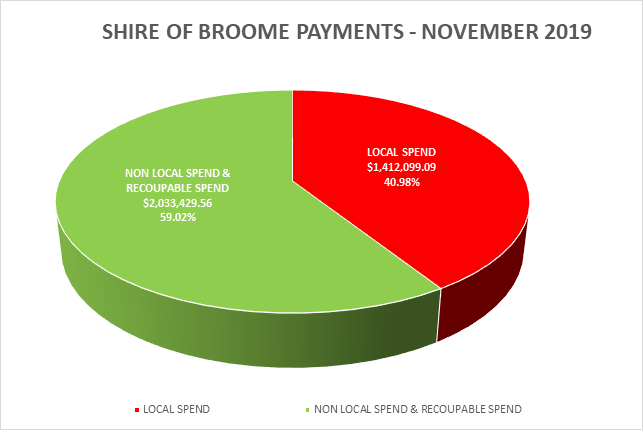
The above graph shows the percentage of local spend in comparison to non-local and recoupable spend for the month of November 2019 after $651,927.27 in personnel payments, $508,573.25 in utilities and other non-local sole suppliers have been excluded.
RISK
The risk of Council not adopting this report is extreme as this will result in non-compliance with Regulation 13 of the Local Government (Financial Management) Regulations 1996.
The likelihood of this ever occurring is rare due to the CEO’s implementation of procedures to ensure payment details are disclosed to Council in a timely manner, as well as Procurement and Purchasing policies which ensure these payments are made in accordance with budget and delegated authority and comply with Local Government (Financial Management) Regulations 1996.
STRATEGIC IMPLICATIONS
Our Organisation Goal – Continually enhance the Shire’s organisational capacity to service the needs of a growing community:
An organisational culture that strives for service excellence
Responsible resource allocation
Effective community engagement
Improved systems, processes and compliance
VOTING REQUIREMENTS
Simple Majority
|
(Report Recommendation) Moved: Cr C Mitchell Seconded: Cr H Tracey That Council: 1. Receives the list of payments made from the Municipal and Trust Accounts in November 2019 totalling $4,606,029.17 (Attachment 1) in accordance with the requirements of Regulation 12 of the Local Government (Financial Management) Regulations 1996 covering: a. EFT Vouchers 53535 - 53979 totalling $4,420,762.41; b. Municipal Cheque Vouchers 57620 – 57621 totalling $403.81; c. Trust Cheque Vouchers 000 – 000 totalling $0.00; and d. Credit Card Payments and Municipal Direct Debits DD27219.1 - DD27330.6 totalling $184,862.95. 2. Notes the local spend of $1,412,099.09 included in the amount above, equating to 40.98% of total payments excluding personnel, utility and other external sole supplier costs. |
|
Monthly Payment November 2019 |
|
|
Local Spend Payment Listing November 2019 |
Minutes – Ordinary Meeting of Council 12 December 2019 Page 1 of 3
|
SUMMARY: This report presents for Council endorsement the Minutes from the Joint Meeting of the Kimberley Zone of WALGA and Kimberley Regional Group held on 3 December 2019. |
BACKGROUND
Previous Considerations
A copy of the minutes from the joint meeting held 3 December 2019 between members of the Kimberley Zone of WALGA (Zone) and Kimberley Regional Group (KRG) is attached for Council consideration (Attachment 1 – Joint Kimberley Zone and Kimberley Regional Group Minutes 3 December 2019).
As a result of a past decision of the group, both the Kimberley Zone and KRG meetings are joined.
It should be remembered that the Kimberley Zone of WALGA is a group established to represent regional issues to the State Council of the Western Australian Local Government Association (WALGA). This group includes the four Kimberley Shires in addition to the Shires of Christmas Island and Cocos Keeling Islands.
The KRG is a group defined through a deed of agreement between the four Kimberley local governments with the Minister for Local Government.
The Shire of Broome accepted the Secretariat role for the Kimberley Zone / KRG late in 2017, with the formal transition to Secretariat finalised in December 2017.
COMMENT
The minutes and respective background information are attached to this report and the following comments are made in relation to the resolutions passed by the Group. Additional recommendations have been made where necessary for Council’s consideration.
The following items should be noted by Council:
9.1 Election of Chair and Deputy Chair
As this was the first meeting post election, KRG Board representatives were required to be nominated from each member Council and a Chair and Deputy Chair elected.
There was no change to Member Council Representatives through the nomination process.
Only one nomination was received for Chair and Cr Chris Mitchell was elected unopposed. Cr Mitchell will also be the Kimberley Zone representative on WALGA State Council.
Only one nomination was received for Deputy Chair and Cr David Menzel was elected unopposed.
Council should note that under the terms of the KRG Governance Agreement the Shire of Broome will continue to act as Secretariat for the next 2 years, which will impact on internal resources.
8.4 WALGA State Council Regional Meeting – Kimberley (September 2020)
The KRG resolved to accept an invitation for the Kimberley Country Zone to host the Regional State Council meeting on 3 and 4 September 2020 in Broome.
9.2 Meeting Dates 2020
The KRG set its 2020 meeting dates. The number of meetings remains the same however there will be an increased use of video conferencing to save on the costs of face to face meetings. Face to face meetings will occur in the Shire of Halls Creek on 21 April and in Perth on 3 August.
It should be noted that at the time of writing the report no details were available on the annual Pilbara – Kimberley Forum. This may result in changes to the meeting schedule and an additional face to face meeting.
9.3 Kimberley Regional Group Annual Financial Statement 2018/19
The KRG received audited Annual Financial Statement for 2018/19. The audit report stated that the financial report presented fairly in all material aspects and no management issues were raised.
The report also noted the carry-forward surplus of $302,610, due mainly to projects funded through surplus being deferred and funds returned to surplus.
9.3 Kimberley Regional Group Financial Activity Statement October 31 2019
This report presented the financial statement for the period ending October 31 2019. The current surplus is $480,036 with a predicted end of year surplus of $90,319.
9.8 Delegation to Canberra
This item reported on the outcomes of the recent KRG Canberra Delegation with a verbal report provided by ATEA Consulting, the groups Executive Officer resource.
CONSULTATION
Nil.
STATUTORY ENVIRONMENT
Local Government Act 1995
POLICY IMPLICATIONS
Nil.
FINANCIAL IMPLICATIONS
As a member of the Kimberley Regional Group the Shire of Broome commits funds to regional initiatives by way of a financial contribution towards the group. The budget forecasts a member contribution of $50,000. $50,000 has been allocated to Kimberley Zone Member Contributions within the Shire’s 2019/20 Budget.
Historically members have also contributed “seed funding” to allow the group to undertake priority projects identified within the KRG Regional Business Plan. As there is an identified surplus this seed funding contribution is not required in 2019/20.
There may be some financial impact relating to the attendance of Council representatives at Zone meetings. Funds to facilitate attendance are allocated during the annual budget cycle.
RISK
There is minimal risk associated with the recommendation of this report to the Shire of Broome.
STRATEGIC IMPLICATIONS
Our People Goal – Foster a community environment that is accessible, affordable, inclusive, healthy and safe:
Affordable services and initiatives to satisfy community need
Accessible and safe community spaces
Participation in recreational and leisure activity
A healthy and safe environment
Our Place Goal – Help to protect the nature and built environment and cultural heritage of Broome whilst recognising the unique sense of the place:
Realistic and sustainable land use strategies for the Shire within state and national frameworks and in consultation with the community
Retention and expansion of Broome’s iconic tourism assets and reputation
Our Prosperity Goal – Create the means to enable local jobs creation and lifestyle affordability for the current and future population:
Affordable and equitable services and infrastructure
Affordable land for residential, industrial, commercial and community use
Key economic development strategies for the Shire which are aligned to regional outcomes working through recognised planning and development groups/committees
Our Organisation Goal – Continually enhance the Shire’s organisational capacity to service the needs of a growing community:
An organisational culture that strives for service excellence
Sustainable and integrated strategic and operational plans
Responsible resource allocation
Effective community engagement
Improved systems, processes and compliance
VOTING REQUIREMENTS
Simple Majority
|
(Report Recommendation) Moved: Cr C Mitchell Seconded: Cr P Matsumoto That Council: 1. Notes the election of Cr Chris Mitchell as Chair of the Kimberley Regional Group; 2. Endorses the Shire of Broome undertaking the Kimberley Regional Group Secretariat role for the next 2 years; and 3. Receives and endorses the resolutions of the Kimberley Zone of WALGA / Kimberley Regional Group as attached in the minutes from the Joint Meeting held 3 December 2019 en bloc. |
|
Minutes of the Joint Kimberley Zone and Kimberley Regional Group - 3 December 2019 |
|
Item 10.1 - MINUTES OF THE JOINT MEETING OF THE KIMBERLEY ZONE OF WALGA AND KIMBERLEY REGIONAL GROUP HELD 3 DECEMBER 2019 |










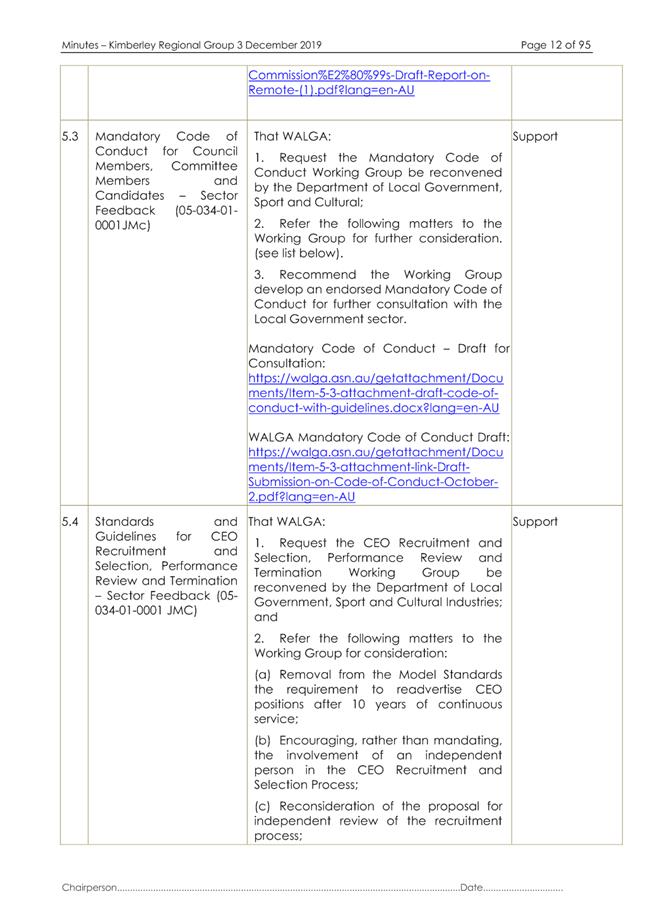









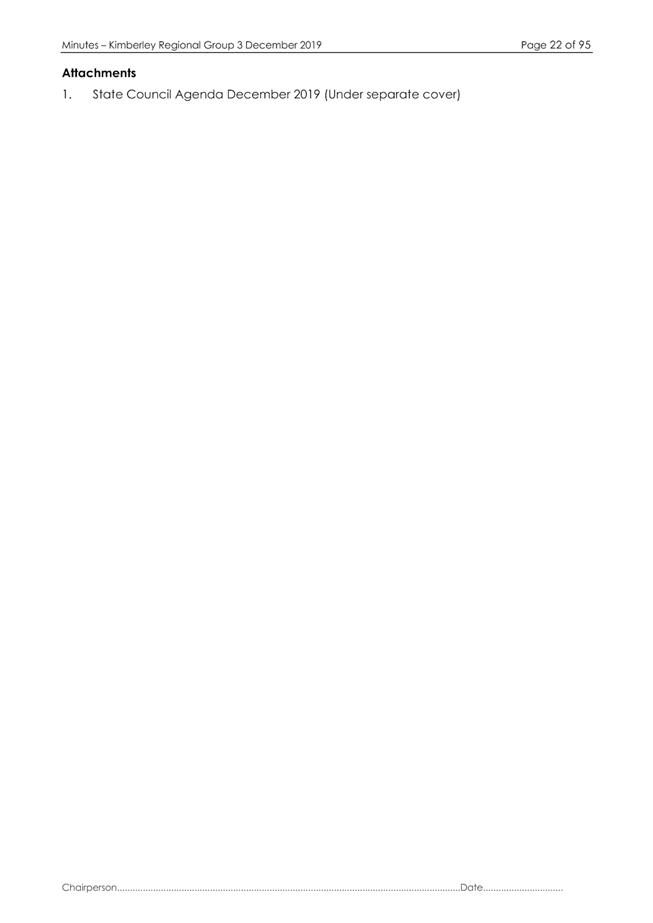

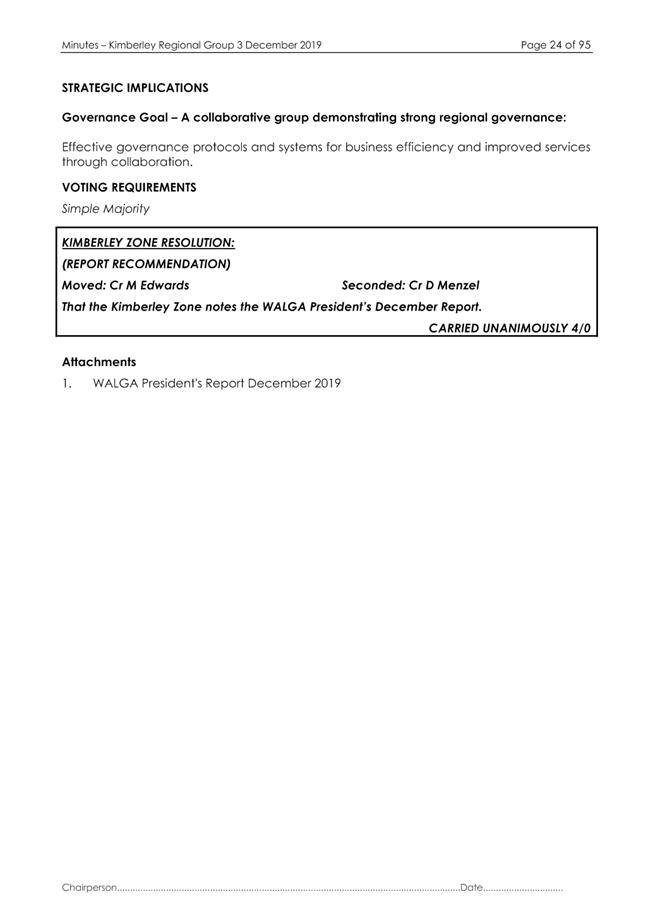

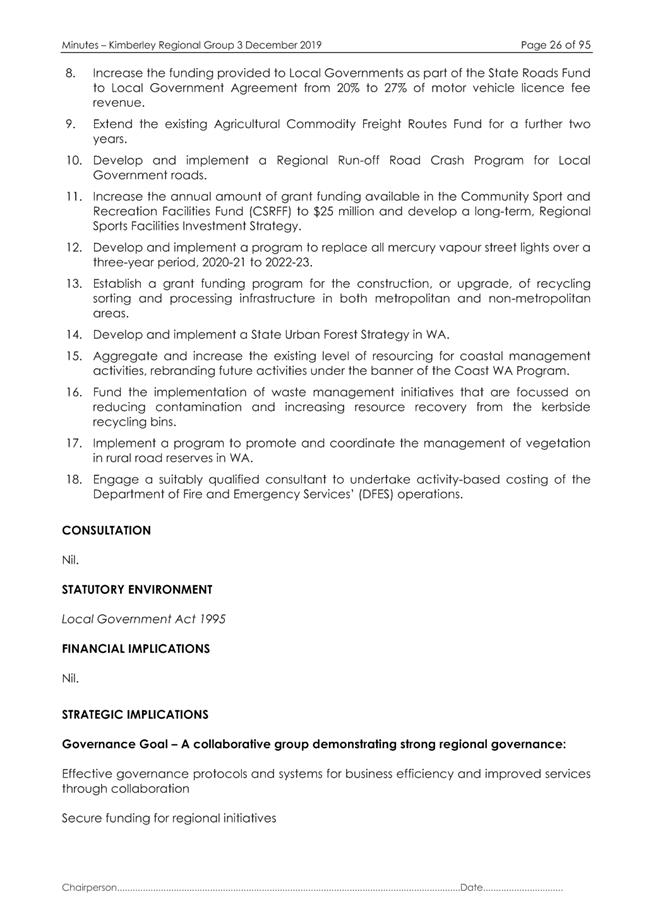

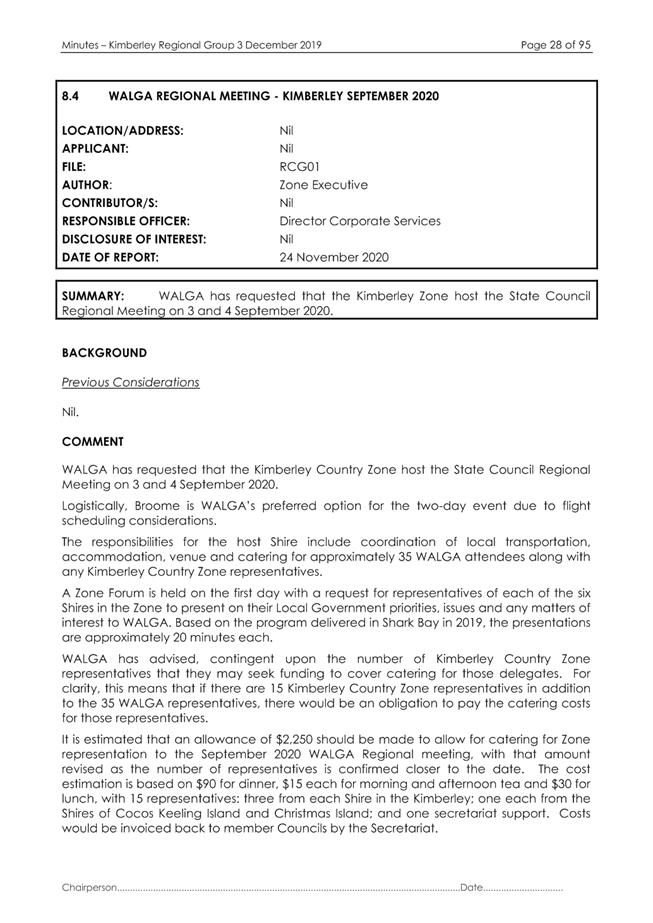

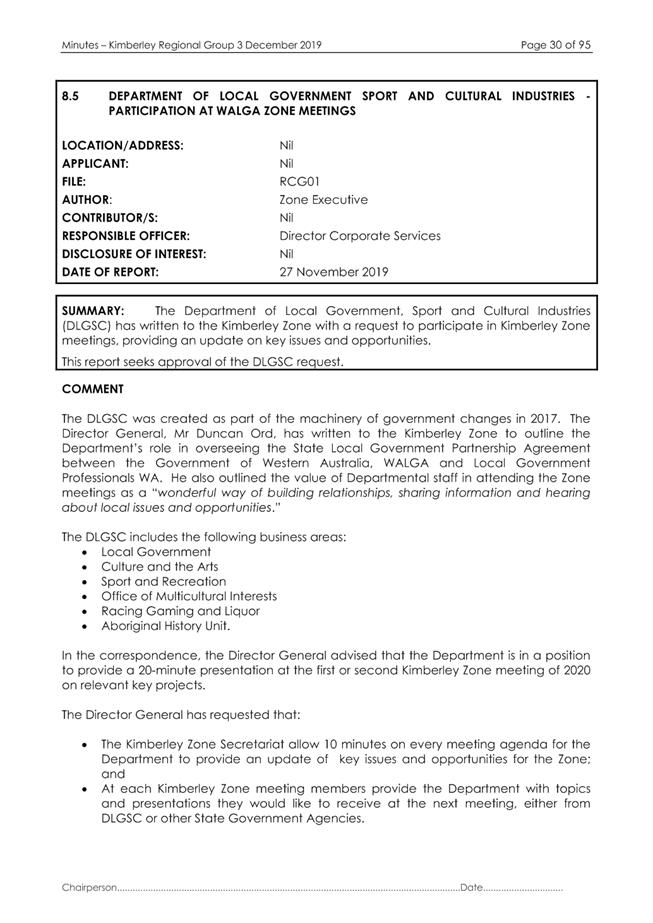

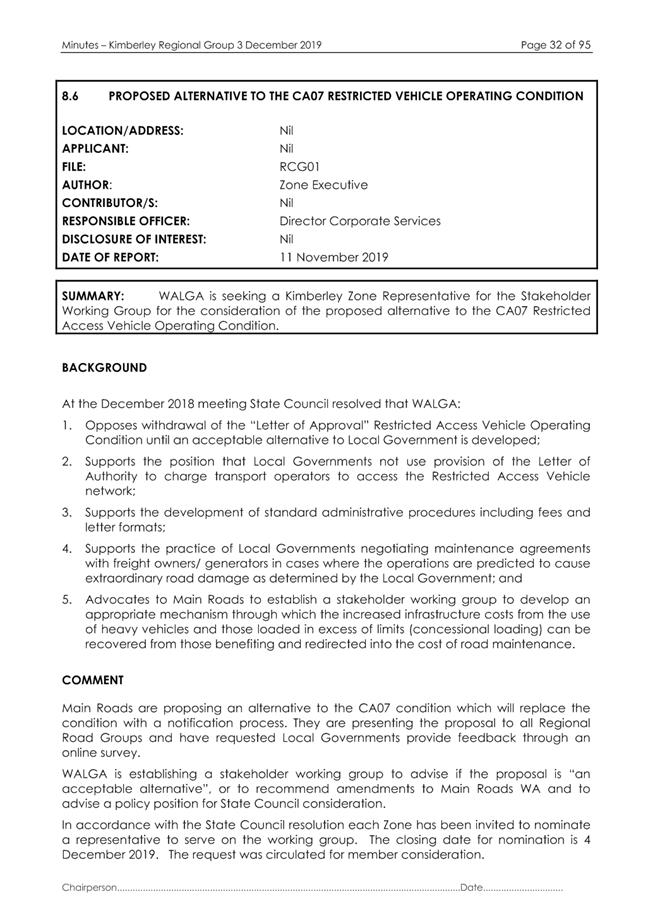
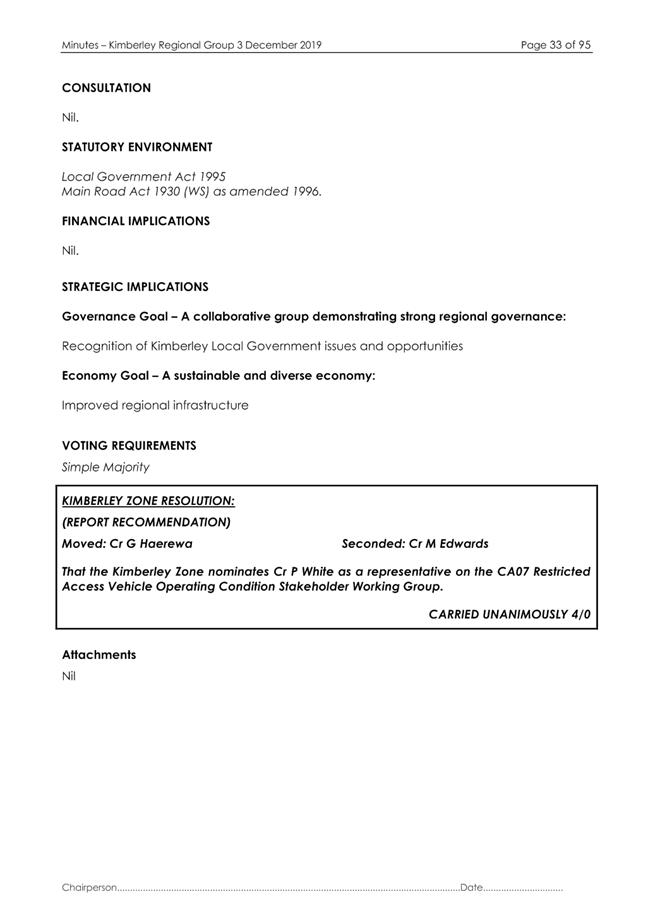
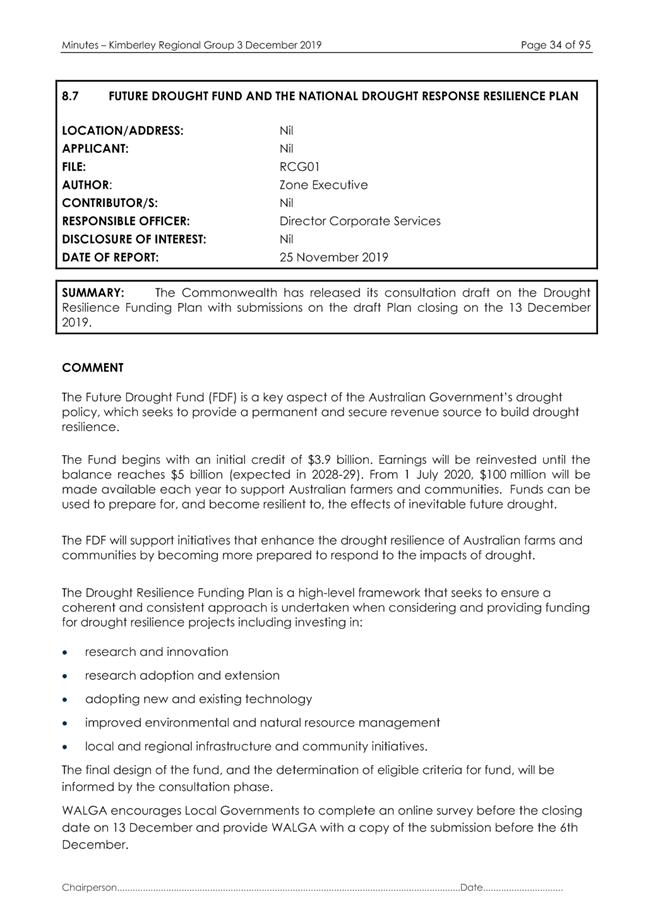

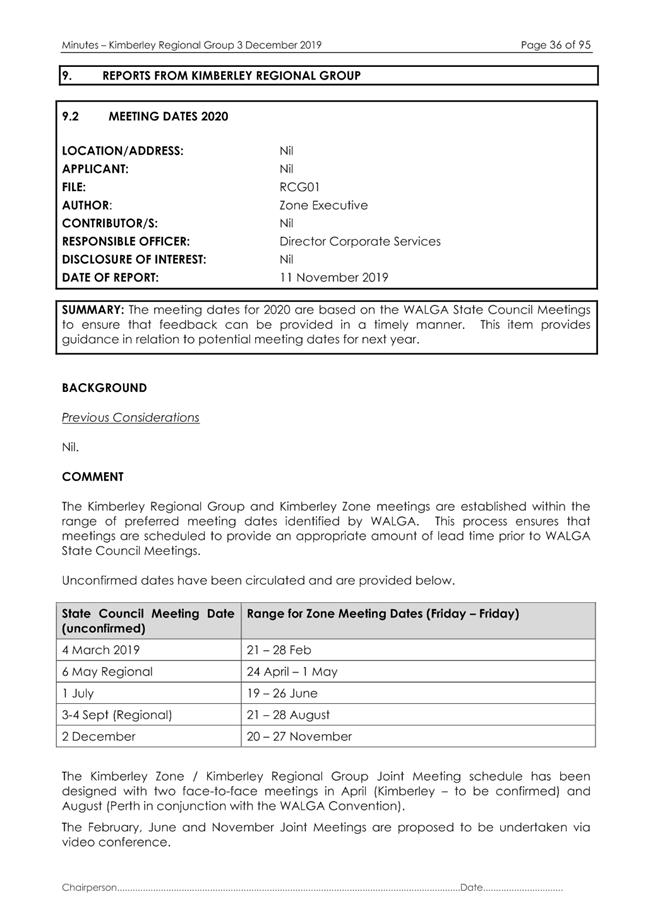

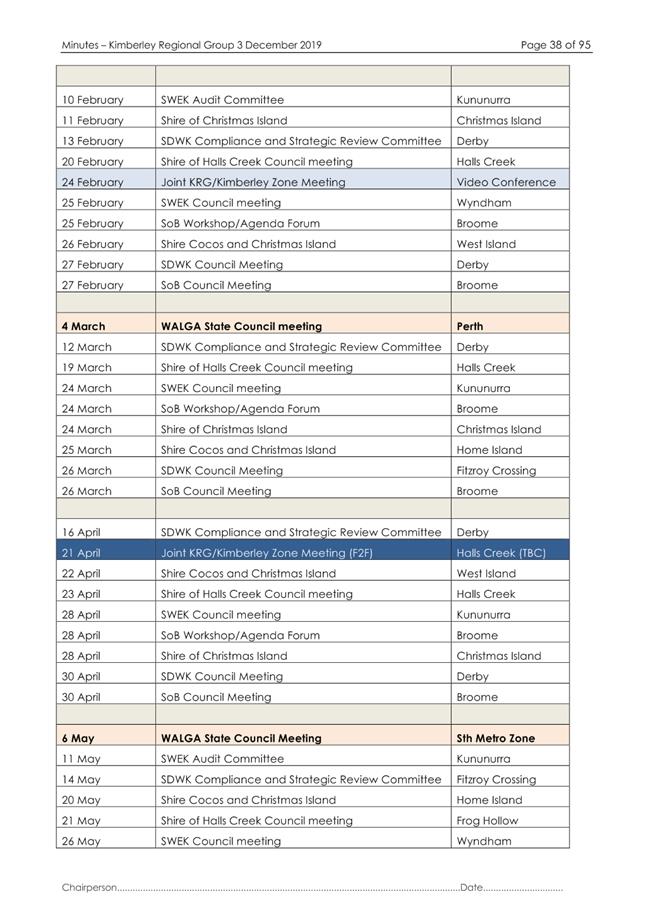

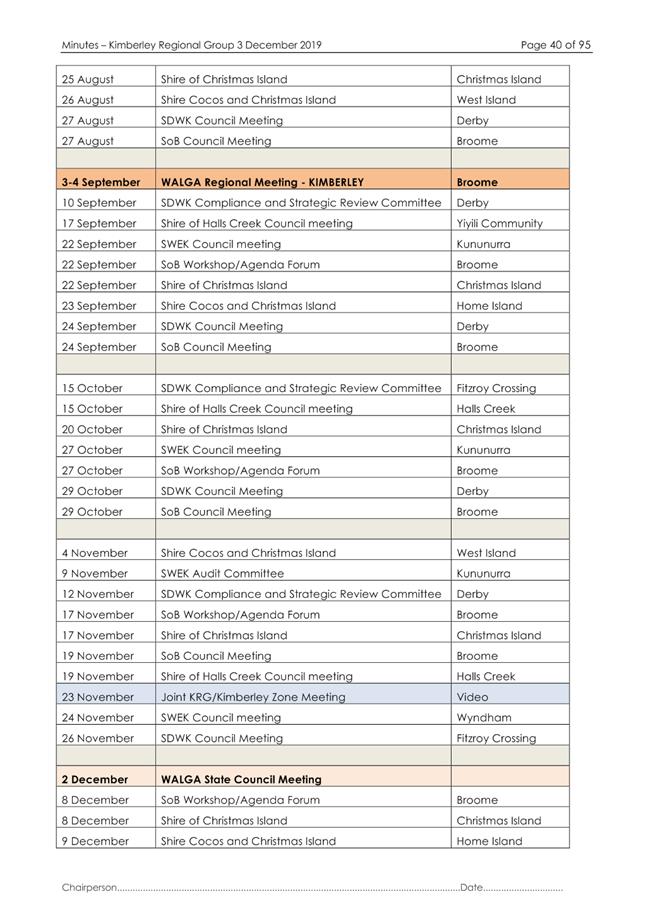

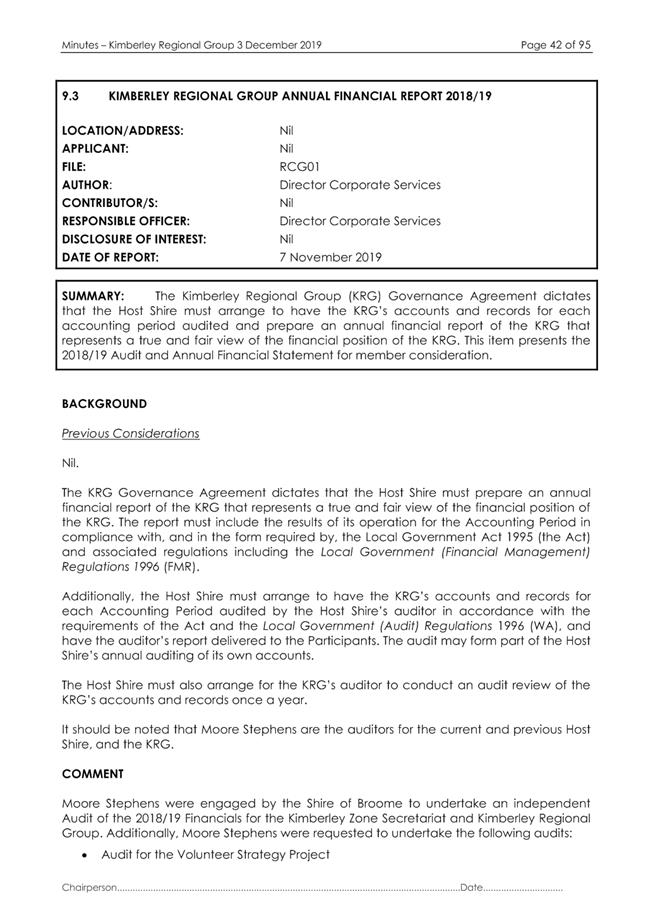
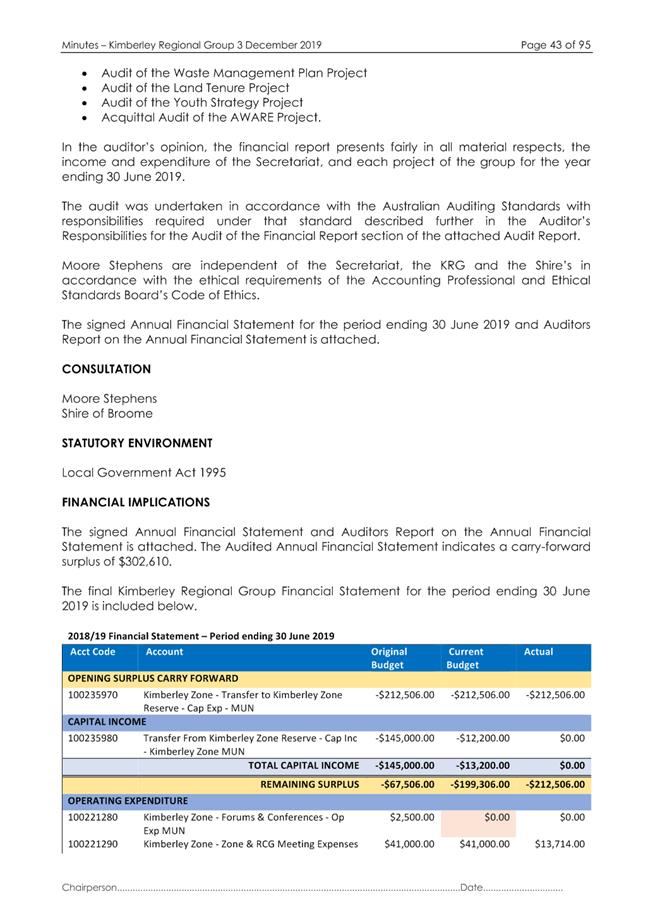
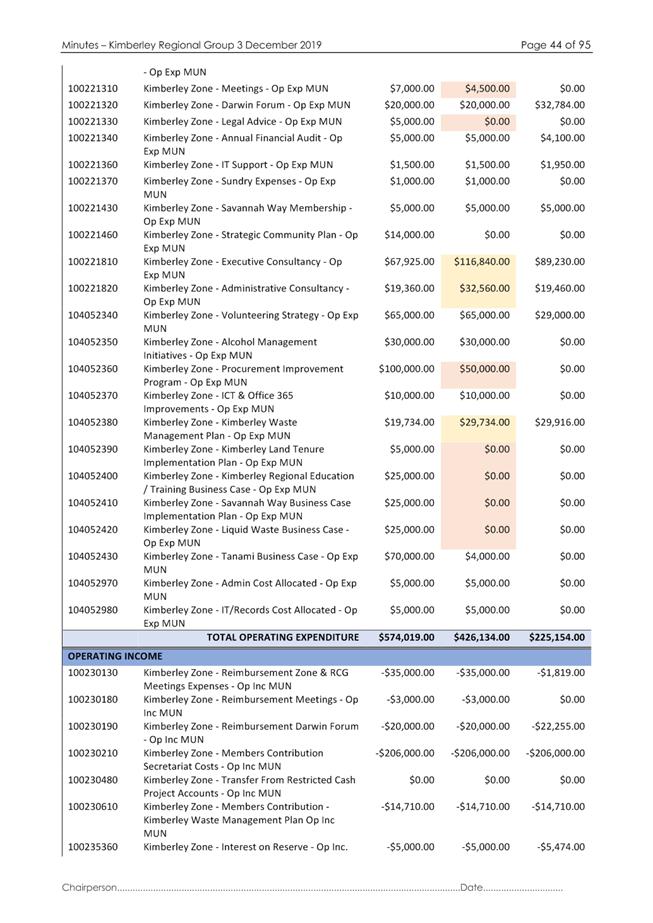

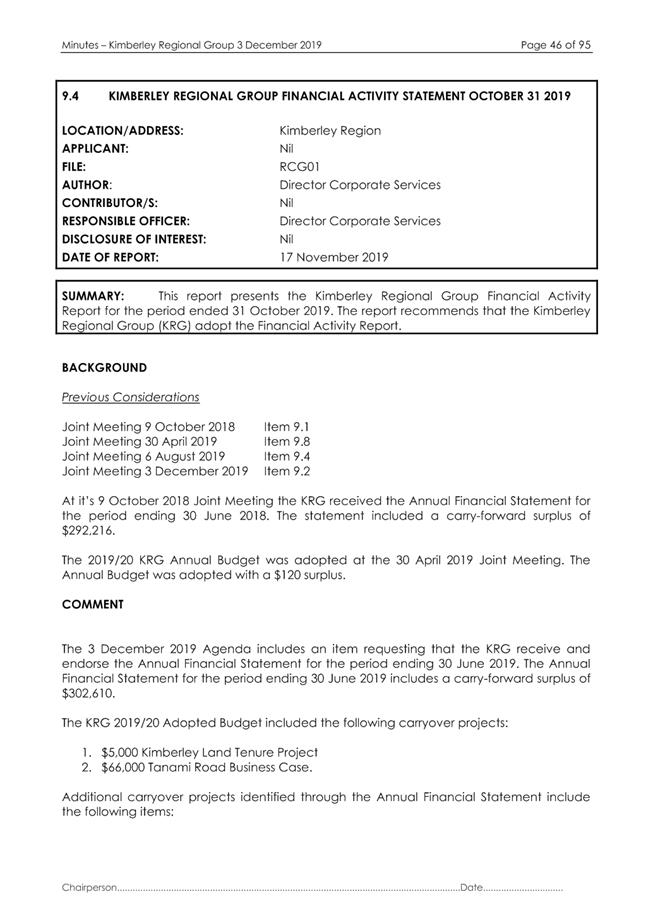
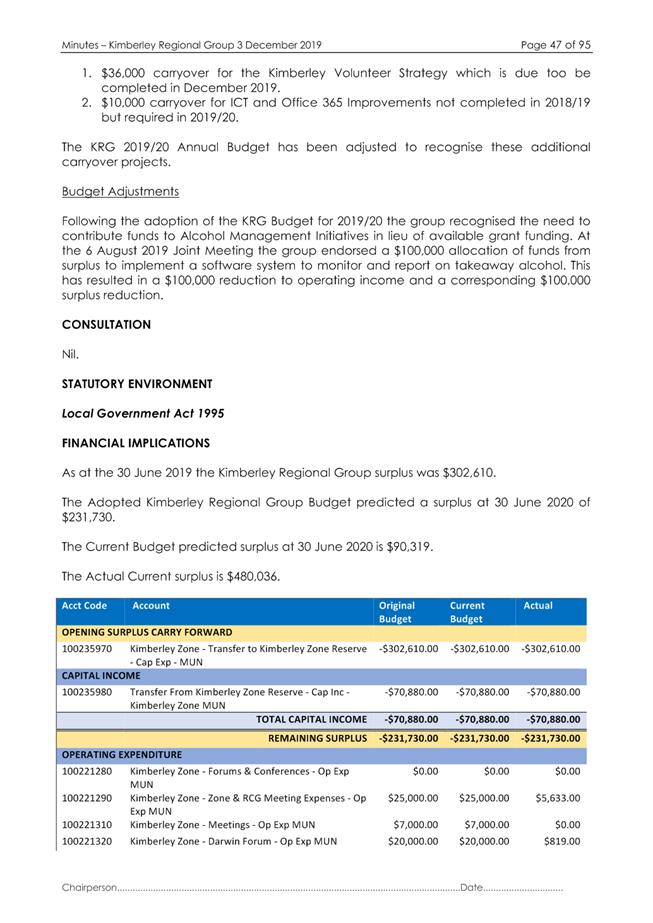
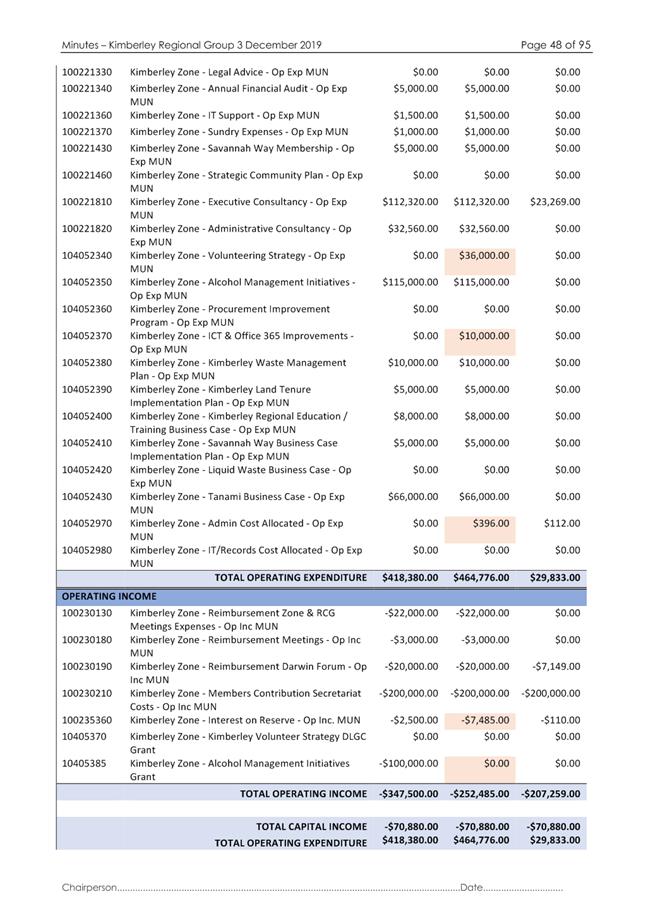

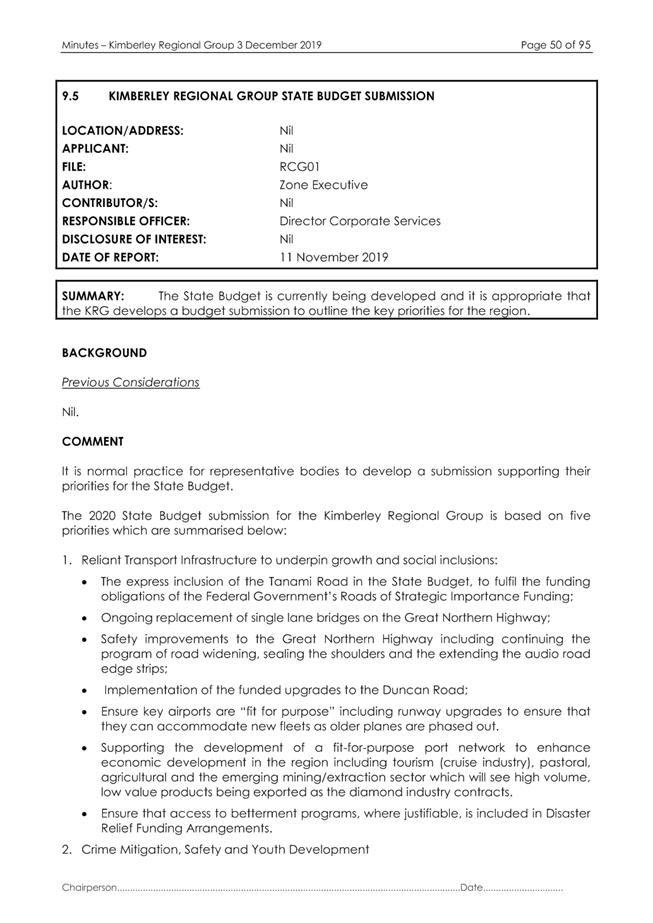
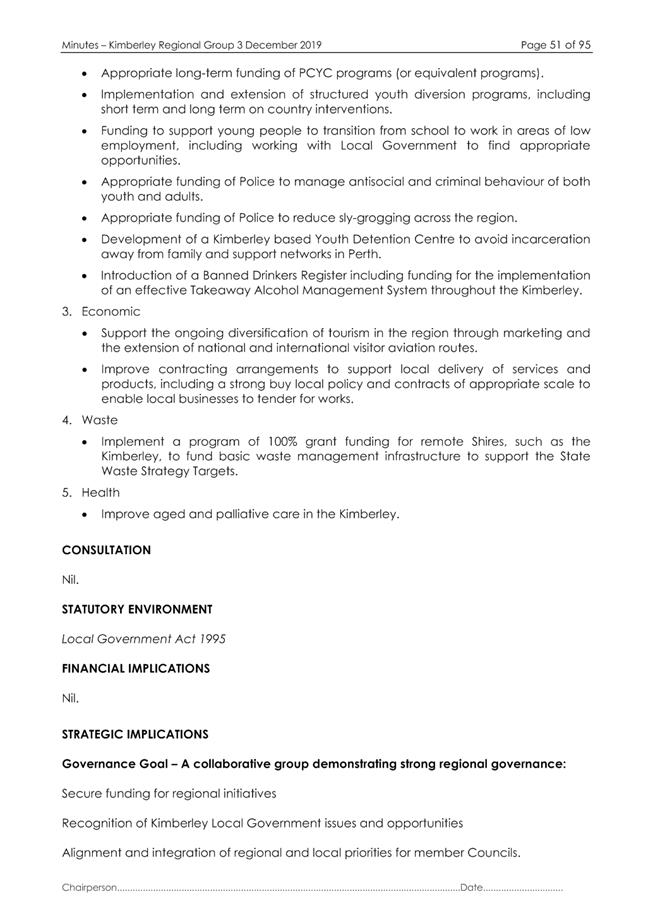
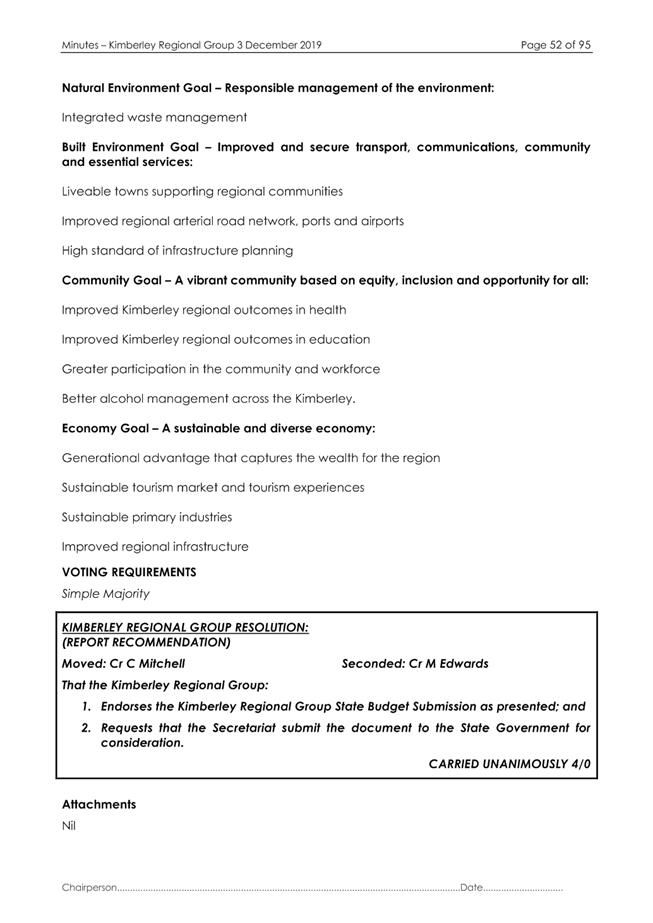
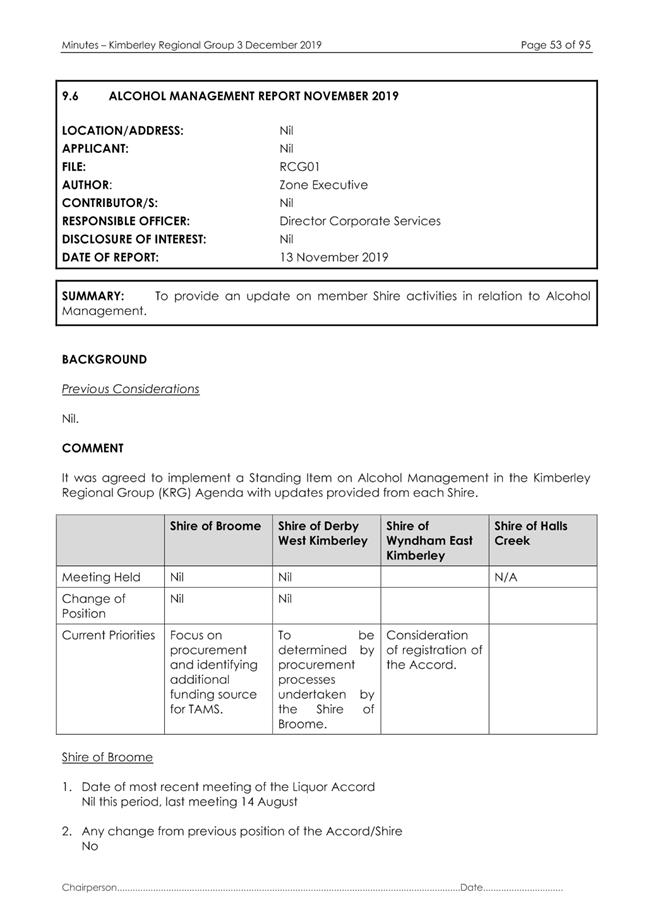
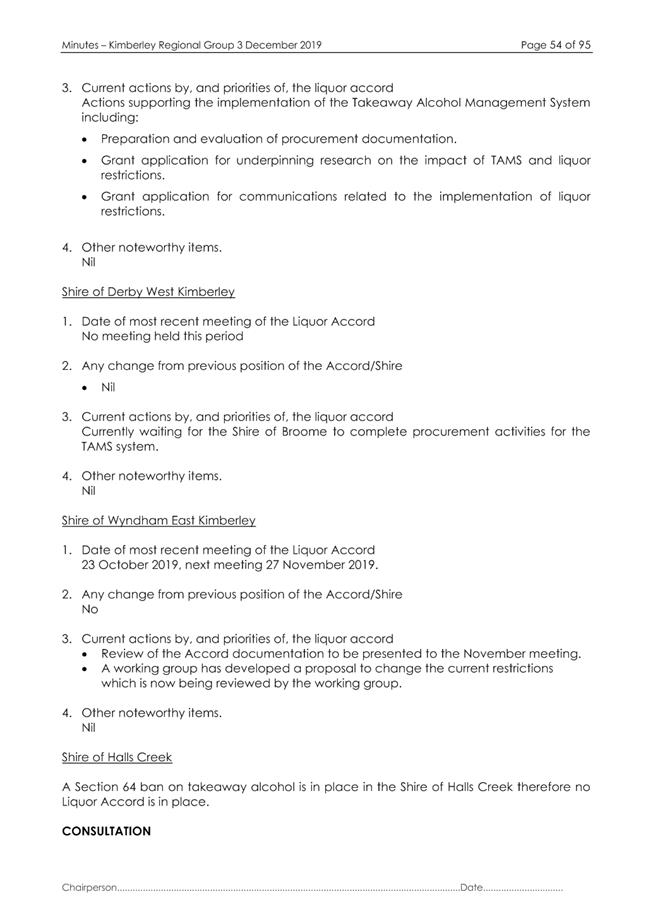
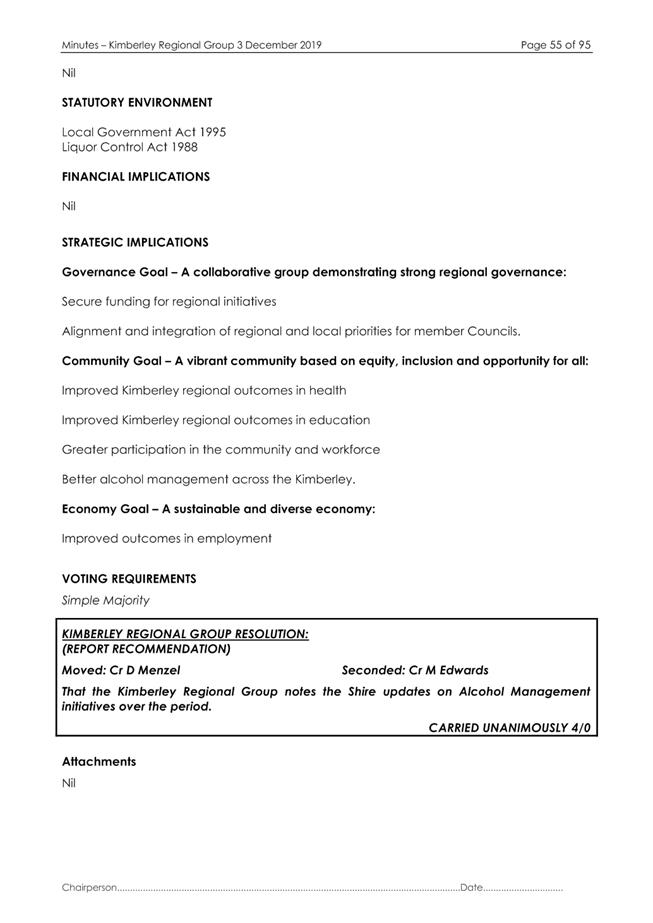
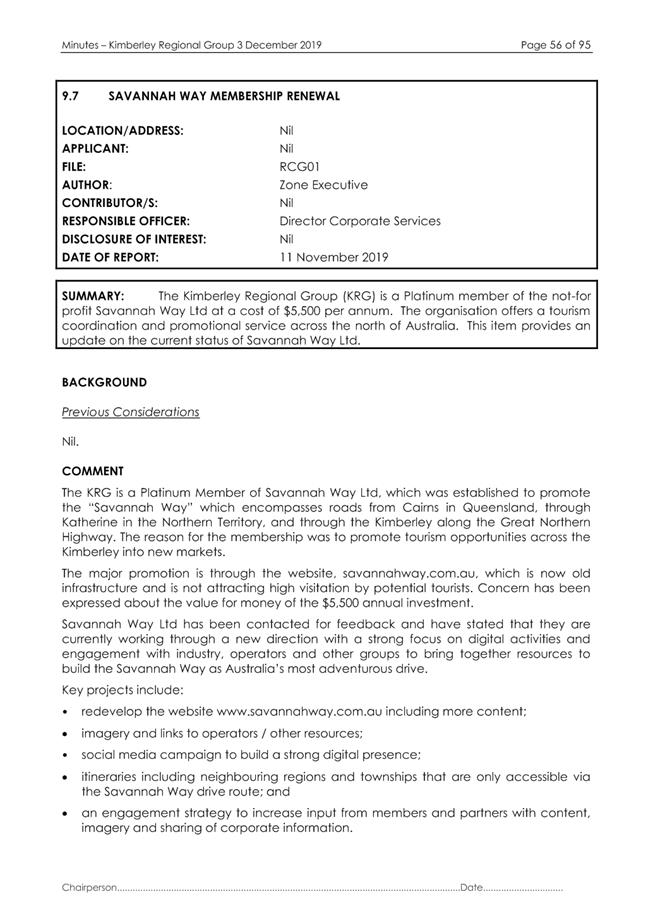
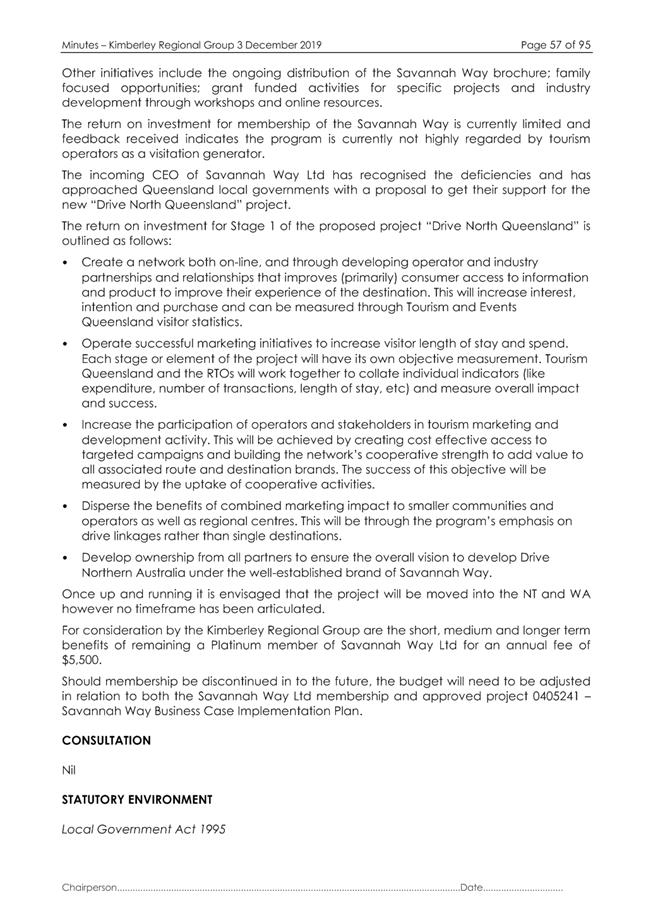
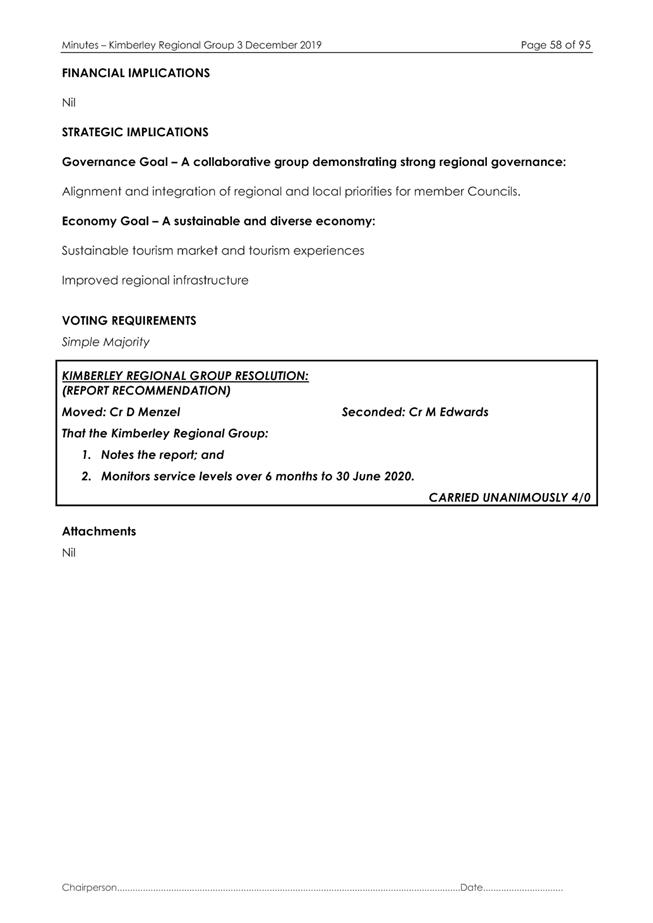
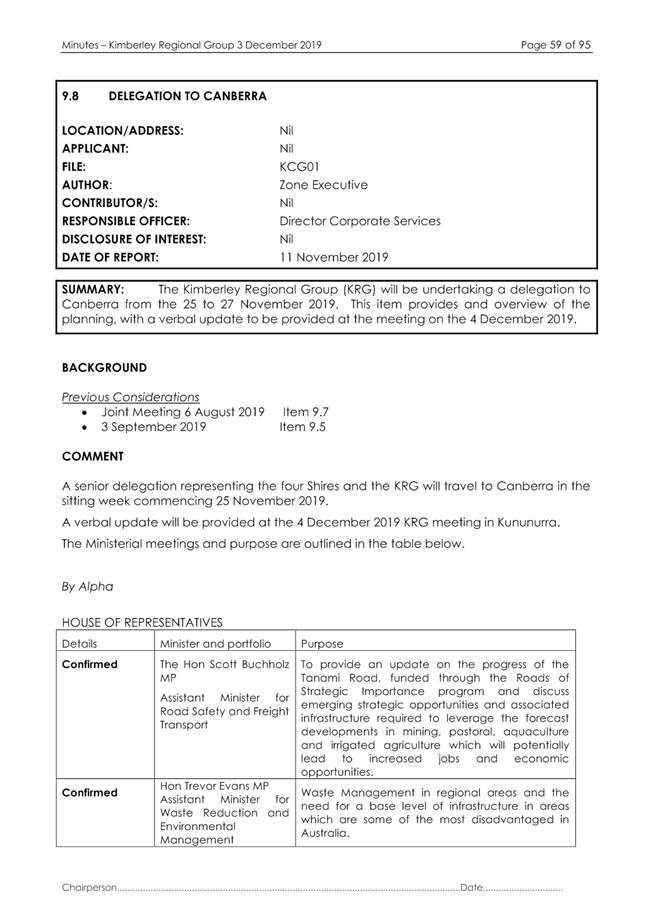
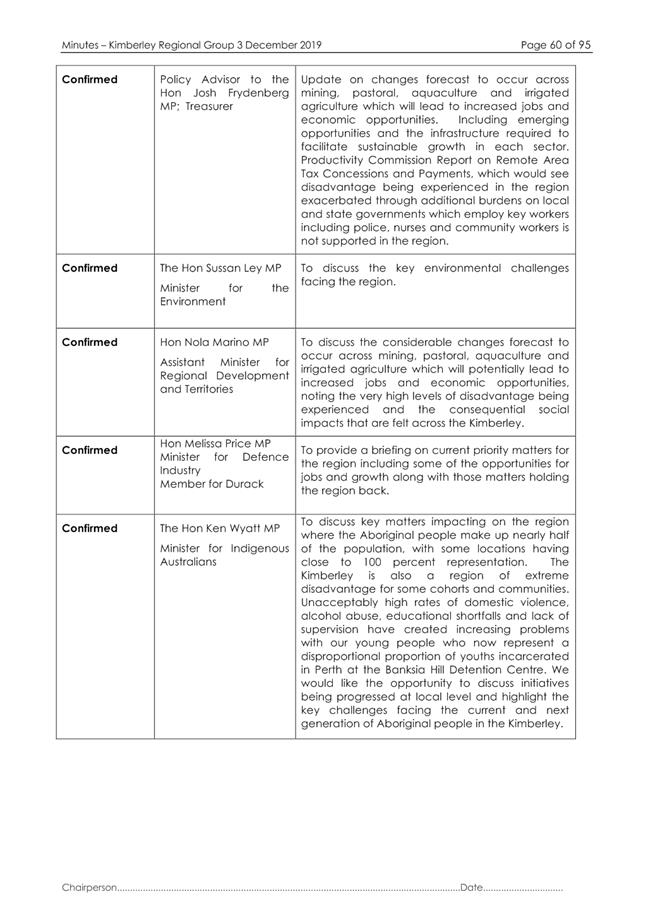
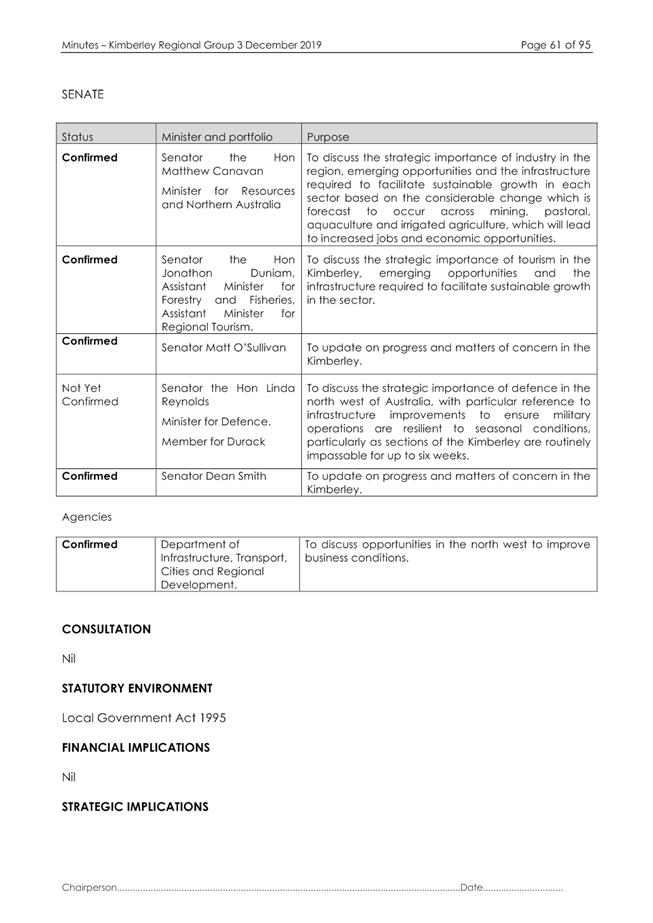
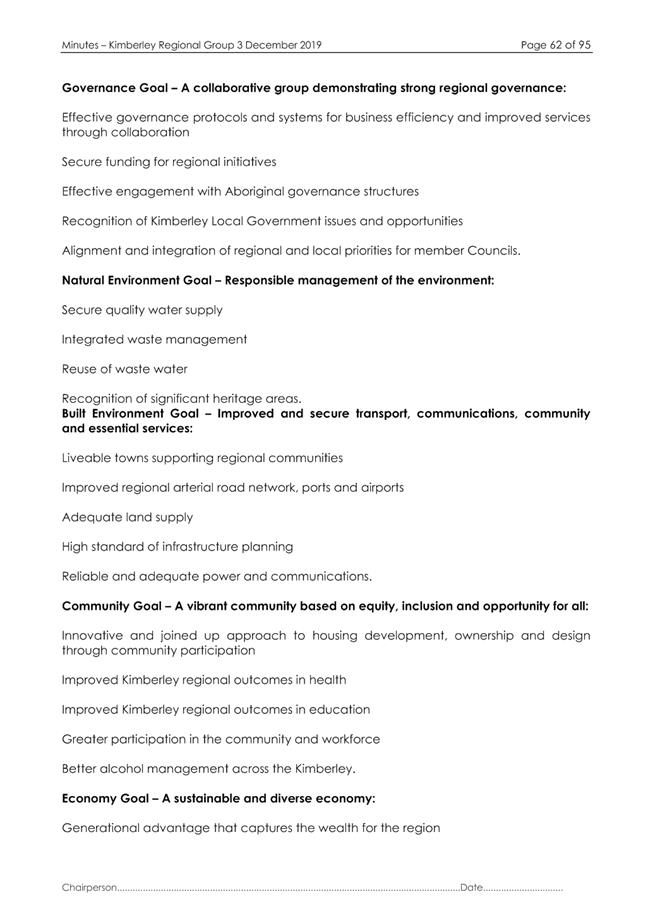
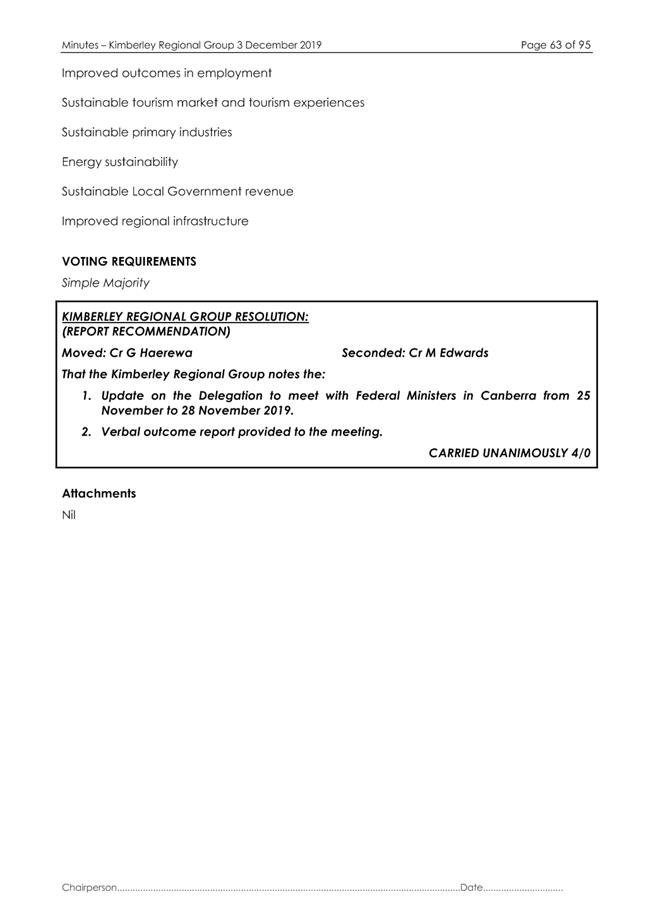
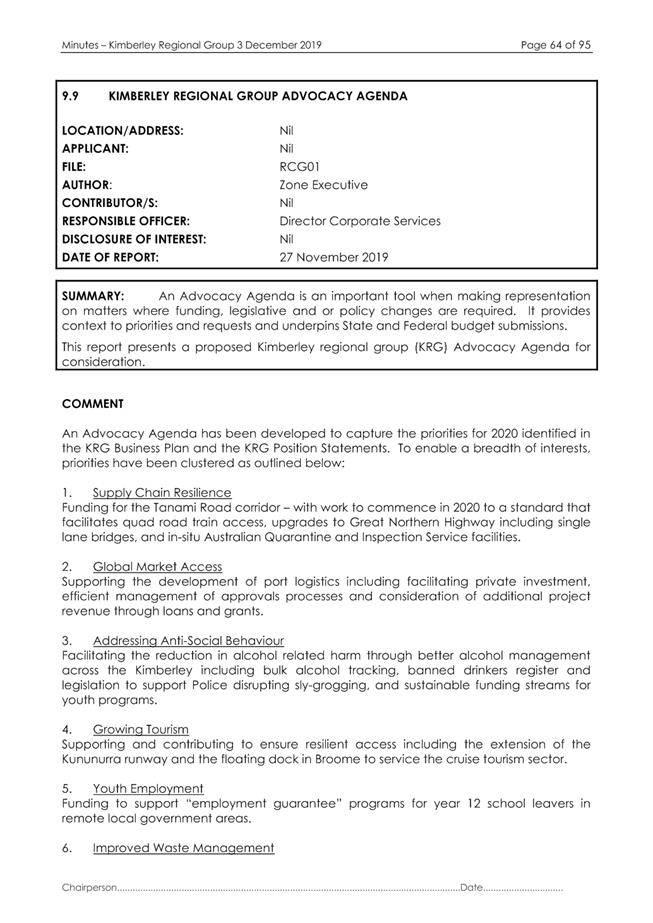
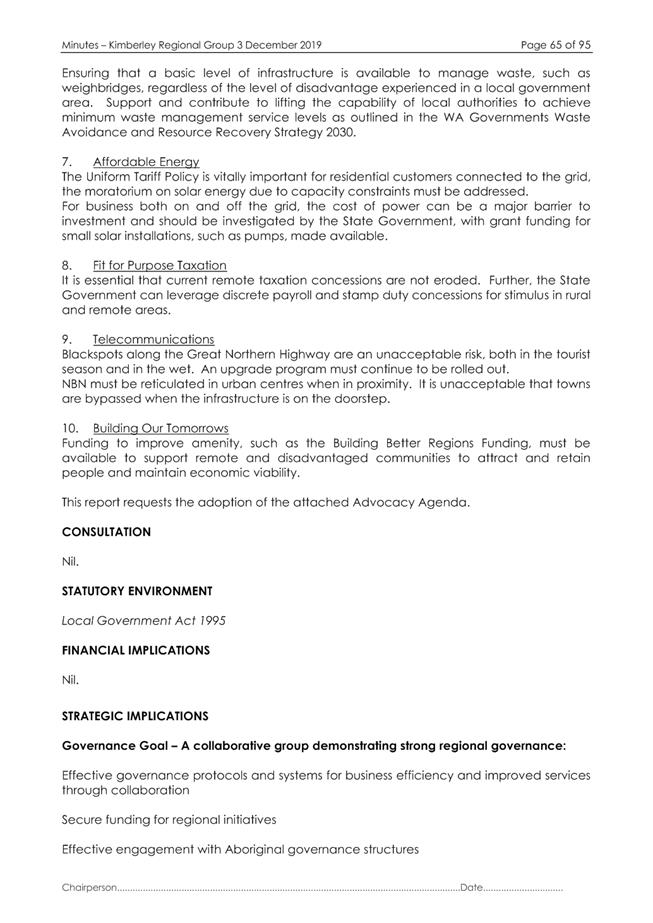
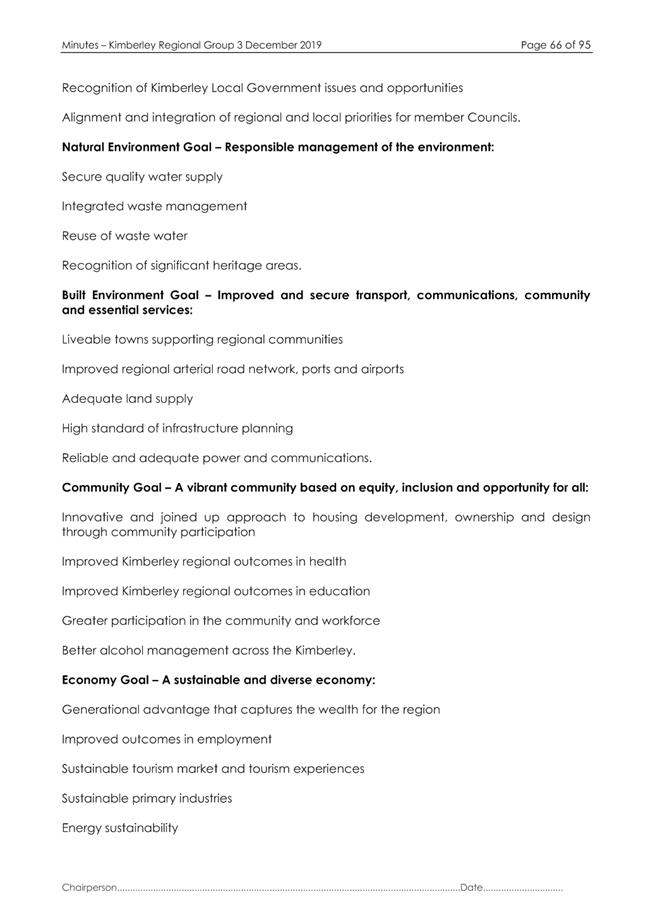
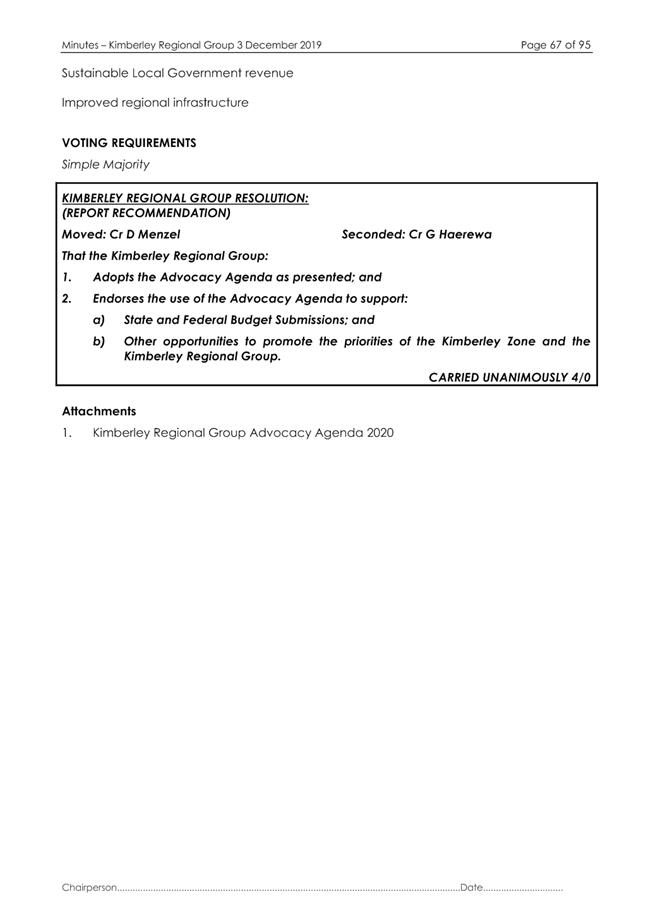
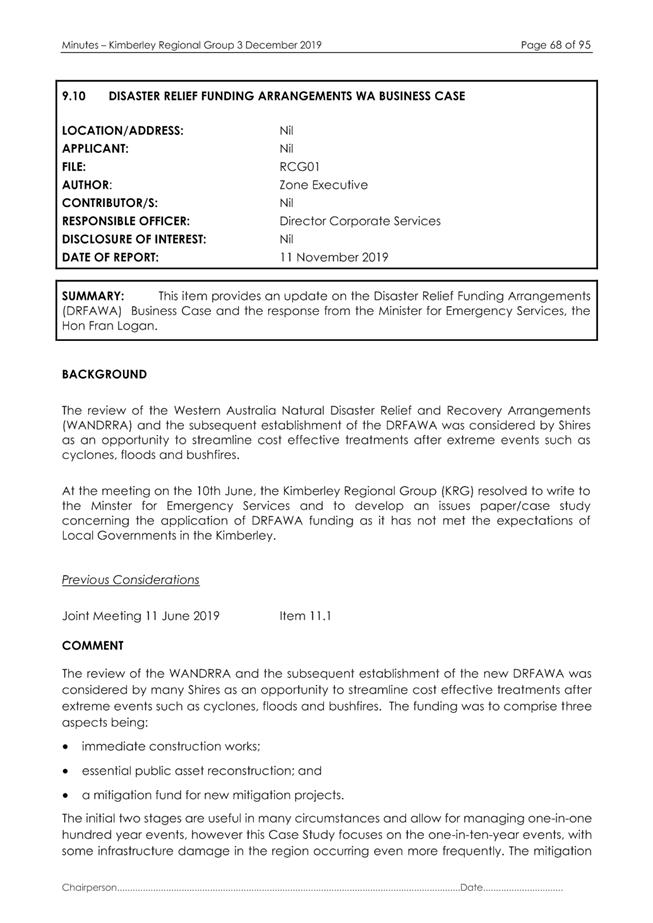
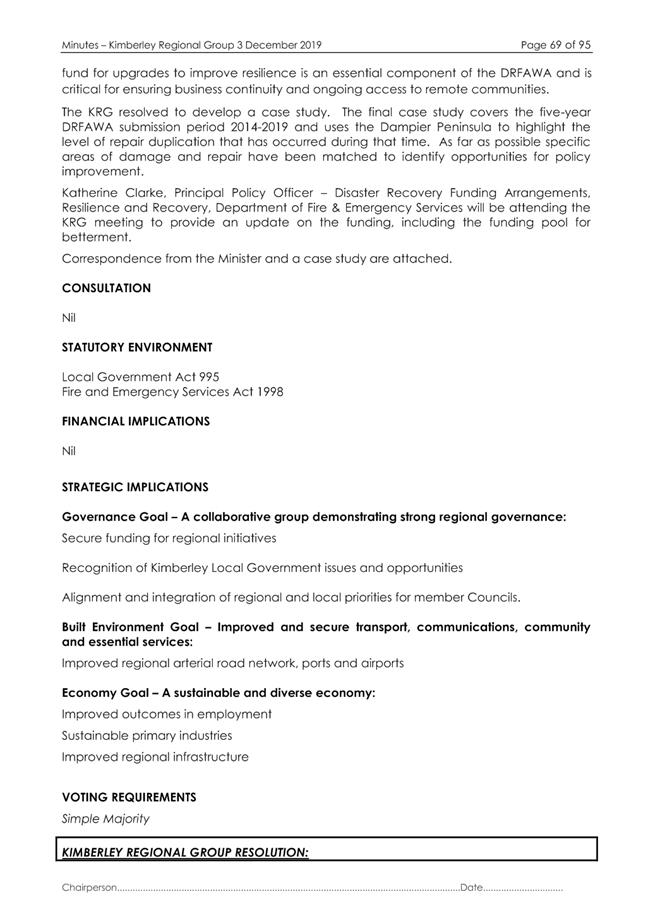
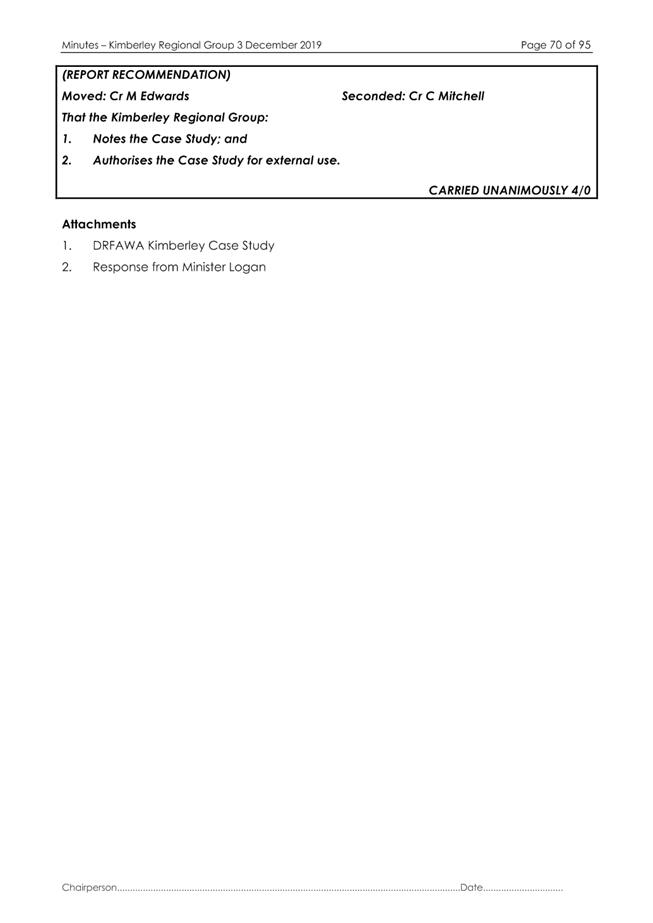
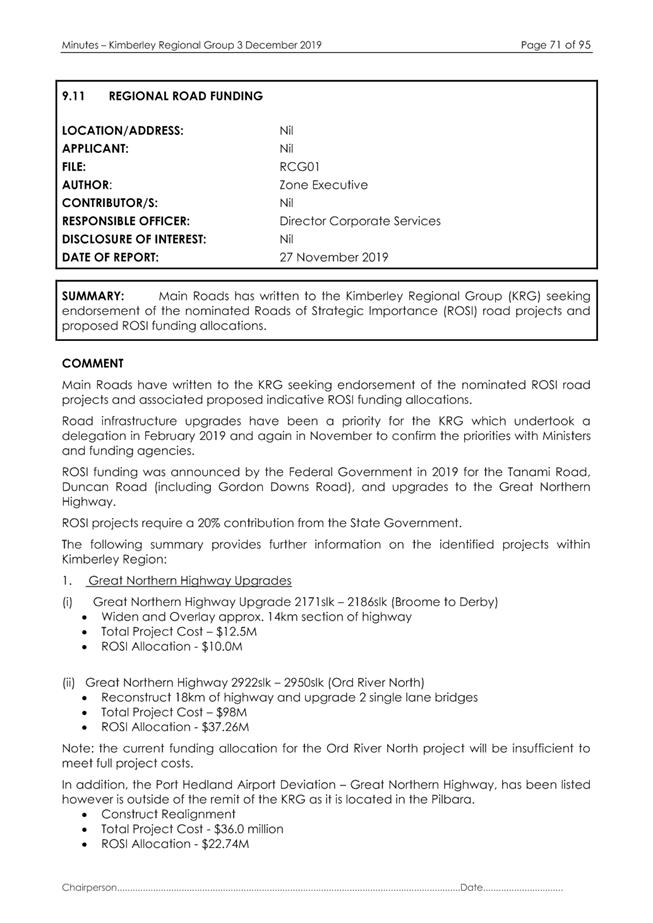
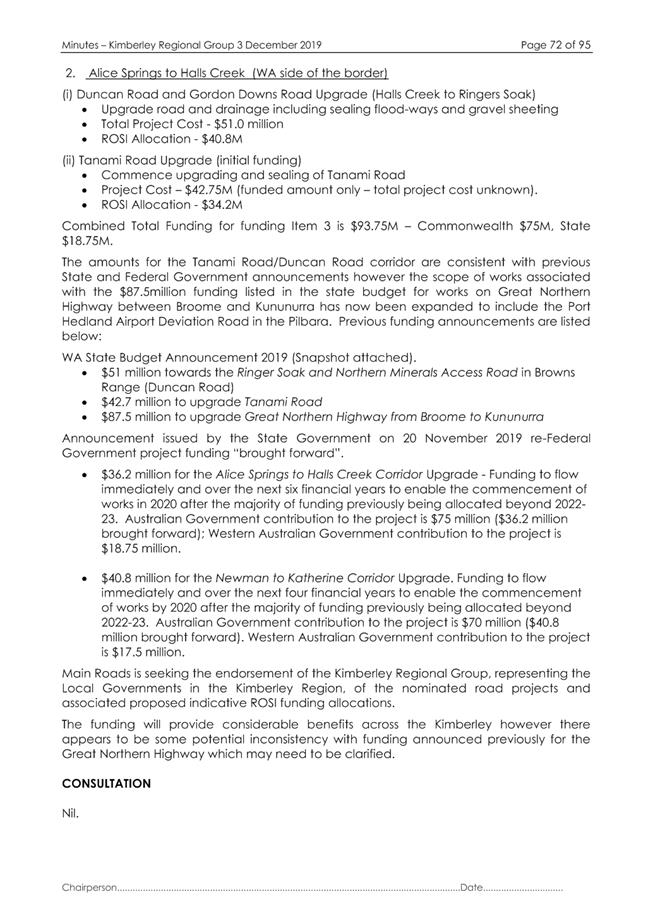
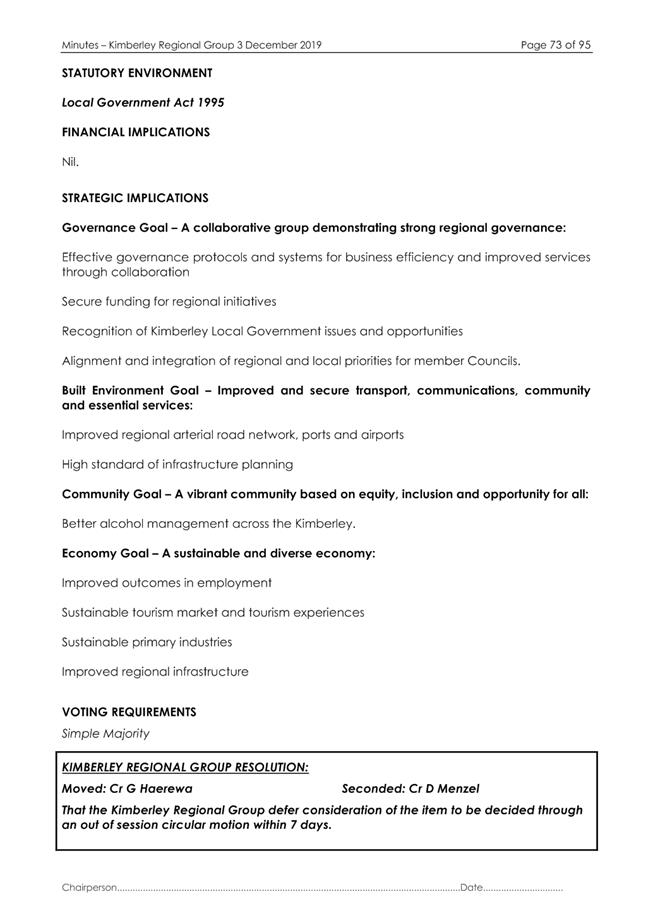
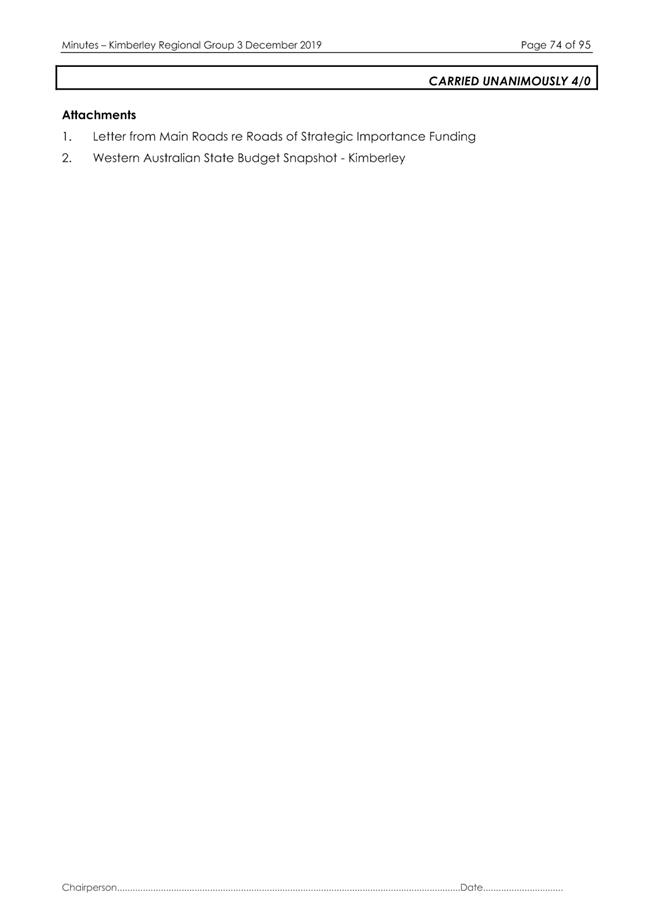
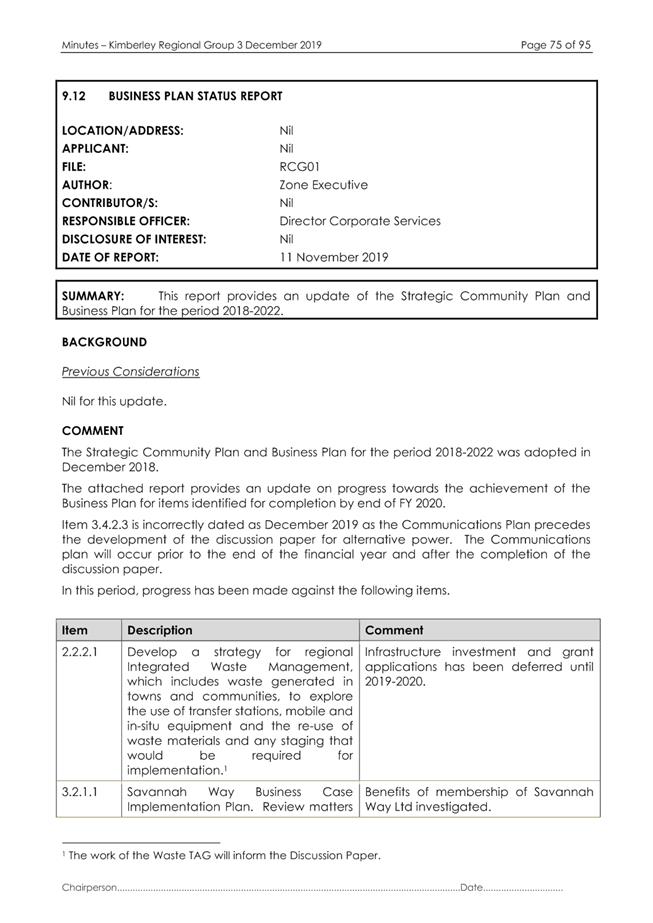
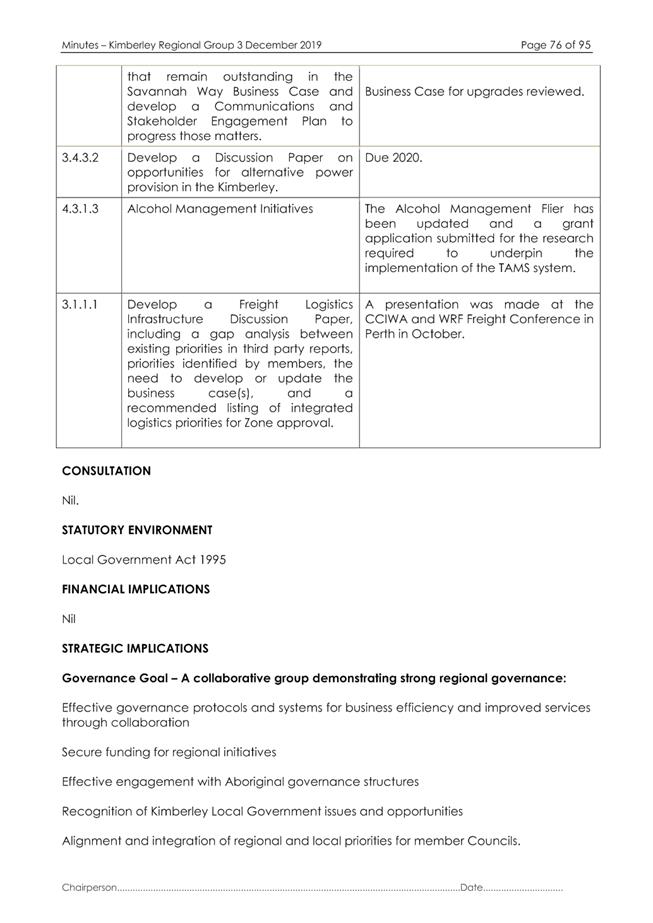
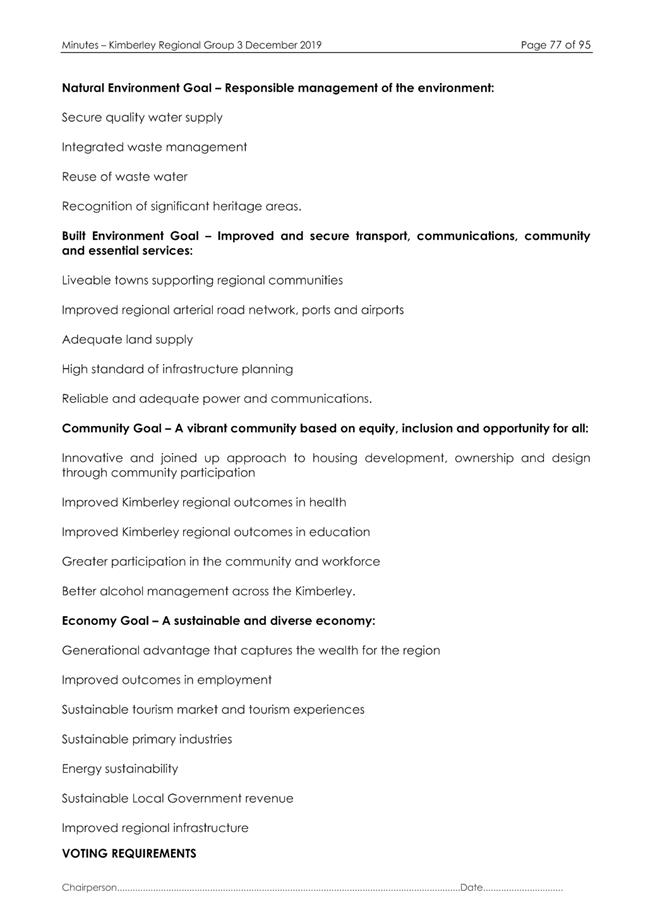
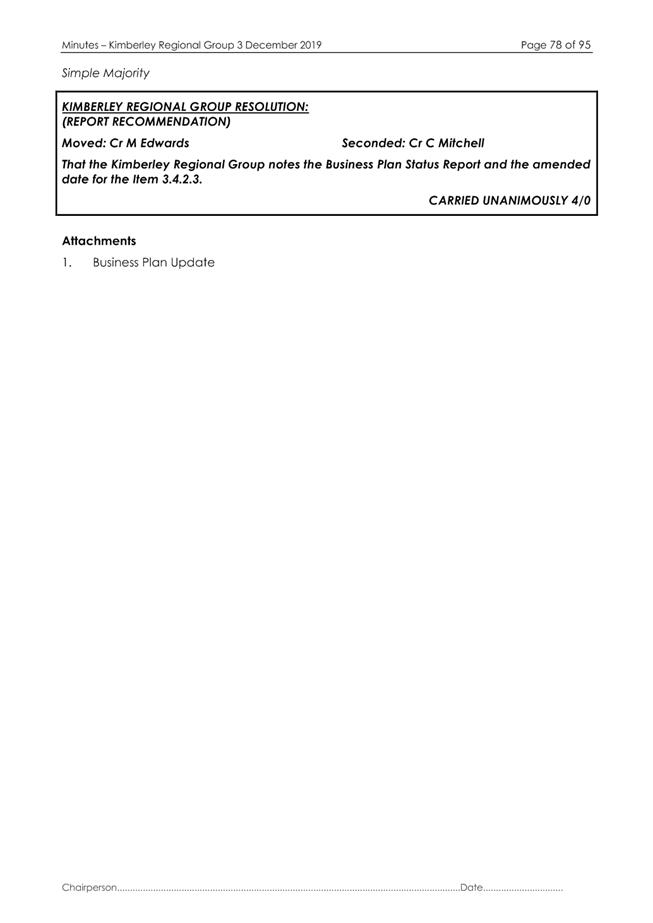
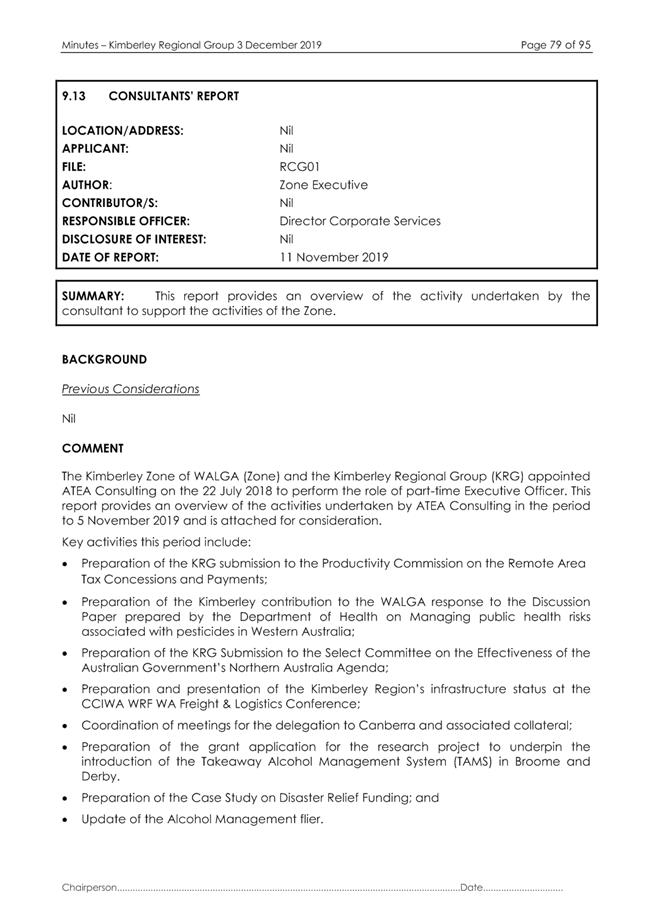
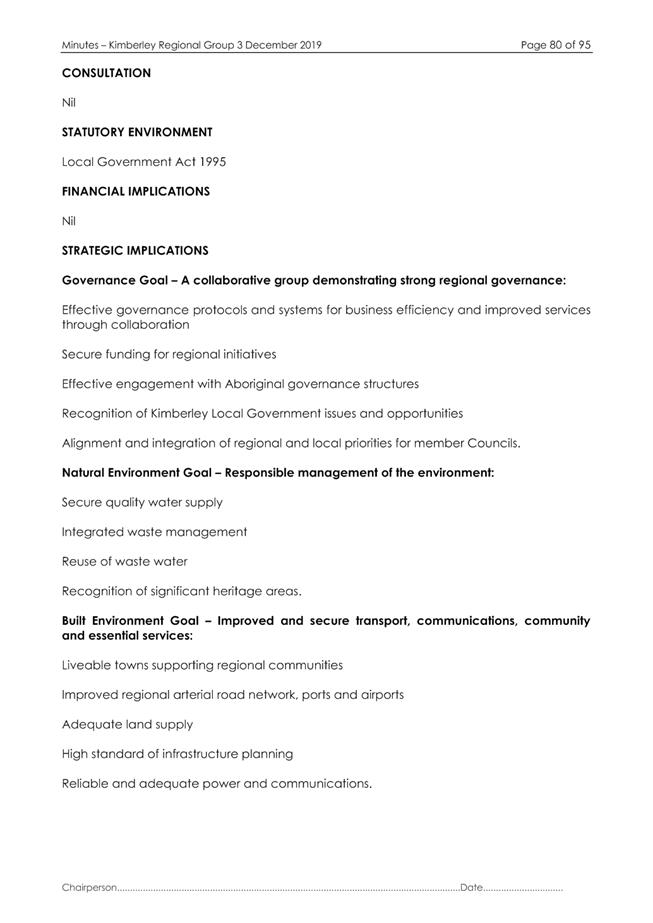
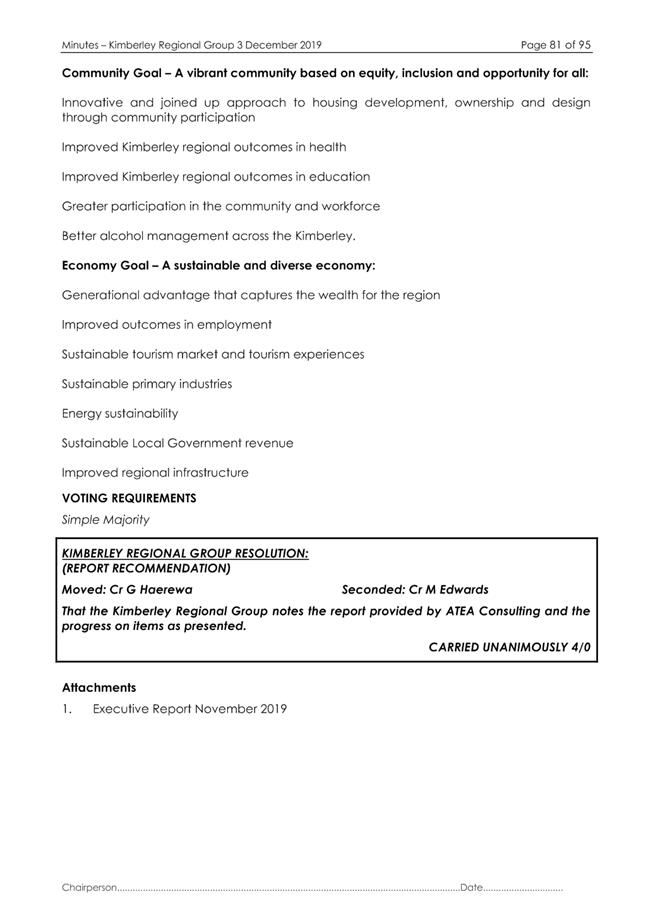
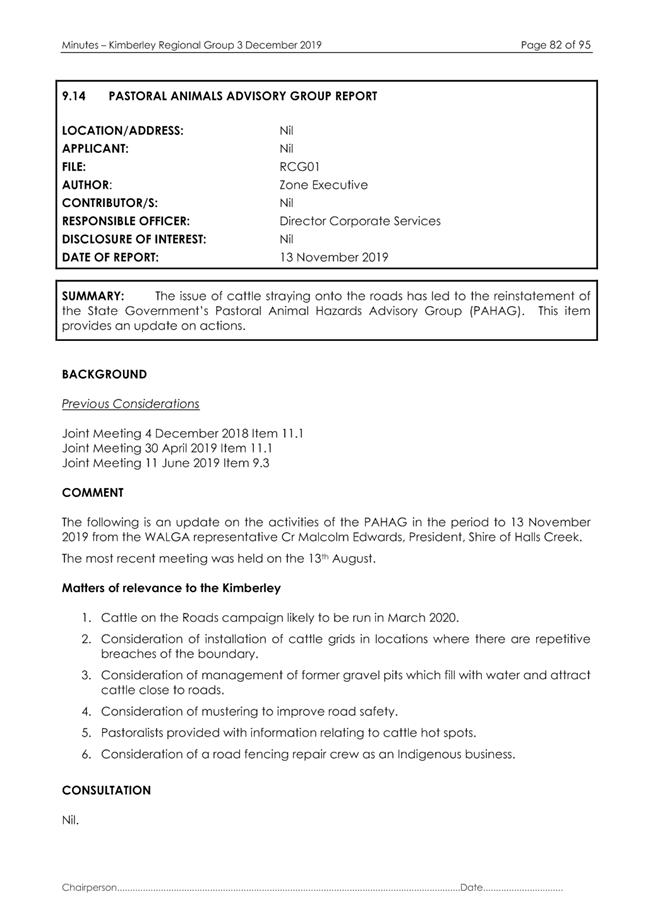
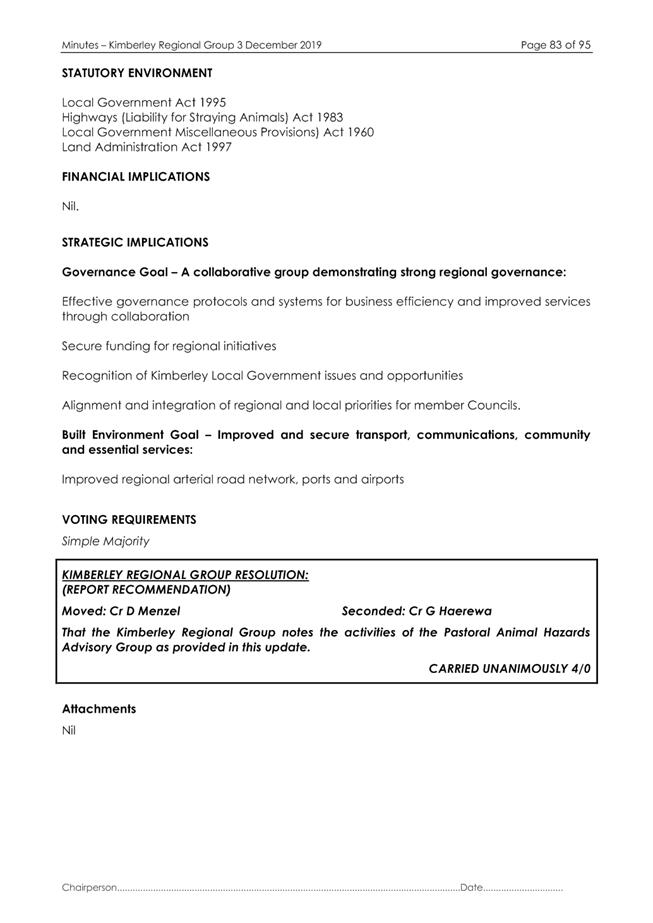
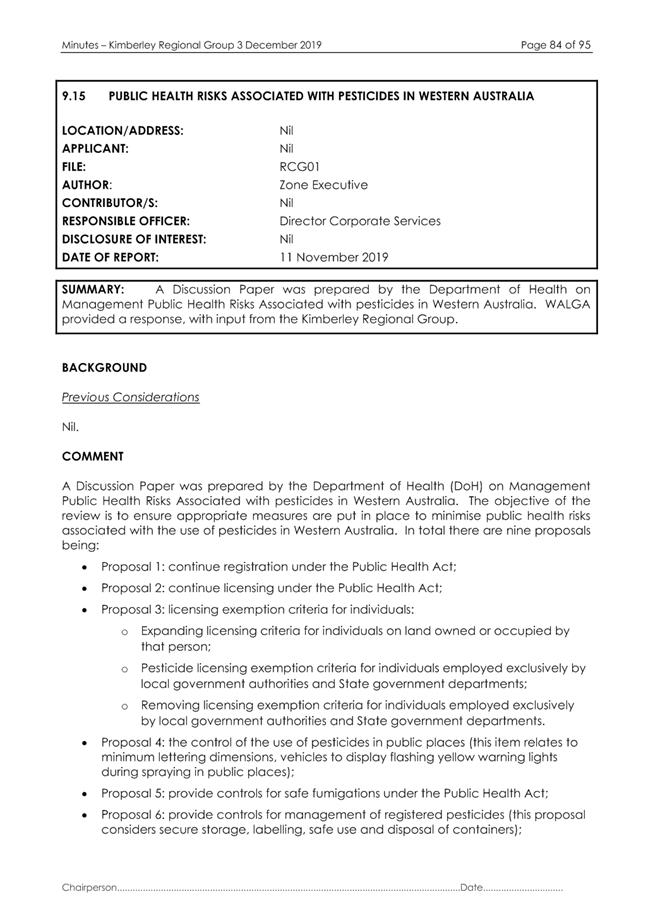
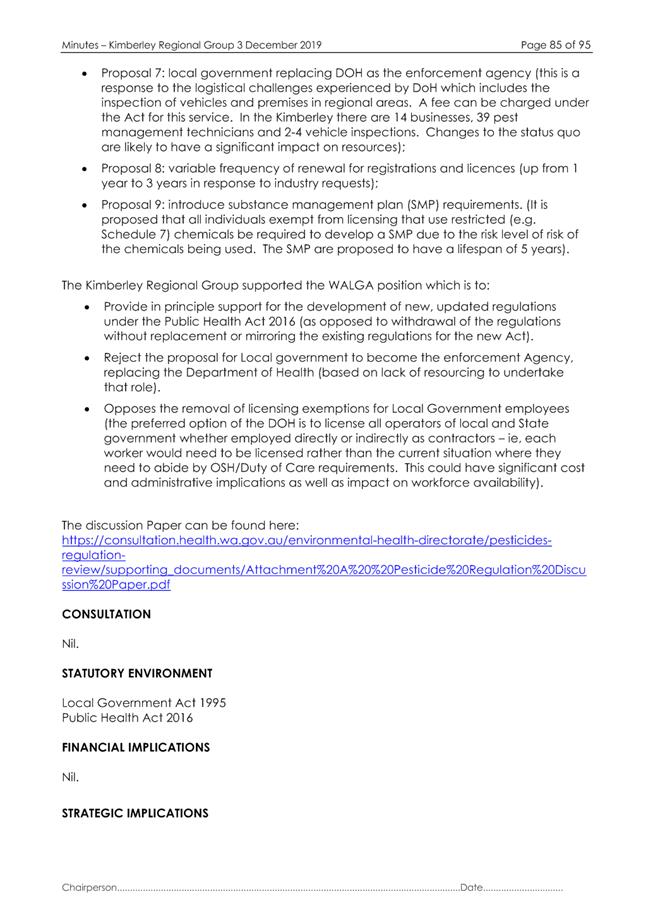
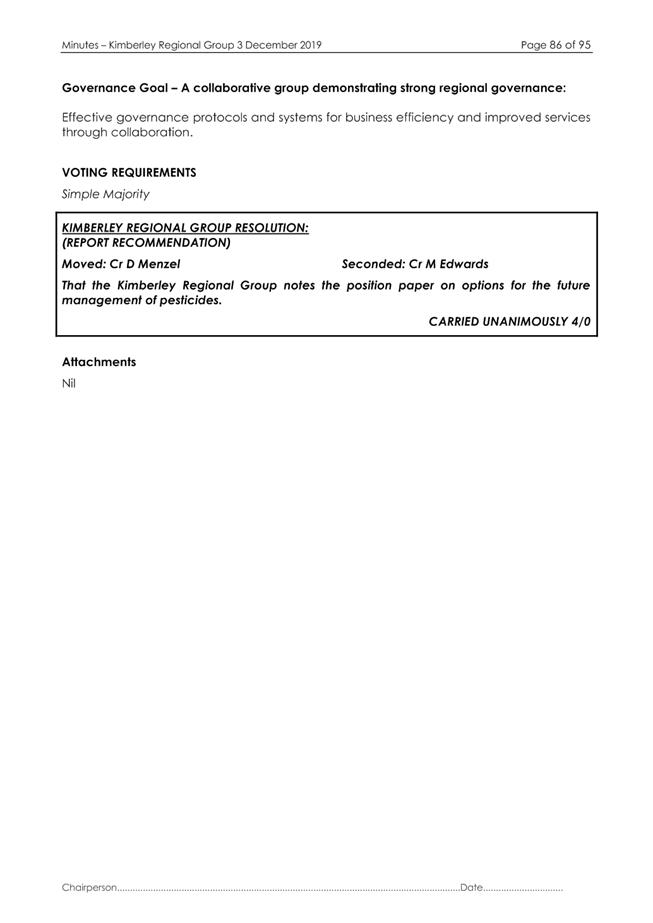
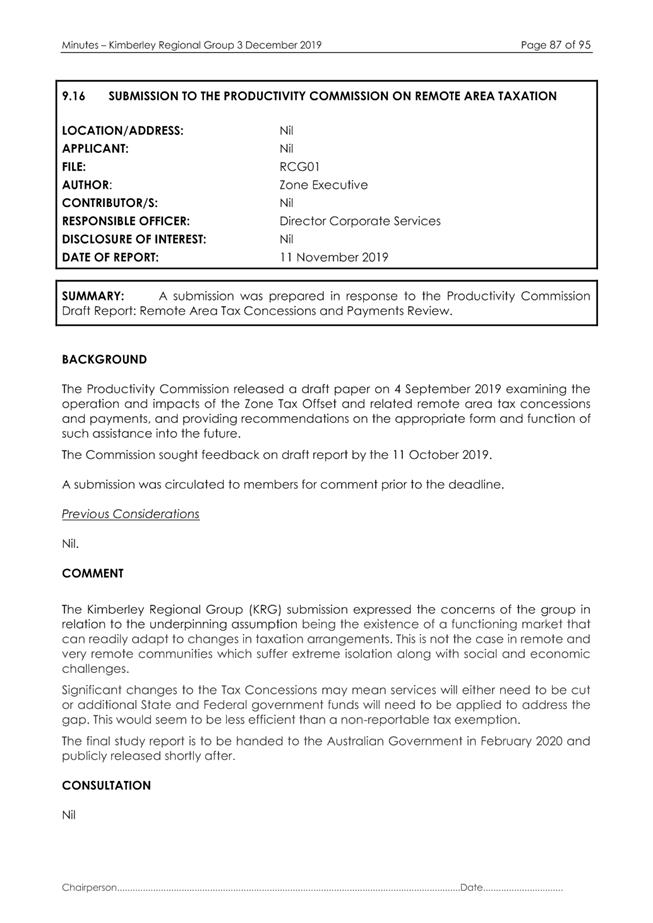
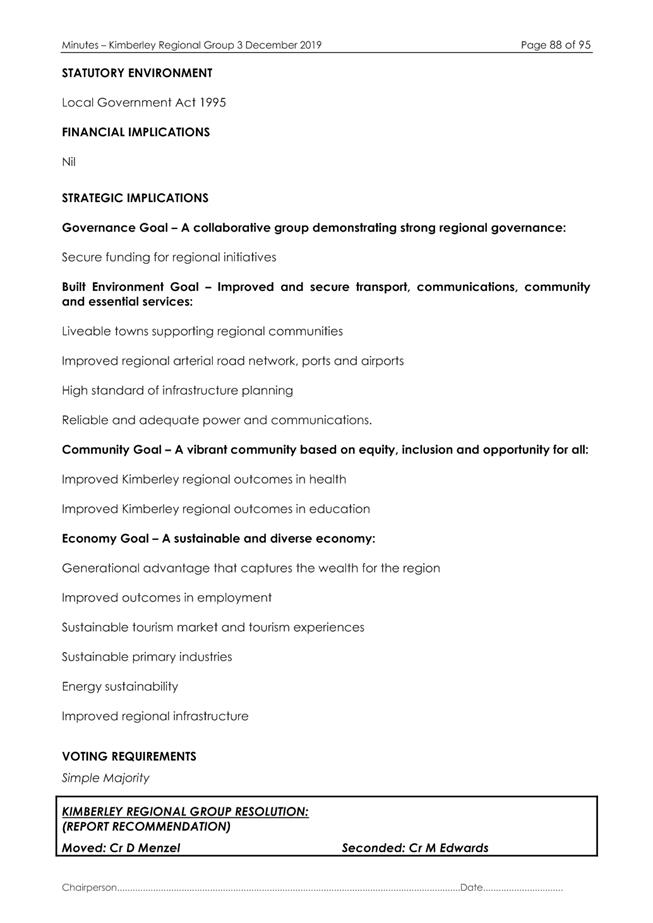
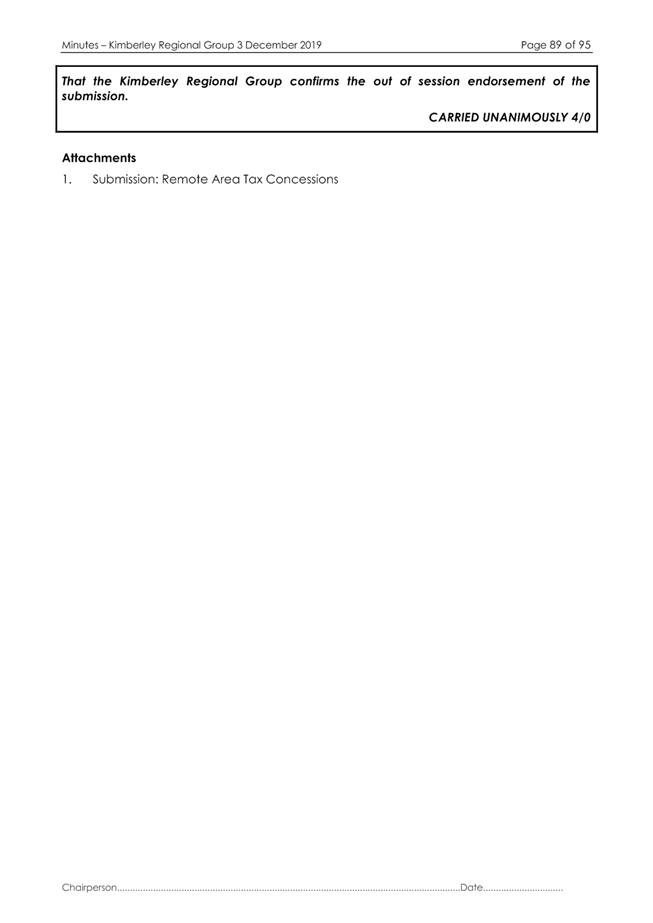
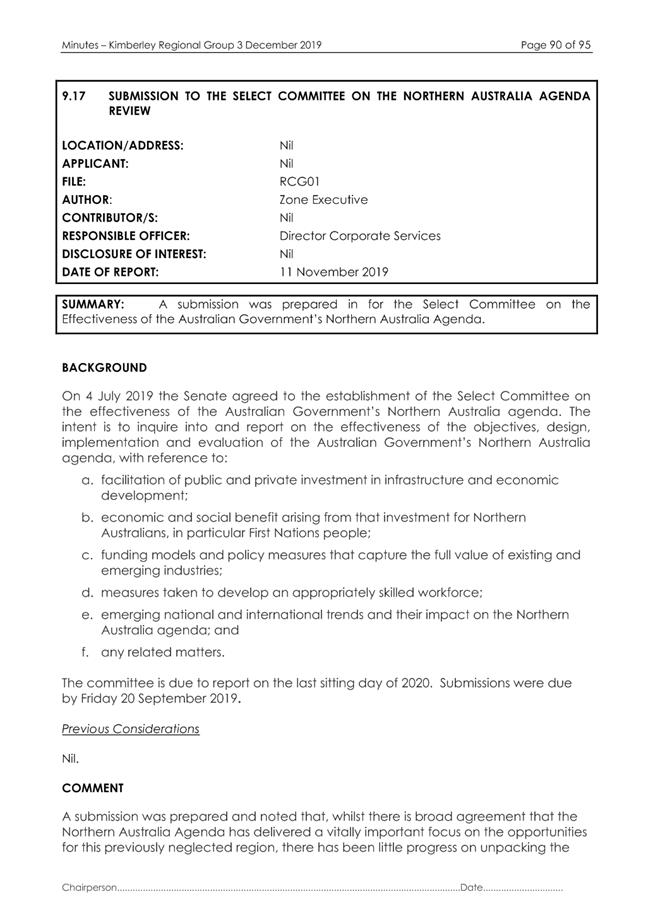
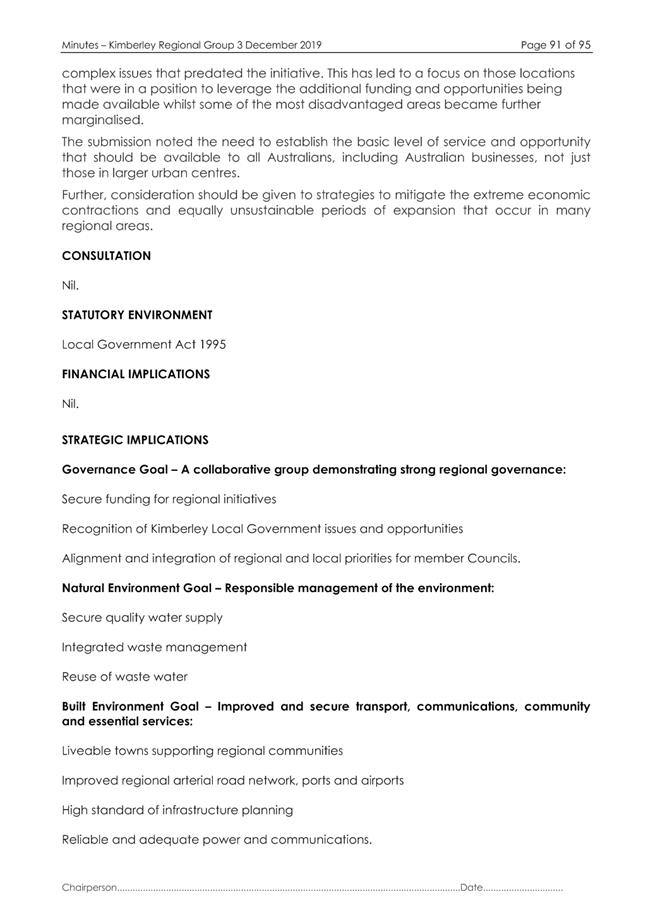
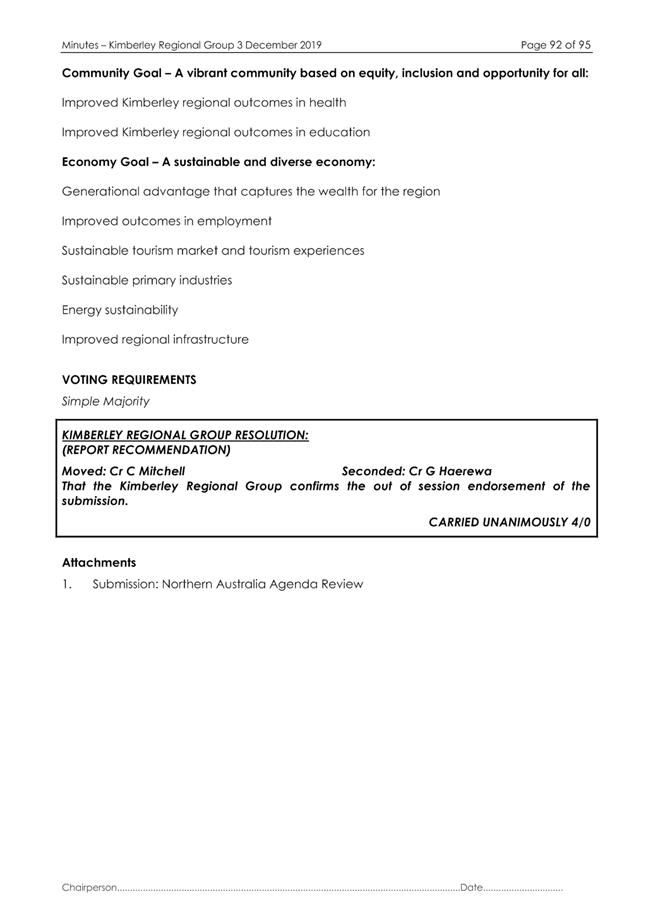
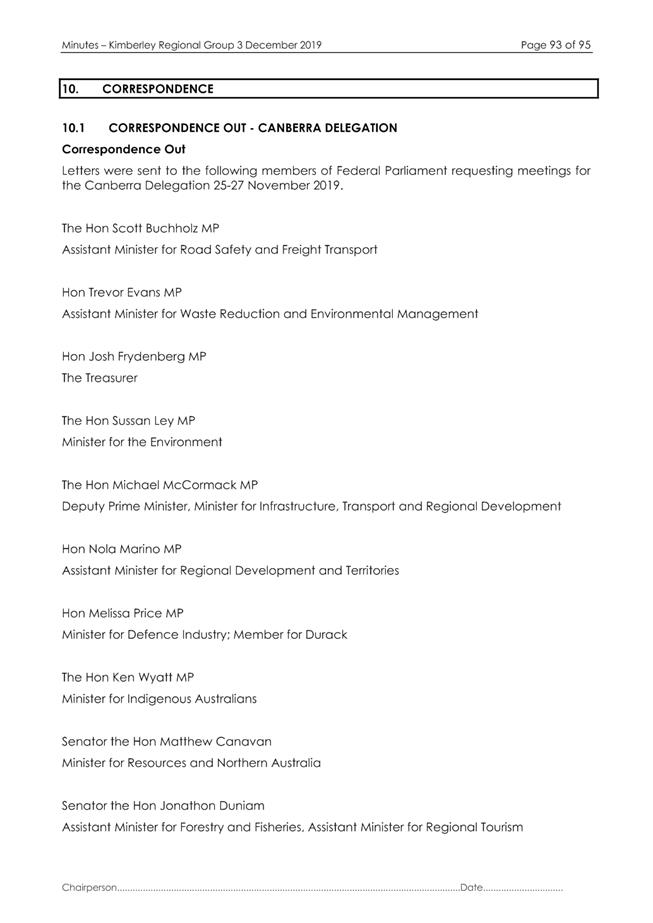
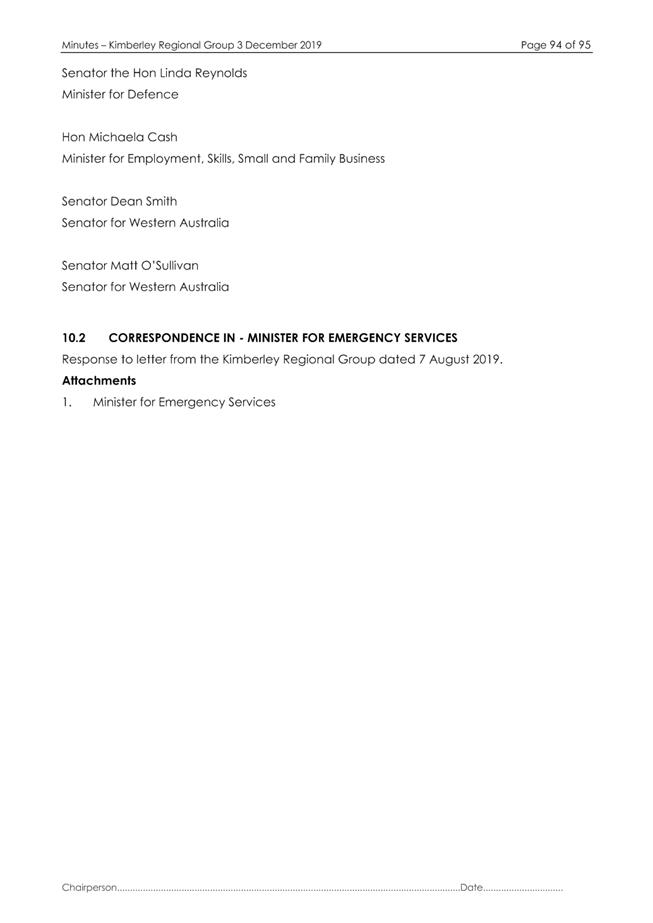
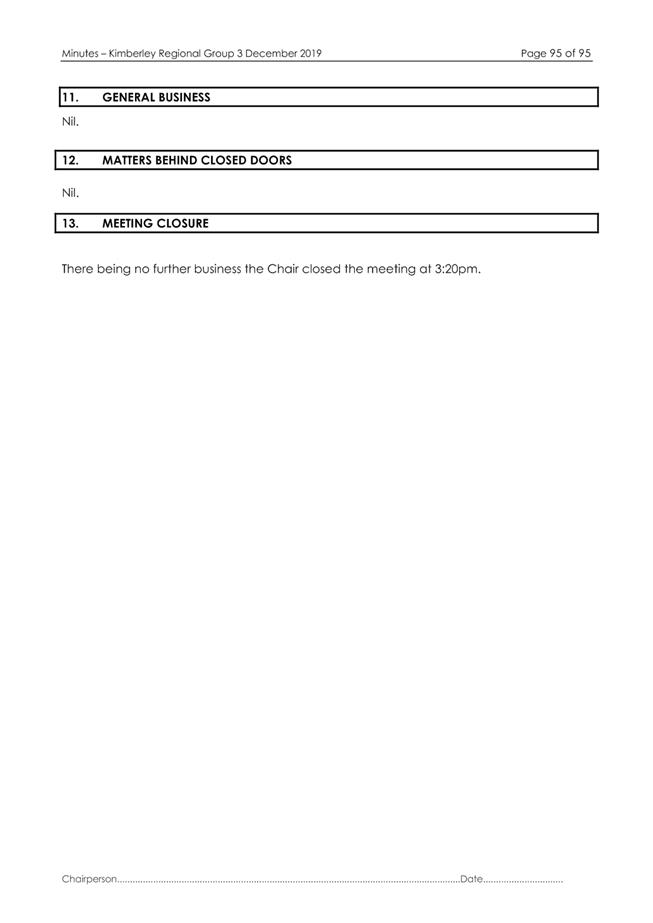
Nil.
Nil
Nil.
|
Moved: Cr C Mitchell Seconded: Cr P Matsumoto That the meeting be closed to the public at 5:49pm |
Members of the Public departed the Chambers at 5:49pm.
This item and any attachments are confidential in accordance with section 5.23(2) of the Local Government Act 1995 section 5.23(2)((e)(ii)) as it contains “a matter that if disclosed, would reveal information that has a commercial value to a person, where the information is held by, or is about, a person other than the local government”.
|
SUMMARY: The Shire of Broome has undertaken an open public tender process to appoint a suitable contractor for the Supply (hire or sale), Installation and Operation of a Takeaway Alcohol Management System at point of sale for takeaway packaged liquor outlets within the Broome & Derby Townships through Request for Tender (RFT) 19-13. This report provides an overview of the procurement process and seeks the Council’s adoption of the recommendation provided in the attached confidential Evaluation Report.
|
|
REPORT RECOMMENDATION: That Council: 1. Accepts the Tender submitted by Scantek Solutions as the most advantageous tender from which to form a contract for RFT 19/13 Supply (hire or sale), Installation and Operation of a Takeaway Alcohol Management System. 2. Authorises the Chief Executive Officer to sign the contract documentation following final tender negotiations, and the appropriate due diligence. 3. Approves a further allocation of up to a maximum of $50,400 ex GST towards the Takeaway Alcohol Management System, recognising this equates to a maximum total Council contribution of $95,854.55 ex GST for the 2019/20 Financial Year. 4. Approves a budget amendment of $50,400 ex GST to be allocated from Account 10023598 Transfer From Kimberley Zone Reserve – Cap Inc to Account 104052350 Kimberley Zone – Alcohol Management Expenses. 5. Requests the Chief Executive Officer formally request a contribution of $12,500 ex GST from the Shire of Derby-West Kimberley towards this initiative, which is proportionate with the number of units per Council to assist in addressing the shortfall of funding. (Absolute Majority Required) |
|
Moved: Cr H Tracey Seconded: Cr F West That Council: 1. Accepts the Tender submitted by Scantek Solutions as the most advantageous tender from which to form a contract for RFT 19/13 Supply (hire or sale), Installation and Operation of a Takeaway Alcohol Management System. 2. Authorises the Chief Executive Officer to sign the contract documentation following final tender negotiations, and the appropriate due diligence. 3. Approves a further allocation of up to a maximum of $50,400 ex GST towards the Takeaway Alcohol Management System, recognising this equates to a maximum total Council contribution of $95,854.55 ex GST for the 2019/20 Financial Year. 4. Approves a budget amendment of $50,400 ex GST to be allocated from Account 10023598 Transfer From Kimberley Zone Reserve – Cap Inc to Account 104052350 Kimberley Zone – Alcohol Management Expenses. 5. Requests the Chief Executive Officer formally request a contribution of $12,500 ex GST from the Shire of Derby-West Kimberley towards this initiative, which is proportionate with the number of units per Council to assist in addressing the shortfall of funding. 6. Requests the President and Chief Executive Officer to approach the State Government to seek funding for an independent audit of the trial. |
|
1. |
Attachment 1: Evaluation Report (Confidential to Councillors and Directors Only) This attachment is confidential in accordance with section 5.23(2) of the Local Government Act 1995 section 5.23(2)((e)(ii)) as it contains “a matter that if disclosed, would reveal information that has a commercial value to a person, where the information is held by, or is about, a person other than the local government”, and section 5.23(2)((e)(iii)) as it contains “a matter that if disclosed, would reveal information about the business, professional, commercial or financial affairs of a person, where the information is held by, or is about, a person other than the local government”. |
|
2. |
Attachment 2: Preferred Supplier Financial Due Diligence (Confidential to Councillors and Directors Only) This attachment is confidential in accordance with section 5.23(2) of the Local Government Act 1995 section 5.23(2)((e)(iii)) as it contains “a matter that if disclosed, would reveal information about the business, professional, commercial or financial affairs of a person, where the information is held by, or is about, a person other than the local government”. |
|
3. |
Attachment 3: Financial Due Diligence (Confidential to Councillors and Directors Only) This attachment is confidential in accordance with section 5.23(2) of the Local Government Act 1995 section 5.23(2)((e)(iii)) as it contains “a matter that if disclosed, would reveal information about the business, professional, commercial or financial affairs of a person, where the information is held by, or is about, a person other than the local government”. |
Minutes – Ordinary Meeting of Council 12 December 2019 Page 1 of 3
A typographical error was identified by Cr P Matsumoto in the body of this report. The report has been amended for the purposes of the minutes.
This item and any attachments are confidential in accordance with section 5.23(2) of the Local Government Act 1995 section 5.23(2)((e)(ii)) as it contains “a matter that if disclosed, would reveal information that has a commercial value to a person, where the information is held by, or is about, a person other than the local government”, and section 5.23(2)((e)(iii)) as it contains “a matter that if disclosed, would reveal information about the business, professional, commercial or financial affairs of a person, where the information is held by, or is about, a person other than the local government”.
|
SUMMARY: This report seeks Council consideration of a request from Cable Beach Polo Pty Ltd to provide funding support for the 2020 Cable Beach Polo Carnival during the week of 12-18 May 2020 and subsequent events in 2021 and 2022. |
|
(Report Recommendation) Moved: Cr D Male Seconded: Cr C Mitchell That Council: 1. Acknowledges the Cable Beach Polo Event as one of Broome’s major annual events as per the Shire’s Event Strategy; and 2. Supports Cable Beach Polo’s application to enter into a three-year agreement formalising funding to the value of $46,500 ex GST per year conditional on: (a) Funding to be made as cash payments during the 2019/20, 2020/21 and 2021/22 financial years; (b) Eligible items for expenditure to be associated with visiting teams/horses, event infrastructure and to cover Shire of Broome event application, bookings and waste services; and (c) Presentation of an acquittal report equivalent to the requirements of the Events, Economic and Tourism Development Funding Program Guidelines. |
|
1. |
Acquittal Report Part A (Confidential to Councillors and Directors Only) This attachment is confidential in accordance with section 5.23(2) of the Local Government Act 1995 section 5.23(2)((e)(ii)) as it contains “a matter that if disclosed, would reveal information that has a commercial value to a person, where the information is held by, or is about, a person other than the local government”, and section 5.23(2)((e)(iii)) as it contains “a matter that if disclosed, would reveal information about the business, professional, commercial or financial affairs of a person, where the information is held by, or is about, a person other than the local government”. |
|
2. |
Acquittal Report Part B (Confidential to Councillors and Directors Only) This attachment is confidential in accordance with section 5.23(2) of the Local Government Act 1995 section 5.23(2)((e)(ii)) as it contains “a matter that if disclosed, would reveal information that has a commercial value to a person, where the information is held by, or is about, a person other than the local government”, and section 5.23(2)((e)(iii)) as it contains “a matter that if disclosed, would reveal information about the business, professional, commercial or financial affairs of a person, where the information is held by, or is about, a person other than the local government”. |
|
3. |
Funding Request 2020 (Confidential to Councillors and Directors Only) This attachment is confidential in accordance with section 5.23(2) of the Local Government Act 1995 section 5.23(2)((e)(ii)) as it contains “a matter that if disclosed, would reveal information that has a commercial value to a person, where the information is held by, or is about, a person other than the local government”. |
|
4. |
Cable Beach Polo EEDTF Application 2018/19 (Confidential to Councillors and Directors Only) This attachment is confidential in accordance with section 5.23(2) of the Local Government Act 1995 section 5.23(2)((e)(ii)) as it contains “a matter that if disclosed, would reveal information that has a commercial value to a person, where the information is held by, or is about, a person other than the local government”, and section 5.23(2)((e)(iii)) as it contains “a matter that if disclosed, would reveal information about the business, professional, commercial or financial affairs of a person, where the information is held by, or is about, a person other than the local government”. |
|
5. |
Letters of Support (Tabled at OMC 12 December 2019) |
This item and any attachments are confidential in accordance with section 5.23(2) of the Local Government Act 1995 section 5.23(2)(c) as it contains “a contract entered into, or which may be entered into, by the local government and which relates to a matter to be discussed at the meeting”.
|
SUMMARY: The Shire of Broome has undertaken Request for Quote (RFQ) 19/68 for Supply and Delivery of One Wheel Loader CCF Class 4 and One Grader CCF Class 15. This report provides an overview of the procurement process and seeks Council’s adoption of the recommendation provided in the attached confidential Evaluation Report. |
|
(Report Recommendation) Moved: Cr C Mitchell Seconded: Cr P Matsumoto That Council: 1. Accepts the quotation submitted by CJD Equipment for the supply and delivery of a Volvo L60f Loader for $201,270.00 Ex GST being for the purchase price of $254,795.00 Ex GST less trade in of $75,000.00 Ex GST and an additional 4 in 1 bucket to suit for $21,475.00 as the most advantageous item to form a contract. 2. Accepts the quotation submitted by AFGRI for the supply and delivery of a John Deere 622G Grader for $319,700.01 Ex GST being for the purchase price of $419,700.01 Ex GST less trade in of $100,000.00 Ex GST as the most advantageous item to form a contract. 3. Authorises the Chief Executive Officer to award the Contract subject to the above conditions being met, or if required, to enter negotiations with the second preferred respondent for each item. |
|
1. |
RFQ19/68 Signed Evaluation Report |
Pursuant to section 5.60A of the Local Government Act 1995 Cr H Tracey declared a Financial Interest in Item 9.2.2 RF19/15 Town Beach Water Park, ‘A company of which I am a Director and major shareholder is tendering for this project’.
Cr H Tracey left the Chambers at 6:19pm.
Cr D Male assumed the Chair.
This item and any attachments are confidential in accordance with section 5.23(2) of the Local Government Act 1995 section 5.23(2)(c) as it contains “a contract entered into, or which may be entered into, by the local government and which relates to a matter to be discussed at the meeting”.
|
SUMMARY: The Shire of Broome has undertaken a restricted tender process to appoint a suitable contractor to undertake the proposed upgrades and new installations at the Town Beach Water Park under Request for Tender RFT19/15. This report provides an overview of the procurement process and seeks the Council’s adoption of the recommendation provided in the attached confidential Evaluation Report. |
|
Moved: Cr C Mitchell Seconded: Cr N Wevers That Standing Orders be suspended at 6:22pm CARRIED UNANIMOUSLY 7/0 |
|
Moved: Cr N Wevers Seconded: Cr C Mitchell That Standing Orders be reinstated at 6:24pm CARRIED UNANIMOUSLY 7/0 |
|
(Report Recommendation) Moved: Cr C Mitchell Seconded: Cr P Matsumoto That Council: 1. Accepts the Tender submitted by H & M Tracey Constructions Pty Ltd as the most advantageous tenderer from which to form a contract for RFT 19/15 Town Beach Water Park to a maximum value of $950,000 excluding GST after final contract negotiations. 2. Authorises the Chief Executive Officer to sign the contract documentation and negotiate contract variations during the works if necessary. 3. Approve a budget amendment of $132,082 from Account 100009890 Public Reserve Open Space to Account 111814050 for the delivery the Town Beach Water Park. 4. If a contract can not be executed authorises tender negotiations to commence with the second preferred tendered and the Chief Executive Officer to sign the contract documentation within the budget conditions.
|
|
1. |
Evaluation Report RFT19-15 (Confidential to Councillors and Directors Only) This attachment is confidential in accordance with section 5.23(2) of the Local Government Act 1995 section 5.23(2)((e)(iii)) as it contains “a matter that if disclosed, would reveal information about the business, professional, commercial or financial affairs of a person, where the information is held by, or is about, a person other than the local government”. |
|
|
|
Minutes – Ordinary Meeting of Council 12 December 2019 Page 1 of 3
This item and any attachments are confidential in accordance with section 5.23(2) of the Local Government Act 1995 section 5.23(2)((e)(iii)) as it contains “a matter that if disclosed, would reveal information about the business, professional, commercial or financial affairs of a person, where the information is held by, or is about, a person other than the local government”.
Pursuant to section 5.60A of the Local Government Act 1995 Cr H Tracey declared a Financial Interest in Item 9.2.4 RFQ19-95 Chinatown Revitalisation Project Stage 2, ‘Proponent is a tenant of a property owned by a company of which I am a Director’. Cr H Tracey remained outside the Council Chambers for the duration of the item.
The presiding Chairman advised that additional correspondence was received by an external party and circulated to Councillors prior to the meeting. The additional information was tabled at the meeting and included as an attachment in the confidential minutes of the meeting.
* Additional underlined information confirmed by Council at OMC 27 February 2020.
|
SUMMARY: This report considers quotations received for Request for Quote (RFQ) 19/95 and seeks Council’s adoption of the recommendation contained within the attached confidential Evaluation Report.
|
|
(Report Recommendation) Moved: Cr C Mitchell Seconded: Cr B Rudeforth That Council: 1. Accepts the Quotation submitted by ACOR Consultants Pty Ltd as the most advantageous Respondent from which to form a contract for RFQ 19/95 Chinatown Revitalisation Project Stage Two to the maximum value of $689.838.49 excluding GST after final contract negotiations. 2. Authorises the Chief Executive Officer to sign the contract documentation and negotiate contract variations during the works if necessary. 3. Should a Contract not be formed with the preferred Respondent, then the Chief Executive Officer may proceed to form a Contract with the next advantageous Respondent. |
|
1. |
RFQ19-95 Evaluation Report (Confidential to Councillors and Directors Only) This attachment is confidential in accordance with section 5.23(2) of the Local Government Act 1995 section 5.23(2)((e)(iii)) as it contains “a matter that if disclosed, would reveal information about the business, professional, commercial or financial affairs of a person, where the information is held by, or is about, a person other than the local government”. |
|
2. |
Draft FAA Broome Chinatown Revitalisation Stage Two |
|
Moved: Cr C Mitchell Seconded: Cr B Rudeforth That the Meeting again be open to the public at 6:34pm |
The Council chambers were opened and it was noted that members of the public returned to the Chambers.
Cr D Male read aloud the motions passed for the benefit of the public and Shire President.
Cr H Tracey resumed the Chair at 6:40pm
There being no further business the Chairman declared the meeting closed at 6:40 PM.
|
These minutes were confirmed at a meeting held 27 February 2020, and signed below by the presiding Chair at the meeting in which these minutes were confirmed.
Signed: |